#but as a demonstration of how they’ve been led by children all along
Explore tagged Tumblr posts
Note
what do u think of rhaegon's parallels in f&b and hotd?
not going to lie struggled on answering this one, in f&b (and hotd) they’re the two main claimants and faces of the opposing teams we all know and love, but that’s just it: they’re just faces, figureheads and puppets in the decades long political power plays of those older and supposedly wiser than them (like otto, daemon, corlys, etc). fire and blood, while munkun nicknames the civil war as the dance of dragons, is about the dying of dragons and both of aegon and rhaenyra reflect the ongoing death of targaryen hegemony.
as individuals they are meant to challenge the validity of targaryen exceptionalism. aegon is the king’s first born son, all “symbols of legitimacy belong to him” but the symbols themselves were never a legitimate justification for the targaryen grasp on power which is shown in aegon’s unsuitability from his hedonistic behavior to violent rashness. the same goes for rhaenyra, neither of them are experienced in ruling, but expected it and everyone else to bend to their rule because they’re targaryen. it’s like they’re eternal children blindly following the path others set for them. one of the most ludicrous things they both do is aegon goes “what sort of brother steals his sister’s birthright” and then post-rhaenyra coronation demands her head. rhaenyra goes “my half-brothers and sister are innocent. let them bend the knee and they’re forgiven” and then abandons that at the quickest opportunity.
i think because they are raised to be in a false position of power where they are the queen/king but are not meant to make any of the decisions, it creates this extreme fear in both of them that they are just as easily replaced. which makes their defensive behavior toward each other, as well as the quick turn to offensive action more understandable.
#that’s what makes aegon iii a child at the end all the more compelling#not only as a commentary on war trauma and victims and what was it all for?#but as a demonstration of how they’ve been led by children all along#idk if that makes sense#guava.ask#rhaenyra targaryen#aegon ii#house targaryen
38 notes
·
View notes
Note
Im like. Seething in rage about that episode lol. Like five episodes ago we have jamie detailing a story of james sanctioning him being sexual assaulted (because that’s what it was!!!!!!!!!!! james could literally be convicted of sexual abuse) and now we have the show saying “well actually jamie should forgive his dad and he should explicitly reach out to him and invite him back into his life” like????? I believe in forgiveness but there are limits. And those limits are important.
yeah literally, everything about jamie’s dad in that episode was nothing short of infuriating and extremely painful to watch. like yeah, the violent asshole who arranged for his fourteen year old to be assaulted is exactly who we should be pushing the Forgive Them <3 For YOU <3 shit with, i guess. as if it’s a universal truth that forgiving someone who profoundly harmed you is healthy for every single person ever. especially still actively in the midst of a pretty serious trauma-induced mental health episode.
like that’s what gets me about this - or a couple of things that do ig. we get an (absolutely infuriating) ‘feel good’ shot of james in rehab smiling and proud or whatever watching the match but he has not said fuck-all to jamie. he has not made any kind of effort to apologize or take accountability for everything he did. what they showed jamie doing, reaching out like that? that’s extremely dangerous for him to be doing with no information about how it’s gonna go especially given the last time they interacted went the way it did. i KNOW that because ive BEEN THERE and it’s shit like this being the only narrative society at large will endorse that led me to being there and it fucked me up worse than id already been by an order of magnitude.
forgiveness is for YOU <3 is not a one size fits all maxim. sometimes it hurts people to do that. especially when they’re doing it because they’ve been told that’s the only way to be healthy or free or whatever. sometimes forgiving someone is dangerous and toxic and harmful. and there’s nothing showing THAT story. it’s all this one. it’s all ‘everyone’s needs are exactly the same and they’re ‘forgive your abuser, no it doesn’t matter if they’ve done anything to demonstrate they understand or regret what they did, after all it’s for YOU! no i will not be asking if that’s what you need or doing any work to verify that, just blanket prescribing it and this will be portrayed as the correct and good thing to do.’
it’s not that i think it’s inherently wrong to show someone wanting a relationship with an abusive parent as an adult. i still talk to two of mine, not that i have much of a choice, and i get that it’s very complicated and everyone has the right to make those choices for themselves. but once again i'm at the place of like, characters are not human people making complex decisions for their own reasons, they are narrative figures that are being written by writers making choices, and writers do not ever make a different choice with that narrative and it is blatantly transparent to me that this is largely because society at large does not give one fuck about abuse victims and is stuck in the perspective of the parent and going ‘what makes a good, happy ending here? oh i know! if this person gets their kid back and improves their life <3’ no thought at all as to what a happy ending for the abused adult child might be, or if that’s even a safe situation, which it often is not.
just. disappointing and hurtful and awful but not at all surprising. i keep seeing people expressing surprise that the show would extend its radical forgiveness and second chance approach to james sr of all people and without a fucking minute of work for it because apparently we lost sight of ‘accountability’ somewhere along that road, but i wasn’t surprised at all. because every show does this. every single one, every single time. abused children do not GET the luxury of walking away from their abusers, or saying fuck it, no forgiveness, that’s NOT what i need actually. and characters choosing to reconcile or forgive wouldn’t be nearly as troubling and upsetting to me as a survivor who got pressured by people in my life and by society at large to trying to do that and suffering a lot more for it if there was literally any depiction of other choices existing and being healthy and permitted.
combining the stuff with james in the same episode with the stuff with beard and nate and with ted and his mom was irresponsible, messy storytelling at best. these things are not the same and they are not comparable. people are complicated, and so are parents, and we deserve grace and understanding but abuse changes that equation significantly and that is a hill im going to die on every time.
#gav gab#gav answers#sorry this is so long lmao I have thoughts. on this.#this was an irresponsible and harmful and deeply hurtful and upsetting choice for that narrative#and it hurt me a lot to watch#especially because it was just. tossed in there with no thought or gravity#just oh yeah obviously!#man. there were some really great parts of that episode but fuck that shit so much#they did jamie dirty in that ep. again.#this show does not do abuse justice at this point#ted lasso spoilers#abuse cw#long post#rape mention#csa mention
33 notes
·
View notes
Text
Two Halves - Chapter One (Zuko x Reader)

Word Count: 3,700
Author’s Note: I decided to set this a few years after the war, when Zuko is Firelord. I didn’t want to stray too far from what was canon in the series - what with Katara being the only bender left in the Southern Tribe and also trying not to add extra family members because that always feels weird to me - so the reader in this story is a girl from the village who lost her parents to a raid and was essentially adopted into Sokka and Katara’s family; she stayed behind to watch after the tribe when they left to help Aang, and now, as the chief’s surrogate daughter, is arranged to marry the Firelord to help bring the two nations together. Chaos and sweet, tender romance ensues. This is also going to be a mini series! I have no real plot and no idea how long it’s going to be, but that just adds to the fun of it all. Stay tuned.
~ Muerta

“You can’t be serious.”
Sokka, seated beside you, instinctively offers you his hand, which you willingly, eagerly take, gripping it tightly in your lap. You can’t decide if you feel anger or fear; the two mix sourly in your stomach.
“I am,” Chief Hakoda says. His tone is even, and infuriatingly understanding. It makes you want to scream. “Your presence in the Fire Nation will be key to unite the nations in peace once again. They’ve been closed off from the rest of the world for too long - you’ll be an ambassador for our people.”
“Then make me an ambassador,” you snap. “Marrying me off to the Firelord is no better than letting him come here and colonize us.”
Hakoda glowers sternly at you. You shrink back, Sokka giving your hand an assuring squeeze.
“Firelord Zuko has made great strides to restore what his ancestors destroyed in the years since the war,” Hakoda scolds. “He’s an honorable, respectable man. I expect you to treat him as such.”
You look back up at him, letting out a heavy, defeated sigh.
“I don’t have a choice in this, do I?” you ask softly. Your voice quivers, revealing the terror behind your rage.
Hakoda’s expression softens as he stands. He helps you onto your feet, holding you gently at the elbows and looking apologetically into your eyes, one of his hands reaching to brush your hair behind your ear.
“Just because the war is over, it doesn’t mean the need for sacrifice is,” he tenderly says. “You’ll do great things as the queen of the Fire Nation. I wouldn’t be doing this if I didn’t trust Zuko to treat you well.”
In Hakoda’s eyes, you see the man you knew as a child, the man who brought you into his family when you lost your own to a Fire Nation raid. You love him as much as you loved your own father, and know he loves you as much as his flesh and blood children; you trust that he would never put you in harm’s way.
Hakoda leans forward and kisses your forehead, holding you close for a long moment before letting go, breaking contact with you completely. The pain on his face tears a gaping hole in your heart.
“You leave in three days,” he tells you. “You’ll be in good hands - I promise.”

Though you know it isn’t for the last time, leaving the Southern Water Tribe hurts so much you think it might kill you.
You cruise across a calm ocean in a Fire Navy ship; luckily Sokka was allowed to come with you as emotional support, as well as to represent the tribe at your wedding. The presence of Zuko’s uncle is also calming to you, despite how little you know him, and how not long ago you would have considered him an enemy. There’s just something about Iroh that makes you feel safe, and you only hope the same holds true when you meet your husband to be.
“Zuko sent me to ensure your safe passage,” Iroh told you when you first boarded the ship. “Think of me as your guardian spirit.”
You stand on the deck, basking in the newly warm weather and taking deep breaths of fresh ocean breeze. The peace of the moment helps you lose yourself, forgetting your fate entirely, if only for a moment.
“How ya feeling?”
Sokka sidles up next to you, placing an assuring hand on your shoulder. You reach up and curl your fingers around his, sighing.
“Awful, now that you’re here,” you tease.
Sokka chuckles.
“I could still make good on that promise I made when we were kids,” he offers, wrapping an arm around your waist and pulling you into the side of his sturdy, familiar body. “I don’t think Suki or Dad would be really happy about it, though.”
You let out a huff of laughter, remembering all the times you used to play together before the war brought you closer; you used to have intense crushes on each other, and Sokka always promised that he would marry you when you both got older - plans that changed when you effectively became siblings. You lean your head into his shoulder, finding comfort in his presence.
“I’m just scared,” you tell him. “I always planned for great adventure in my life, and to help people, but… this doesn’t seem like the right way. It feels like I’m being taken prisoner.”
“They say that having too many plans for one’s life keeps one from finding their true potential.”
You turn, meeting Iroh’s gaze as he crosses the deck to where you stand. You part with Sokka and bow respectfully, trying to hide the embarrassment that heats your skin.
“I apologize, General Iroh,” you greet him. “I didn’t mean any offense.”
Iroh tuts at you, placing a hand on your shoulder to gently straighten you up. He meets you with a kind gaze and a soft smile.
“Fear is to be expected, my dear,” he says. “You can’t have a great adventure without also facing a great fear.”
He turns and peers out across the water, inhaling and releasing a deep, contented sigh.
“The weather is lovely today,” he notes. “Why don’t we all enjoy it together, with a pot of tea?”
And so a tea set is brought, along with a table and cushions, and you and Sokka join Iroh as he demonstrates how to brew the perfect pot of jasmine green, generously serving each cup. He toasts to your being together, and you drink heartily, savoring the exquisite taste of his famous tea.
“I understand how you must feel,” Iroh addresses you once you’ve all settled. “Coming to a strange country, among people responsible for so much of the pain you’ve experienced; you’re exceptionally brave for doing what is best for your people.”
Iroh takes your hand, cradling it between both of his.
“I am sorry for how my nation - my family - has hurt you,” he says. “My nephew and I only want happiness for you with us, and we will do all we can to ensure it; I give you this vow among his.”
He squeezes your hand tightly, and you grip back, accepting his promise. You bow again, lowering yourself so that your face is almost level with the deck of the ship.
“Thank you, General Iroh,” you reply. “Your generosity means everything to me.”
When you sit up, Sokka places a hand at your back, giving you a comforting smile.
“Zuko’s a good guy,” he assures you. “I really think you’ll learn to like him.”

Your arrival in the Fire Nation, much to your surprise, is met with celebration. As your ship pulls into port, army and navy officers in full ceremonial regalia perform displays of their bending, a traditional band playing cheerful, joyous music to welcome you to shore. A procession of military vehicles escorts you through the streets of the capital to the palace, citizens emerging from their homes and businesses to catch a glimpse as your carriage rolls by. The people who manage to see you are elated, if not curious, staring at you with wide eyes and rapt attention; Iroh explains that many of them have never seen a foreigner, as travel to the nation is only just starting to become somewhat commonplace. You’re confronted by the beauty and grandeur of the city - the tall, elegant buildings with their ornate details are far from anything you’ve ever seen in person, even with the rapid development of the Southern Tribe.
In the palace, you’re immediately whisked away to your own wing, your quarters designated to a set of quaint buildings circling a scenic courtyard. Tradition dictates that, from the time of your engagement, you aren’t allowed to see the man you’re meant to marry until you’re both at the alter; the first few days of your time in the Fire Nation are spent in seclusion, resting off the fatigue of travel and acquainting yourself with the new culture you must now call your own. Though you have to keep your distance, you’re relieved when, on your first morning in the palace, you find a letter on your doorstep, scrawled in a refined, graceful hand and addressed from the Firelord himself.
Hello, it says, Zuko here.
I wish I could introduce myself in person, but unfortunately, this will have to do for now. Sokka has told me much about you in the years we’ve known each other, and he always speaks of you highly. My uncle is also already enamored with you, and tells me he already considers you family, so I hope this brings as much comfort to you as it does to me. I don’t think I could have chosen a better woman to rule at my side.
I have to admit that I’m nervous about getting married. I still feel like I’m too young, and still just figuring things out. But I guess if I can lead a country and make peace after a hundred years of war, I can have a wife and make her happy. I hope I do make you happy - I hope we can be close friends and lead the nation strongly together, for the better of both our homes.
Please write to me if you need anything. Sincerely yours, Firelord Zuko.
The candidity and awkwardness of his writing makes you smile, your mind at ease being able to put a voice to his name. You decide to write him back immediately.
Hello, Zuko, you write.
Your letter has already made me feel much better. Your uncle is a very sweet, very wise man, and I’m thankful that you sent him to watch over me - he makes me feel like I already have a little piece of a home and a family here. Meeting the man who raised you, I have faith that you’ll be a good husband to me.
I’m very scared because, unlike you, I’ve never led a country or had to negotiate peace - getting married is the biggest responsibility I’ve ever had. I want to help people, though, and if I can help people by leading them out of the darkness of war, I’m very happy to do it. It isn’t as terrifying knowing you’re also nervous; I’m glad we can be nervous together.
Please write to me as much as possible until the wedding. It would be nice to get to know my husband before I marry him. Sincerely yours, the bride.”
For the following days, you and Zuko exchange multiple letters; you have one waiting for you every morning, receive a reply by midday, and end each night wishing him pleasant dreams. You learn that he’s very intelligent and, though quite subdued, has a sense of humor much like your own. He has a passion for weaponry and the art of combat, as well as for storytelling and music (he tells you that dancing has recently been unbanned in the Fire Nation, and wonders if you’ll be able to teach him any Water Tribe dances; you promise to help as much as you can). The more you write to him, the less daunting the idea of your marriage seems, and you find yourself feeling excited by the idea of finally meeting him.

The day of your wedding starts early. You’re woken at dawn, fed a breakfast of tea and jook (both prepared by Iroh, and sent on a tray beside a polished wooden box - inside is a traditional hair comb and a note from the old man, explaining that the comb was given to his mother by his father on their wedding day; the gesture sends you to tears), then sent to the palace baths to be buffed and primed for your wedding attire.
You’re stripped down and steeped in multiple perfumed liquids, scrubbed with an array of soaps and exfoliants, and washed so thoroughly you think your handlers might have exposed an entirely new layer of skin. They wax every single hair from your body as well; you only attempt to draw the line when they reach your nether area.
“Please don’t,” you request, firm but not commanding. “I don’t think I’ll need it.”
The beautician scoffs at you, pushing you back onto the waxing table and forcefully spreading your legs apart.
“Foolish girl,” she huffs. “Of course you will. Royal marriages must always be consummated on the wedding night - the Firelord will want as many heirs as you can give him, as soon as possible.”
Her brute words make you sick to your stomach, and as she rips away the hair between your thighs, tears roll down your cheeks from both pain and horror. You want to believe the man who’s been writing to you for the past five days would never force himself onto you in the name of tradition, but it dawns on you once again that you don’t truly know him, and can’t anticipate his actions.
Once you’ve been wrung out from your time at the bath house, you’re sent back to your sleeping chambers, where you’re pleased to find not only lunch waiting for you, but visitors as well.
“Katara!” you cry, flying across the room and into her arms. She laughs, hugging you so tightly you can hardly breathe.
“Oh, I’ve missed you!” Katara cries, whirling you around a few times before setting you back onto your feet. “You already look so beautiful! How do you feel?”
“I’m terrified,” you tell her, “but so much happier now that you’re here.”
“Don’t forget me!”
Aang waves from behind Katara and you shout with glee, greeting him in the same manner you did her. He also crushes himself against you, and when you pull away, you cup his face between your hands.
“You look older!” you exclaim, squeezing his cheeks. “You grow every time I see you!”
Aang laughs, pushing your hands away with a pink blush creeping over his nose and ears.
“I’m a grown man, and the avatar,” he says, teasingly poking your shoulder. “You can’t keep treating me like I’m still twelve.”
“I can and I will,” you jest, lightly punching him in the stomach. He cackles and puts you in a (gentle) headlock, rubbing his knuckles into your skull to tangle your freshly washed hair.
“Hey, kids, that’s enough,” Sokka scolds playfully as he enters the room. “Let’s eat, otherwise I’ll be way too tempted by the spread at the reception tonight.”
Lunch with your siblings is the last moment of relative calm you have before the wedding and its reality truly start to set in. After the meal, Sokka and Aang leave to help Zuko with his own preparations, Katara staying to help you with yours. Your handlers navigate you into your dress, a traditional gown and robes made of many layers of fine silk and embroidered with dragons and native Fire Nation flowers; the train and sleeves fall so far behind you, you worry about tripping or scuffing the fabric. Once you’re dressed, your face is painted white, your features then outlined as if they were being drawn anew into your skin. You hardly recognize yourself once the handlers are finished with you, the anxiety you felt upon learning of your engagement returning with newfound ferocity.
Katara is the one to style your hair. Keeping with custom, she knots a portion of it atop your head in a tight bun, using the comb Iroh gave you to hold it in place. She then takes the remainder of your hair and braids it into two sections on each side of your face, the way it would be worn in the Water Tribe; she laces each braid with a string of beads from home, crystalline blue totems to ensure happiness and long life hanging at the end of each, contrasting beautifully with your gown. She cries when she steps back to look at you, carefully dabbing at her tears so as not to ruin her own makeup and dress.
“You’re so gorgeous,” she tells you. “I’m so glad Sokka never married you like he said he would, he would look awful at the alter next to you.”
You laugh, opening your arms and hugging her tightly, forcing your own tears back for the sake of the effort that’s been put into your costume.
For the last few minutes before the wedding, you’re alone; you stand outside the doors of the palace’s grand courtyard, flanked on both sides by guards, listening nervously as Iroh (who’s officiating, per his nephew’s request) praises you and recites a poem in your honor. His sentiments are exceedingly affectionate and should move you, but all you can think of is Zuko; what will he think of you? Will he like you as much in person as he did in writing? Was he just pretending to like you for the sake of your union? What if he didn’t think you were pretty? What if, like the beautician said, he forced you to sleep with him tonight, simply because it’s what’s meant to be done? You chew at your nails, biting them so hard that some of them start to bleed.
Music swells from inside the courtyard, and suddenly the doors before you swing open. You hold your head as high as you can, stepping forward with as much grace as you can manage and beginning to traverse the impossibly long aisle to the wedding altar. You breathe deeply, scanning the group of people standing before it - you see Katara first, and she nods encouragingly, looking like she’s about to cry all over again. Your eyes sweep over to Sokka, standing beside her, and he seems somewhat shocked by your appearance - not that you blame him, seeing as you look like a complete stranger, even to yourself. Iroh gazes at you from the center of the altar, wearing the expression of a proud father that makes you wish Hakoda were there. Aang stands beside Zuko, and you can tell from his face that he was bored by this whole display until you emerged from hiding; you stifle your laughter at his predictable, endearing disposition.
Finally, your eyes fall on the groom. The first thing you notice is his stare, cutting into you as he watches you approach; his chiseled, angular features have fallen into an awed expression, one that causes a giddy tickle in your chest. He’s tall, slim, with broad shoulders that carry his wedding robes proudly - his clothing matches yours, the only difference being the armored sheath across his chest that signals his status as ruler of the Fire Nation. You’re reminded that his father wore it before him, and a shudder runs through you as you recall all you suffered at his hands; you push it from your mind, climbing the altar steps to stand beside your betrothed. He gently takes your arm, a warm, timid smile breaking across his lips.
“Spirits,” Iroh addresses the crowd, “we gather before you to join this man, this woman, and our two great nations in a union of peace and prosperity. With your blessing and guidance, their souls will form two halves of a great whole, coming together to foster a new era of love and commitment not just for their people, but for each other. The bride and groom will now recite their vows.”
Iroh nods towards you, and you lower yourself onto your knees, bowing before the Firelord. You clear your throat, hoping that the entire country doesn’t hear the quiver in your voice.
“My lord,” you begin, “I give myself to you as completely as I give myself to my tribe. I swear, from this day forward, to walk confidently by your side in all your endeavors, to uphold the honor of our nations and families, and to be a guiding light into the future for every citizen of the Fire Nation. I will be your support, your comfort, and your ally in all aspects of our life together, and will serve you as loyally and dutifully as you serve me.”
You stand, taking one of the rings that sits upon the altar and slipping it onto Zuko’s finger; his skin is warm, his palms rough, and he shakes as violently as you do.
“I give you this ring as a symbol of our union, to represent the bond that holds us for all our days.”
Once you finish, thankful you didn’t stumble over your words or forget them completely, Zuko kneels, mirroring the way you bowed to him.
“My lady,” he recites, “by my word, I will serve you honorably and affectionately for all our time together. If you should ask for my compassion, I will give it; if you should seek after my heart, I will offer it willingly; and if I should stray from my path, I will follow you back onto it. I vow to you my devotion, and to bring you happiness and freedom. I trust in you the power to lead and govern my people as justly as I do.”
He stands and takes the other ring, delicately placing it as you did his.
“I give you this ring as a symbol of our union, to represent the bond that holds us for all our days.”
In most weddings, this would be the moment when the bride and groom embrace each other in a devoted, passionate kiss; instead, Zuko takes your arm and you face the court of respected leaders and diplomats from across the four nations, gripping each other tightly - you hold each other as if you’re the only support the other has to keep standing. Iroh’s typically soft, pleasant voice booms from behind you:
“I present the lord and lady of the great Fire Nation.”
Everyone in attendance folds onto their hands and knees, bowing as the band once again begins to play. You descend from the altar, your head feeling like it’s floating miles above your body, and exit through the doors you’d been shivering behind only minutes before - this time, with your husband beside you.
#muerta's works#two halves#zuko#zuko x reader#zuko x you#prince zuko x reader#prince zuko x you#prince zuko#prince zuko fanfic#zuko fanfic#zuko fanfiction#prince zuko fanfiction#atla fanfic
837 notes
·
View notes
Text
Apollo’s Redemption Arc
Apollo was never “evil” per se within the books, not really being actively malicious during the course of the story. He did some stuff that COULD have given him the villain slot (What he did to the Cumaen Sibyl, to Harpocrates, and to Coronis most specifically) but those terrible, malicious actions that led to IMMENSE suffering were only introduced via flashback, and not in great detail. Before that, his worse actions were only referenced vaguely, like him talking about sending heroes to die on quests and not caring, and other things were toned down, like the flaying of Marsyas which supposedly didn’t happen the way it’s portrayed in myths, so it’s up in the air how bad that actually was.
The jarring change in Tyrant’s Tomb came from seeing his more actively malicious actions instead of aggressively uncaring actions and attitude of previous books. During The Hidden Oracle, The Dark Prophecy, and The Burning Maze we learned how he used to watch demigod battles on TV as entertainment, not caring about the suffering they went through. Not to mention how he didn’t care much about Commodus beating his cupbearer for spilling a drink beyond some vague pity and think it was distasteful. He’s mostly chastised for being a bystander during these first three books. The great harm he’s caused more actively was only really emphasized in the fourth book, after he’s already turned around enough that he’s not really considered the same person anymore, something that’s accentuated in the text by Reyna and Meg during the confrontation with Harpocrates.
It appears to be an effort to strike a balance; making sure the reader doesn’t forget Apollo’s screwed up and needs to change, but also never wanting him to come across as a true villain. So in early installments when he’s first starting his redemption and is still a bit of an arrogant prick at times, it just portrays him as being MORE of an arrogant prick at first, along with being uncaring. In later installments once he’s changed and any vestiges of his jerkishness have been swept away, Rick’s able to delve into how bad he’s been in the past. We’re already invested enough in Apollo to not only want him to be redeemed, but to already have seen his growth, to have already gone through a lot of it. It takes a lot of the sting out of his horrific actions in the past.
Redemption arcs need something to use to redeem a character, something that makes them realize they need to change and provide ongoing motivation for such a strenuous task, beyond just stopping doing bad stuff. Because just not doing evil things anymore ain’t a redemption; that guy who killed Katara’s mother in Avatar: The Last Airbender wasn’t redeemed just because he retired. It takes changing as a person. Often doing some specific redemptive action is also required to sort of ‘solidify’ the character change, to demonstrate that the change isn’t just in their words, that it’s a change that will stick, as well as to bring the audience and those who the character hurt or who were wary of them because of their past, onto their side. Even if the character knows they’ve changed, it’s not like anyone else can see into their heart; they can only judge by what they observe.
One thing that’s needed here is relatability; can we put ourselves in that character’s shoes and see and understand how they view the world? If a reader can do that, can understand that thought process, the redemption arc will be far more likely to work; it might even be required for a truly great one.
A lot of Apollo’s actions that require a redemption arc (sending demigods off on frivolous, dangerous quests as errands, standing by while people are slaughtered, enacting petty punishments on people who really don’t deserve it, for instance) are written in such a way that the reader could reasonably understand his mindset, though it’d vary by reader obviously, as personal experience and mindset play a large role here. It helps that for a lot of Apollo’s actions we’re inside his head, we know what he was thinking, even if we don’t know the full story of how he developed into thinking that way. With him starting off thinking of demigods and mortals as expendable, we get to thoroughly understand that aspect before changing it. Others are more mixed, like with seeing his thought process concerning the Cumaen Sibyl and her curse. He helpfully explains a piece of his thought process, namely about hoping to find the one true romance that would wash away his past failures, and then how he started hating her when denied what he wanted, and couldn’t understand that her love wasn’t transactional, wasn’t to be bought.
Come to think of it, he may have had that viewpoint because as a god, he had a lot of capital to trade. Power, wealth, longevity, all sorts of extremely valuable things he could use to ‘buy’ what he wanted. So the idea of being able to obtain love, peace, and fulfillment that way was tantalizing - especially since it wasn’t something he could obtain that way from most of the other gods. He was fortunate enough to have his sister and mother at least, so he DID have some good, healthy relationships, but that didn’t provide immunity from that mindset.
Being thrown down to Earth, being among mortals as one of them, changed everything.
Having good role models helped.
Even way back in THO, Apollo’s touched, nearly driven to tears at his children’s desire to protect him, at their love and care for him. He doesn’t expect it since he can’t provide them anything special.
And it’s not like it ends with them.
TDP: Jo and Emmie’s kindness towards others, their acceptance of those in need, their desire to help even people like himself and Lit, touches him deeply.
TBM: Jason sees worth in him, SAW worth in him, even back in Blood of Olympus, first time seeing him. Even then he risked his father’s wrath to try to get him to go easy on Apollo, because he thought it was the right thing to do. And ultimately he was willing to die in part to save Apollo.
TTT: The camp just accepts him in, weary though they are. Frank in particular expresses concern for him, that he wouldn’t want to live in a world without Apollo.
TON: Any sort of kindness towards him drives Apollo nearly (or actually) to tears (granted this isn’t exactly new). The Jackson’s/Blofis’s willingness to shelter him and Meg despite the danger, treating it as a natural sort of thing that they couldn’t possibly NOT do, Will having gotten clothes for him on the off-chance, on the hope he’d be back and wanting him to have his own stuff - the casual kindness and compassion just continues to drive home to him that THIS is how people should be - including himself.
While Apollo was shown the negative effects of his previous terrible actions, shown why he needed to change, it wasn’t just left at that. Throughout the entire series, he saw, he experienced what being better would actually look like. He wasn’t just torn down, but also built up again at the same time, this time with a healthier view of the world.
That’s one of the things that really stood out to me with Apollo’s redemption arc in particular; while he faces the consequences of his previous terrible actions and mindset, even having them thrown back at him at times, experiencing them from the other side (hello Britomartis); he isn’t treated cruelly by the people around him… pretty much ever. People are temporarily mad at him, but not for more than like, an hour, and they usually come around pretty quickly. (Not counting the people he wronged REALLY badly in ancient times, talking more about current demigods). It doesn’t feel like a redemption arc based around punishing Apollo, but one around changing him.
It’s especially fitting since this whole thing was *supposed* to be a punishment from Zeus, but ended up being far more than that.
I think Apollo put it well here, near the end of TON.
To be honest, though, I could no longer consider my time on Earth a punishment. Terrible, tragic, nearly impossible… yes. But calling it a punishment gave Zeus too much credit. It had been a journey - an important one I made for myself, with the help of my friends. I hoped… I believed that the grief and pain had shaped me into a better person. I had forged a more perfect Lester from the dregs of Apollo. I would not trade those experiences for anything. (TON 373)
#trials of apollo#ton spoilers#toa analysis#the trials of apollo#lester papadopoulos#tower of nero#the tower of nero#apollo#my analysis
156 notes
·
View notes
Note
lilac : what was your muse’s childhood like ? how has their upbringing affected them as they’ve aged ? // Again , all of your OCs 🔪

bryony's upbringing was one coloured by the absolute disdain her parents held for her. not evident in the beginning, but as soon as she started to demonstrate her medium capabilities, their favour towards her soured. especially in the aftermath of her being possessed and nearly killing her brother. to bryony, her childhood was not a happy one, and it has only continued to fuel her paranoia and fear about her own abilites.

for a good eleven years, casper's childhood was split between his mother in montreal and his father in new jersey. it was a split in every sense of the word; life with his maman was calm and cozy, predictable in its mundane aspects. summers with the sterling family was full of broken beer bottles in the trash can, the stench of backyard fireworks permeating the air, sea salt on his tongue, and blood crusted on his knuckles. with his father, casper learned to swear and fight and drink and smoke, all ways to try and rid himself of the anger that lived in him. he started turning into the man the desolation would eventually pay attention to.

nothing about project nascence left a positive impact on the subjects, but lukas suffered more than most. as soon as the project leads figured out their personality and the capacity for them to puppeteer other people with their powers, they immediately became the method for subduing the other children if they acted out. the detachment from themselves and those around them that they developed led to them eventually getting banned from combat training (since they nearly killed two of the other subjects). in a sense, from when they left the project until now has really been their time to mature and grow which didn't happen in their childhood.

rafe actually had the most well adjusted childhood out of everyone on this list? he didn't find out about the syndicate and the monster hunting business until he was about 12-13, meaning he actually got to live a regular childhood. however, his teenage years were where the need to please his father kicked in with the start of his hunter training. learning about his family's legacy and standing within the syndicate gave him both a massive ego kick along with an internal pressure to continue upholding that legacy. both of those things stayed with him throughout his entire adult life. only now that he's looking after elly has he begun to challenge those ideals he's held for decades.
#antigoddex#answered.#how does one..... give your oc a good upbringing#also ignore how different all my icons are lmao#she herself is a haunted house — ( lore : bryony hawkins. )#i’m not a creature that was born; i’m a fire that was set — ( lore : casper sterling. )#you’re a weapon and weapons don’t weep — ( lore : rafe montaigne. )#all energy flows into you and is abolished — ( lore : lukas henshall. )
2 notes
·
View notes
Text
A Brief Exploration Of How Generational Trauma Destroys The World
youtube
Although The Umbrella Academy is only two seasons deep, one thing about the family that serves as the focal point of this story seems abundantly clear. They are absolutely, abysmally awful at their jobs.
After the bizarre births of some seemingly extraordinary children, Sir Reginald Hargreeves set out to purchase as many of these oddities as possible with one singular purpose behind it in mind, using these exceptional kids to save the world. Although Reginald only managed to acquire seven of these baby flukes, each of the Hargreeves children were gifted with some extremely unusual superpowers that seem to set all of them up for a successful life as superheroes.
Reginald raised them with the most rigorous superhuman training that he could devise, and he explicitly intended for his children to save the world. However, after nearly two decades of training and experience, along with a few major bumps in the road, the vast majority of the Umbrella Academy decided to leave the life of the hero behind.
But despite the fact that the children were raised to save the world, it seems like they can't help but to end it. The family has been estranged for years, but now, over the course of two seasons, they've managed to end the world twice, and in both instances it was just mere days after reuniting as a family. So, why the hell do all of the Hargreeves kids suck at life so hard?
Although the Hargreeves clan is supposed to be a squad of superheroes, the reality of the situation is that they are truly just a group of neglected and traumatized children who are not equipped to deal with adulthood, and their lack of ability to cope seems to have catastrophic consequences for the rest of the world. However, each one of the children is dysfunctional in their own way.
LUTHER
Oh, Number 1. Luther is the assigned leader of the Umbrella Academy, but it's painfully, awkwardly obvious that Allison might be the only one to even possibly defer to Luther in an emergency situation.
It is very interesting though, that Reginald has made Luther his number 1. Clearly Luther doesn't have the necessary leadership skills to keep his siblings on task, but he also arguably has one of the least useful superpowers of the entire group. So then, why is it that he's number 1?
Well, the obvious answer seems to be that, while he is not the most powerful, he may be the most useful to Reginald, because he is the only one of Reginald's children who actually tows the company line. He's the only person who has truly committed his life to Reginald's failed experiment, so even if he's the least powerful, he provides the most utility to Reginald.
In Reginald's eyes it's easy to see why Luther may have been the most important, however through the eyes of a normal human being, it's easy to see why Luther's experience growing up in the Umbrella Academy and his experience as Number 1 was so psychologically damaging to him. Luther seems to go to great lengths to seek approval and love specifically from people who always deny him, and this self sabotaging behavior seems to be reflected in many of the largest and smallest aspects of Luther's life.
Luther shouldered a disproportionate amount of blame for ending the world in season 1. Yes, his actions did have the direst consequences that any actions can have, but it's not at all difficult to understand his train of thought.
Firstly, he's the only member of the Hargreeves family who has never been able to escape his abuser. Luther's entire self identity is designed around what Reginald has taught him, and his overly simplistic idea of what a hero is and how he needs to lead his family is one of the many ways in which Luther demonstrates that he truly has not experienced life outside of his abusive childhood.
Secondly, it should come as no surprise at all that Luther's first instinct on how to handle Vanya is to do exactly what Reginald would have done. Despite the fact that no one actually remembers Vanya being locked up, Luther's reaction to the threat that Vanya poses is astonishingly predictable given that he is built by Reginald's design, through and through.
But finally, while Luther's actions are obviously the incorrect ones, clearly his assumptions about the threat that Vanya posed were absolutely correct. There were very few reasonable courses of action when the family realized that Vanya not only had powers, but had become dangerously unstable surprisingly quickly. Luther did take the wrong course of action, but there was really nothing wrong with his thought process behind it, and ironically it was likely only Reginald's extended isolation of Vanya in her childhood that led to Luther's imprisonment of her in adulthood causing such apocalyptic consequences.
Although Luther is a product of his environment, it's clear that he takes his duties as a real life superhero seriously. And interestingly, even though he was the last child to extricate himself from Reginald (and he didn't extricate himself willingly), he has actually shown himself to be one of the most easily self-reflective and self-critical characters in season 2 of The Umbrella Academy.
Luther made an enormous mistake because he recognized that Vanya was a powder keg ready to explode, but the choices that he made actually caused that bomb to go off. When he sees Vanya again, it's understandable that his first instinct is to eliminate the threat at any cost. But after just a few moments of consideration, he takes responsibility for his own actions, he recognizes that he needs to change, and he acknowledges that Vanya deserves the opportunity to change as well. Ironically, one of his first choices as an individual that isn't directed and controlled by Reginald is exactly the kind of decision that a good leader would make, which really goes to show how much Reginald's influence has stifled Luther's growth as a person.
DIEGO
If you're not first, you're last. Despite the fact that Diego is outwardly the most resistant to the training and indoctrination that his abusive father foisted upon him, it seems like Diego's position as Number 2 is how he has defined himself for his entire life.
The effect that Reginald's abuse had seems to be the most obvious with Diego out of anyone in the family, because it controls every aspect of his being. Everything that Diego thinks, says, or does is in reaction to his realization and understanding that he was raised by an abusive monster, as well as his deep and unyielding desire to experience true parental love in a way that was always denied to him.
It's intriguing but understandable that, despite hating his father more than anyone, Diego wound up becoming his Number 2. Because although Diego seems to mold himself in a reactionary way against everything that his father taught him, he's still the most ardently heroic member of the family, even more so than Luther.
Interestingly, despite the fact that Diego appears to be the most aggressive and brash member of the family, it seems like whenver he makes an attempt to express any of his sincere or deep emotions, he has a lot of trouble doing so directly. Both in the literal sense, due to his stutter, but also in an emotional and psychological sense too.
Like many of the Hargreeves kids, Diego's form of dysfuction almost seems to be an extension of his own superpower. He can literally adjust the trajectory of flying objects when they're already in flight, and his life's obsession seems to be redirecting his heroic story arc in the direction that he wants to see it go instead of along the path that his father set out for him. However, it's still incredibly telling and meaningful that Diego still defines himself by the heroic archetype that his father forced on to him when he was a child.
Similarly, Diego seems to be equally conflicted in his feelings towards his siblings. He at times embraces them, at times resists them, and he always seems to want to redefine the relationships that they all have on his terms instead of his father's terms. And the fact that he is so ardent that they all be a part of Team Zero when he spent his entire life playing the role of Number Two just goes to show that while he seems to rebel against everything that Reginald forced upon him, he still defines himself, his family, and the world in the terms that the Hargreeves patriarch laid out for him.
ALLISON
On the surface it would seem like Allison is the Hargreeves sibling who has gotten the closest to achieving a relatively normal life and who is the most capable of relating to others on a more healthy and normal psychological level, but it's still clear that her power defines how she relates to people and relates to the world, whether or not she's actually using it at the time.
Clearly her relationship with Luther is her most important familial bond, and while she doesn't seem to share Luther's more romantic interest in her, she does seem to be very keen to lean in to the person that Luther sees her as. And it's an understandable impulse, since it would appear that she doesn't use her powers on Luther or anyone in her family besides Vanya, so he's one of the few people who's interpretation of her she can actually rely on to be truthful.
But even when Allison can't or won't use her superpowers, her attempts at relating to other people or to society at large seem to be mostly driven by a need to control, redirect, or otherwise influence their way of thinking, even if they're extremely resistant to it. Of course, this isn't an entirely uncommon behavior, and it is an attitude that can be enormously beneficial in some situations while enormously detrimental in others.
However, the damage that Reginald has done to Allison is readily apparent because, regardless of the fact that she has been able to form deeper and more complex interpersonal relationships than any of her siblings, she still has no understanding of how to relate to people outside of her power.
And why would she? Allison's constant attempts at creating a normal life that seem to inevitably fail are not just failures because she is a superhuman trying to live in a human world. It's because she never had a fully dimensional and fleshed out human experience as a child. She wasn't seen as a person, but as a power, so she only knows how to develop or maintain relationships in which she exercises some sort of psychological control over the people she is engaging with, regardless of whether or not she's actually using her power in order to do it.
KLAUS
Klaus is undeniably one of the most compelling characters in the entire series, and it's easy to see why his childhood trauma has resulted in such extreme behavior and personality traits in his adulthood.
Reginald is a parent who did an exceptionally poor job of socializing his own children in a way that would help them function in the real world, but that lack of appropriate parenting seems like it would have the most extreme impact on Klaus, because Klaus' power is inherently social.
Seeing ghosts would be terrifying for any child and pretty much any adult on earth, but for a child who has no idea how to interact or relate to others, it could be an utterly crippling ability to have.
It's clear that the ghosts that Klaus typically sees are spirits who have some sort of unfinished business left in the world. And not only would any child be astonishingly incompetent when it came to dealing with those kinds of emotionally and psychologically complex situations, but the fact that Klaus' father mostly psychologically neglected and occasionally outright terrorized him meant that he had a very mentally draining and damaging power and was given no tools or coping skills with which to deal with them.
More than any other member of the Hargreeves family, it is Klaus that does everything that he can in order to escape his power, which is ironic considering that it was the only characteristic that his father seemed to think was relevant about him.
But, Klaus' desire to dull his senses by any means necessary was a rational response from a poorly emotionally developed person that was stuck in an astoundingly bizarre and psychologically taxing situation. In a sense, none of the siblings were failed by Reginald quite as much as Klaus was.
And that is a truly tragic result of Klaus' exceptional abilities. It's very telling that Klaus seems to occupy some metaphysical space between life and death that allows him to commune with the dead, but he's also terrified of losing the ones that he loves to death.
If most people knew with any degree of certainty that the afterlife was real, let alone if they could actually commune with the dead, it would be a huge relief. But Klaus lied to Ben about going into the light because he was afraid to lose him, and he spent most of the second season doing whatever he could to save Dave from certain death. But why? Well, because his father made his own abilities, and the dead, into his source of constant terror.
FIVE
Interestingly, despite the fact that he spent the least amount of time with Reginald out of all of his siblings, it seems that Five's utilitarian attitude towards heroism mirrors his father's the most closely out of anyone. It's easy to see why that would be the case, but the fact that Five's reaction to the most extreme trauma that any of the Hargreeves kids have endured is to act more like Reginald than any of the other members of his family is a strong indication of how abuse and generational trauma can affect an individual as well as an entire family.
However, there is one stark difference between Five and Reginald. While Five has a very easy time grasping the greater good in any morally difficult situation, he still goes out of his way to prioritize the health, safety, or survival of his family whenever he can.
With all of the Hargreeves children, there is an element of conflict that arises from the fact that they were raised being told that they had to save humanity, but they were also raised in a way that completely disconnected them from humanity. And with no character is that conflict more apparent than with Five.
Five is ready and willing to sacrifice nearly anyone that he feels he must on the altar of the greater good, but his emotional connection to his family is extremely strong, and even in the most dire of circumstances it seems like he always keeps them as his priority.
It's an interesting dichotomy for the character, because the distance between him and the rest of his siblings is larger and longer, both literally and psychologically, than anyone else in the Hargreeves family, but he seems to be almost entirely oriented around his family at the expense of himself. And it's a sharp contrast with his father, his father seems to have reacted to world-ending trauma by ensuring he would have no familial bond with his children, but Five has reacted to it by holding on to his familial bonds as if they're the only thing in the world that matters.
Although the trauma that Five experienced in the post-apocalyptic world as well as during his tenure as a time-traveling assassin is probably far worse than the trauma that he experienced as a child being raised by Reginald Hargreeves, becoming the survivor of an apocalyptic holocaust led him to most clearly mirror and contrast the parent who spent his entire life raising him with the intent of preventing another apocalyptic holocaust.
BEN
Most of the Hargreeves siblings seem to have some sort of connection between their power and their personality, either because of nature or nuture, so it's fascinating that Ben seems to be diametrically opposed to his. His ability to summon and partially transform into some horrific Eldtritch creature seems to completely contrast to his innocent, sweet, and generally kind disposition. But why is that?
Ironically Ben seems to be the most well adjusted member of the Hargreeves family, and it's hard not to speculate that his maturity might actually be driven by the fact that he died young.
He was subjected to the abusive and neglectful parenting of Reginald just like the rest of his siblings, but through death he actually wound up escaping his abuser. So, while his literal growth came to an abrupt end, it seems like his personal growth may have actually begun.
On the one hand, it seems like Ben's behavior is an obvious signifier of the fact that his life stopped at a relatively young age, however, a lot of Ben's behavior and overall outlook on life seems to be exceptionally childlike, even for someone who died as a teenager. And that in combination with the fact that he seems to be so well adjusted in relation to his other family members begs the question of whether or not death finally allowed Ben to have the childhood that he deserved but never had.
Either way, it certainly says a lot that the two most well adjusted members of the Hargreeves family either spent most of their lives in an apocalyptic hellscape or literally dead.
VANYA
Poor Number 7. Being relegated to the least important member of your family is never an easy position to occupy for anyone, but it seems like Vanya is the purest and most clear manifestation of all of Reginald Hargreeves' failings as a parent and teacher.
There are a lot of curious complexities to Vanya, and it's obvious that having no real human parental influence is almost certainly why she became the most dangerous member of the Umbrella Academy despite not even using her powers for most of her life.
Reginald's fatal mistake with Vanya was his belief that constantly reminding her of how un-special she was would lead to her never becoming dangerous enough to do real damage to the world. But his assumption of what would be the best way to handle her seems to be based on an incorrect conclusion that Reginald drew based on Vanya's behavior towards her nannies.
It's quite an odd dynamic, because while Vanya seems to have extremely negative reactions towards the nannies that try to parent her, Vanya's behavior in general has demonstrated her to be an extremely emotional, empathetic, and kind individual who doesn't want to hurt anyone or anything. So why did she keep on lashing out at the women who were being hired to care for her?
Well, because she is someone who had never experienced a human parent-child dynamic, and therefore she lashed out emotionally when that dynamic was suddenly thrust upon her.
Vanya may have become dangerous after years of being horribly abused, but what's sad about the trajectory of her life is that she clearly had an abundance of emotion, much of it positive emotion, that she was desperate to express but couldn't.
Given that she has very quickly fallen in love twice over the course of two seasons, it's painfully obvious that she feels like she has a lot of love to give and no one to give it too, but it's also tragically clear that she doesn't know how to differentiate between a healthy relationship and an unhealthy one.
Vanya dedicated her life to expressing herself through music, which is clearly deeply connected to the latent superpower that had been repressed for her entire life, but as a result of that enforced repression she even felt like a complete failure at that.
So, while everyone at the Umbrella Academy contributed to Vanya's meltdown in some way, the honest truth seems to be that nothing could have been done to prevent it. After a literal lifetime of total repression, abuse, and neglect, there was no other way for Vanya's abuse, or the abuse of all of the Hargreeves children, to end.
REGINALD
Of course, as the patriarch of the Hargreeves family, Reginald Hargreeves is truly the architect of his children's dysfunction. They all react to his neglect and abuse in their own way, but ironically the entire reason that the Umbrella Academy seems to repeatedly fail in it's sole mission is because of Reginald's single-minded focus on it. The Hargreeves children are doomed to destroy the world because all Reginald ever cared about was saving it.
Reginald is literally an alien, but the literal and metaphorical implications of a group of children who are raised in a world that separates them from their humanity is a rich textual and subtextual aspect of The Umbrella Academy.
Reginald himself is not a suitable parent to his children, but all of the outside influences that he allows on his children are literally not human either. Grace and Pogo provide some basic functional emotional satisfaction to the Hargreeves children, but they're still not people. They don't help the children to understand humanity or human existence any better, and they still serve to separate the Umbrella Academy from the very world that they're meant to protect.
On the whole, Reginald's abject failure as a parent, teacher, and creator is a fantastic allegory for the nature of generational trauma. Reginald is a failure as a parent for many reasons, but ultimately Reginald is a being who was extremely traumatized by the destruction of his own world, and as a parent, he passed that trauma down to his own children.
In that sense, the failure of The Umbrella Academy to live up to it's potential solely rests on the failings of Reginald himself.
#the umbrella academy#umbrella academy#tua#the umbrella academy meta#tua meta#luther hargreeves#diego hargreeves#allison hargreeves#klaus hargreeves#five hargreeves#ben hargreeves#vanya hargreeves#reginald hargreeves#tua spoilers#lordt just let this one work
248 notes
·
View notes
Text
Black Clover as a Deconstruction of the Shonen Heroes Journey
(Readmore break isn’t working for me. Will try to fix later. Press J to skip.)
So, most people have noticed this pattern in Black Clover...
...and, to be fair, so did I, when I first started watching.
I saw the first five or six episodes, went, ‘tHiS iS wIzArD nArUtO,’ then didn’t watch any more for months, until I finally got bored enough to watch the rest for laughs.
And then, of course, I got blown away by the genuine bonds of affection and respect between the characters.
(also, I eventually got used to Asta’s yelling, so that helped).
But, until you put in the time investment, you don’t put the dots together that Black Clover is actually a deconstruction of the Shonen Manga Heroes Journey.
You can see pieces of it in Patri and the Cult of Personality he that built in the Eye of the Midnight Sun.
Though, admittedly, it’s less obvious in Fana, Rhya, and Vetto, who are all blinded by grief to the point where they’ve all but lost any compassion they originally possessed.
Indeed, the entire point of them in the first arc is that they’ve been traumatized enough to invert their personalities completely.
No, this extreme devotion to a single figurehead was best demonstrated in the three main humans in the Eye of the Midnight Sun: Sally, Valtos, and Rades.
The three of them demonstrated fanatical loyalty to Patri: Valtos because he saved him, Sally because he allows her to pursue her passions, and Rades I’m pretty sure it was just because Patri gave him the opportunity to use his magic freely.
This ‘cult of personality’ tactic, of course, is one very often employed by Shonen Protagonists, because it’s much easier than showing the character development necessary to turn an enemy into a genuine ally.
And, while I was committed to seeing the show through unless it got really stupid, there was also a sense. of, ‘oh, now the darkness starts’ when Patri sacrificed his three human followers to further his own plans. That this cold-blooded sacrifice was a part of the plan all along.
Honestly, I think the first place I truly started to have faith in Tabata’s writing was when Rades resurrected himself, Valtos, and Sally. The pieces had all been there from the start. We all knew that his magic was zombie magic.
But It was also patently obvious that those three were sacrificed to demonstrate Patri’s assholeish nature to the audience, and reduce the number of characters, making the logistics of the upcoming fights simpler. So, while I wasn’t happy about the gratuitous death, I had accepted it.
But then Rades said, ‘no, I am the hero of my own story, and my story is about revenge,’ and I cannot tell you how wide I smiled. It wasn’t just Rades saying that, it was Tabata saying that he values his side characters, even the minor 1st arc villains.
Then there’s the Zogratis siblings, the fact that they’re siblings, in the truest sense of the word. They fight together, they rule together, they’re more than capable of executing a multi-pronged attack which must have required extensive planning and teamwork. Even Zenon, the coldest of the three, goes to check on Dante, and saves him from the Black Bulls.
Though we’ve yet to get the full picture, they even seem to have good relationships with their devils. Zenon’s a brick wall, of course, but Dante and Lucifero clearly talk to each other, and Megicula and Vanica openly express affection for one another. From what we’ve seen so far, the Zogratis siblings seem to, at the bare minimum, respect each other and the devils that they host.
They’re still blood knights who would cause the apocalypse for the sake of finding strong opponents, yeah, but wanting ‘to fight strong opponents and help my friends’ has been the primary motive of many an anime protagonist. It just usually gets tempered by common sense and/or compassion.
So, with the major villains at least, they exemplify many of the virtues often given to anime protagonists. Not to say that they don’t have flaws, but their flaws are not those of the typical villain.
In contrast, many of the Heroes in Black Clover possess attributes normally seen in villains.
Consider the Black Bulls: Asta, the Freak of Nature; Noelle the Unfavorite Noble Child; Magna, the Thug; Luck, the Blood Knight; Gauche, the Sexual Deviant; Vanessa, the Drunk; Finral, the Womanizer; Grey, the Shapeshifter; Charmy, the Glutton; Gordon, the Creepy Guy; Zora, the Avenger; Henry the Vampire.
(Also Nacht, the Summoner, though the jury’s still out on him)
Asta’s comrades are all people who easily could have been villains, whether through their powers, their personalities, or simply their trauma.
But they weren’t. And this is at least partly due to another aspect of the series that I admire.
Everyone is special.

[ID: Emmet from the Lego Move next to a quote reading, “You don’t have to be the bad guy. You are the most TALENTED, most INTERESTING, and most EXTRAORDINARY person in the universe. AND YOU ARE CAPABLE OF AMAZING THINGS. because you are the Special. And so am I. And so is everyone. The prophecy is made up, but it’s also true. It’s about all of us. Right now, it’s about you. And you can still change everything.” end ID]
That is to say, the villains aren’t the only ones to have aspects attributed to the typical shonen protagonist. And neither is Asta, as it turns out. He gets determination, resilience, and compassion, of course, but he’s far from the only one.
In fact, his journey is made far easier by the ‘compassionate protagonists’ who came before him.
Starting as far back as we can in the timeline, we’re left with the Clover Nobles and their xenocide against the elves. Evil, tragic, and it should have never happened. Not to mention, it allowed the Nobles to hoard resources in the form of stolen mana, which they then passed on to their descendants.
But, even after the worst had happened, Nero and Lumiere’s sacrifices eventually led to Zagred’s downfall. (And to the survival of one of Licht and Tetia’s children.)
Then, centuries later, came Zara Ideale. A man who worked tirelessly as the first commoner wizard cop, only to be killed by his elitist comrades in the purple orcas.
This could have led his son, Zora Ideale, down a dark path, but instead he devoted his life to protecting the citizens of the kingdom from the same corrupt magic knights that got his father killed.
And that’s without even mentioning how when Julius Novachrono became Wizard King, he reformed the merit recognition system to mitigate the amount of harm the noble magic knights could do to their commoner comrades’ careers, to prevent what happened to Zara from happening to others. In the present day, multiple magic knight captains (Yami and Jack) are commoners, as are many of the magic knights in general.
Not to mention Yami, in particular, formed a squad out of outcasts, to provide the support system that he never had as a young man.
And all of this happened before the main character has even started on his heroes journey.
I could say a lot more words about how this demonstrates Tabata’s recognition of the fact that many of the problems with the Homestuck Quadrant Kingdoms are systemic, and that they won’t be solved with only a few good people working against them, which is why Asta still has a lot to do in his own quest to be Wizard King.
...but really, what I wanted to do was say that, after reading the 267 leaks, it doesn’t surprise me one bit that AMD may be a better person than previously implied by the manga.
(heck, they did the same thing with Zora, when he was introduced).
Even though AMD seems motivated by a need for vengeance, is undeniably prone to fits of blackout rage, appears altogether too interested in possessing Asta’s body, and these are, indeed, traits that fit more with the aesthetic of a villain... I’m pretty sure AMD’s got the traumatic backstory of a true anime protagonist.
As I’ve said before, simply having an aspect typically attributed to a hero does not automatically mean AMD will be a fully heroic character. But, as was mentioned before, he also has a lot of common villainous traits.
And in Black Clover, a character with a villain archetype will more often than not side with and/or join the Black Bulls.
#black clover#black clover spoilers#lego movie spoilers#meta#long post#black clover 267#spoilers#readmore doesn't seem to be working#i'll try and figure it out later#press j to skip
63 notes
·
View notes
Link
Article: Why I Left My Classical Ballet Job to Explore My Roots in Javanese Dance
Date: February 6, 2021
By: Cat Woods
At the peak of her career, dancer Juliet Burnett left the Australian Ballet to explore her Javanese roots. Now, the Indonesian-Australian ballerina is drawing on her heritage to expand the often narrow world of performing arts.
When Juliet Burnett smiles, the full gloriousness of her high-cheekbones and angular face are both feline and balletic, not dissimilar to the finely boned, regal faces of Javanese dancers. Her facial expressions, like her body — sculpted by almost two decades of professional dance — are deliberate and refined.
It's been five years since Burnett left The Australian Ballet at the peak of her career, having been steadily promoted, over 13 years, to the role of senior artist within the Melbourne-based company.
From her family home in Sydney, where she is temporarily living while borders are closed for travel due to COVID-19, Burnett is fired up about the attitudes of classical dance. She has memories of feeling like an outsider amongst a largely middle-class, white company that espoused creative adventurism but failed to appeal to — or recruit — more than a couple of Indigenous dancers, nor to make the Asian-Australian dancers in the company feel that their cultural heritage was encouraged in the imperial values of classical ballet. "Black dancers, Asian dancers, and dancers of color aren't made to feel like their cultural provenance is celebrated," she tells Allure.
"I felt like the role of women in classical ballet is to be subservient," she says now, reflective and thoughtful in her wording, though not cautious. Burnett is not one for tip-toeing about. "Not just the roles for women, but the very system of classical ballet.”
The Australian Ballet encountered backlash in June this year after it published a black square on social media. The national ballet company was accused by its Instagram followers of being "lazy," doing the bare minimum in its response to Black Lives Matter.
In 2019, in a review of the Australian Ballet’s version of The Nutcracker for Australian arts publication Limelight Magazine, the critic viewed the production as perpetuating "racialised stereotypes of Chinese characters." The lack of diversity in the ballet industry as a whole has been brought to public conversation by numerous dancers over recent years, including Misty Copeland, who, via a 2019 Instagram post, called out dancers who were in blackface during a rehearsal for a performance for the Bolshoi Ballet in Moscow. (Following the post and media coverage, the New York Times reported that the general director for the Bolshoi said in a statement at the time that the ballet company "will not comment on the absurd allegation" of racism.)
A statement provided to Allure from The Australian Ballet says: "The Australian Ballet aims to reflect the diverse Australian community that we operate in and foster an inclusive environment for all. We’re continuing to learn and we are working on longer-term strategies to increase participation in dance across all communities, and provide more access to The Australian Ballet for all Australians, it may take time, but we are committed to working on the bigger picture."
The statement continues: "The Australian Ballet recruited its first Indigenous dancer [Ella Havelka] in 2012, and since then has recruited a second First Nations dancer."
While Burnett would eventually become an outspoken advocate for diversity in ballet, her experience with dance began without an agenda towards a career, nor even the intention to practice classical ballet.
"My grandmother, Raden Ayu Catherine Ismadillah Brataatmaja, was a professional Javanese dancer," she says. "As soon as I was five, my mother was curious about whether dance was in my blood too, so she enrolled me in ballet with the idea that I could follow in her footsteps. She was totally not a pushy dance mum."
Brataatmaja was the star palace dancer of the Surakarta Sultanate (Javanese monarchy in Indonesia), performing the royal court dance Bedhaya Ketawang for Indonesian royalty. Widyas Burnett, while also fully encouraging her daughter to embrace classical ballet, endeavored to make the costume for 14-year-old Juliet's first school choreographic effort, "Campursari." The final number combined classical ballet moves with Javanese dance positions, set to the soundtrack of traditional gamelan music.
Like many young dancers who are recruited to train endless hours through their pre-teen and teenage years to be auditioned for international ballet schools, her talent was spotted by her dance teachers, Valerie Jenkins and Christine Keith. Her graduation from The Australian Ballet School led to the beginnings of her career in 2003. As a dancer with The Australian Ballet, she embodied Odette in Swan Lake, Juliet in Romeo and Juliet, Giselle, and La Sylphide.
In 2011, Burnett was awarded the Khitercs Hirai International Scholarship, intended to allow members of The Australian Ballet companies to travel internationally. She used the scholarship to visit Indonesia to study her grandmother's art of Javanese dance and to initiate workshops for Indonesian kids — particularly those in underprivileged "slums" along the Ciliwung riverbank in Java. Burnett also trained in the theatrical, dance, and meditation techniques as pioneered by her uncle, the actor, poet, and activist, W.S. Rendra.
"When visiting my Mum's side of the family in Indonesia, we'd arrive in Jakarta and there's this big fly road that was built during Suharto's time, and you go across this modern freeway and you peer down the side and there are all these shanty towns," she recalls. At a young age, Burnett was struck by the financial inequity in such a big, prosperous city. Her parents were very open about the fact that many children didn’t have access to clean drinking water, but "then I'd go to my aunt's place and have a beautiful home-cooked meal and watch their big screen TV and everything’s clean and they’ve got their maid cooking for us." Once her dance career started taking off, she "wanted to go back and try and reconnect and bring something back to [those children]."
"Ballet dancers can live in a bubble," she says. "The level of training, rehearsal and performance becomes more than work, it's a lifestyle. I knew, from early on, that I would have to work to maintain my curiosity for other cultures, other forms of dance, to ensure I was not losing my own spirit."
There was no sudden event that resulted in Burnett's choice to leave The Australian Ballet. In fact, Burnett says she had been open with the Ballet from the beginning of her tenure about the fact that she found the hierarchical structure to be outdated and felt that it clashed with her values, and saw the system of promoting dancers destroy careers. Since leaving The Australian Ballet, Burnett has been more creative and vocal in demonstrating how dance can be a political and social statement, and provocation to limited perspectives on culture, poverty, justice, and gender. She created and shared “Injustice: a short film” on her website last year. To get the clips seen in the film, Burnett made a call out on Instagram, inviting people to submit videos of themselves following her choreographic instructions.
In pre-pandemic times, Burnett resided in Belgium, where she is a dancer for The Royal Ballet of Flanders. Burnett has also just launched her own company, A-Part. "It's purely online for now," she explains, "but obviously, once the travel restrictions allow and it is safe to do so, it will be a real-world dance company that travels and performs."
For Burnett, working with the Pina Bausch Company and alongside Akram Khan as a first soloist dancer with The Royal Ballet of Flanders allowed her to shake off the shackles of rigid, classical training and methodology in favor of the liberation, the sometimes feral and primitive nature of contemporary dance and to finally indulge her need to journey into her own Indonesian roots.
"What's wonderful about the Royal Ballet of Flanders is that it's enabled me to dance the choreography of Pina Bausch, Akram Khan, and Édouard Lock, all these contemporary choreographers who I'd never have had access to in Australia," she says. "After I left The Australian Ballet, I wanted to delve into my artistic identity."
Burnett's activism has been creative, positive, and aligned with her belief that education and collaboration are the only ways to provide inclusive, safe environments for those in the dance world. She has presented master classes in collaboration with Ballet.id (Yayasan Bina Ballet Indonesia), which is a non-profit foundation enabling partnerships between Indonesian and international dancers and academics.
In an essay for Pointe in August, writer and educator Shaté L. Hayes writes that the only meaningful response to racial insensitivity within ballet is to genuinely commit to change within ballet schools through major companies. Posting PR-approved hashtags isn’t enough.
David McAllister left his role as artistic director of the Australian Ballet last year. In the statement provided to Allure, the new artistic director, David Hallberg, says, "The future of The Australian Ballet will continue to uphold the rich repertoire of classical ballet but as well, search for new ways to communicate the spirit of dance in this country. I am absorbing the diversity that makes Australia the great country it is, full of varied voices in dance, music, and art, that will be a part of building the repertoire at The Australian Ballet."
That can't happen too soon. Burnett's bravery in speaking of her own experience of working within the ballet world as an Asian-Australian also echoes the experiences of Black, Latinx, and multiracial dancers internationally. “For those of us who were mixed race or fully Asian, Black, or a dancer of color, the ballet world can feel really homogenous, and difficult to find your place and to find a way to celebrate your cultural identity with truth and authenticity,” Burnett says. “It’s important not to be afraid to question the systems that we work in, to say things to your directors. I really hope for a day when the structures we work in don't ask dancers to be mute, subservient, and to comply all the time."
17 notes
·
View notes
Text
The World Of Ice And Fire: The Long Night
Warning, Spoilers Ahead...
The histories state: “The Long Night, when a season of winter came that lasted a generation – a generation in which children were born, grew into adulthood, and in many cases died without ever seeing the spring. Old wives’ tales say that they never even beheld the light of day.”
This long winter wasn’t contained to the North or even Westeros: Lomas Longstrider’s Wonders Made by Man recounts the Rhoyne river frozen as far south as Selhoru.
Yandel dismisses the belief the inconstancy of the seasons was caused by magical arts. Measter Nicol’s The Measure of Days states the seasons were once more regular in length but could find no evidence supporting his belief.
We learn during the hardest winters, the North’s oldest and most infirm citizens claim to go hunting for food with no intention of returning – leaving more food for the younger and healthier.
The Long Night brings the first mentions of the Others: creatures from the Land Of Always Winter that ride ice spiders and dead horses, and resurrect the dead to fight on their behalf.
Archmaester Fomas’s Lies of the Ancients state “the Others of legend were nothing more than a tribe of the First Men, ancestors of the wildings, that had established itself in the far north. Because of the Long Night, these early wildings were then pressured to begin a wave of conquests to the south. That the became monstrous in the tales told thereafter…reflects the desire of the Night’s Watch and the Starks to give themselves a more heroic identity as saviors of mankind.”
Sure, okay, the Starks created the Others as an ego boost. Makes sense.
Each culture has its own distinct version of the Long Night:
· The Rhoynar believe a hero “convinced Mother Rhoyne’s man children – lesser gods such as the Crab King and the Old Man of the River” to “join together to sing a secret song that brought back the day.”
· A legend in Asshai states Azor Ahai fought against the darkness “with a red sword. His deeds are said to have been performed before the rise of Valyria, in the earliest age when Old Ghis was first forming its empire”. The followers of R’hollor claim Azor Ahai will return. The Azor Ahai legend is the most popular and has spread to Westeros.
· Colloquo Votar’s Jade Companion recalls a Yi Ti legend that states “that the sun hid its face from the earth for a lifetime, ashamed at something none could discover, and that disaster was averted only by the deeds of a woman with a monkey’s tail.”
· The North has its own version: A group of heroes sought the aid of the Children of the Forest. The group fought giants, cold servants, and the Others until one last hero remained. The Children joined the last hero and the first men of the Night’s Watch and won the Battle For The Dawn. The battle broke the endless winter and sent the Others “fleeing to the icy north”.
Yandel again dismisses the possibility of supernatural aspects to the Long Night claiming the cause was some unknown cataclysm.
The obvious cause for the Long Night is the Others’ push southward. But what caused the massive increase in power for the Others? To darken the entire world takes serious magic mojo – more then they’ve demonstrated in the current series.
Did the Children create the Others in the books as they did in the tv show? In the show, the Children created the Others as a tool in the war with the First Men. In the books, the first mention of the Others happens during the Long Night – a time when the Children and the First Men were supposed to be at peace. Did the Children create a few Others during the war, put down and forget about their new toys during the peace, and a thousand years later, Westeros has a massive Others invasion and the Longest Night ever?
And how big was the invasion? Westeros, and the North in particular, seems to have taken the brunt of it. Most of the non-Westeros legends speak of darkness but not of the Others or wights. I would think walking corpses would feature prominently in the legends if they were wandering around the countryside. It’s not something I’d forget if I encountered one.
Bran “the Builder” Stark and the Children of the Forest built the Wall during the Age of Heroes. I doubt it was to hold back the Wildings. The Wildings may be fierce but they are only people – not a big enough threat to build an enormous wall. The Giants were already dwindling in population – again, no need for a wall. Did the Children warn Brandon of the supernatural time bomb in the far North and suggest building a wall to keep the Others away from the rest of Westeros?
Was the last hero a Stark? Did he form the Night’s Watch? Did it form at a suggestion from the Children of the Forest? Perhaps they realized if you build a wall, it should also be monitored in case of impending invasion from the other side?
We know the 13th Lord Commander becomes the Night King after dealing with the Others. His name, along with the previous twelve Lord Commanders were stricken from the records. Why? I understand the reasoning for the Night King – he was a disgrace and traitor to the Night’s Watch – but why the previous twelve?
The common theory is the Night King was a Stark which would explain why the name was struck from history – the family wouldn’t want their shame to be known.
How many years passed between the end of the Long Night and the reign of the Night King? We know there were twelve previous Lord Commanders but their reigns could have lasted anywhere from one month to fifty years. If we grant each of the previous Lord Commanders a fifty-year reign, the Others were back within 600 years.
As for Azor Ahai, “the hero who fought the darkness with a red sword” – what exactly was the darkness? Was it in Asshai? Did he travel to Westeros? Did he team up with the last hero? Was he the last hero?
And his red sword, the ���Lightbringer” – was it an actual sword (perhaps Dawn)? A theory I’ve read, and love, is Lightbringer was a dragon. It makes the most sense – it explains Azor’s ability to be in multiple places vast distances apart, Lightbringer’s destructive power against the Others, and the sacrifice of his wife to create Lightbringer. Danerys had to use blood magic and the sacrifice of her loved ones to hatch her dragon eggs.
I prefer the last hero and his companions as the final solution to the Long Night. The problem should be solved by the Children and the Northerners. That said, if the Long Night part 2 happens in the main series I’m all for a sing-along led by a woman with a monkey tail saving the day.
Up next, the Rise of Valyria…
#A Song Of Ice And Fire#Game of Thrones#ASOIAF#GOT#The World Of Ice And Fire#Long Night#Night's Watch#Night King#Azor Ahai#Lightbringer
8 notes
·
View notes
Text
Analysis of Subaru, Kamui, and Subaru/Kamui
Ever since I first read X/1999 I was of the Subaru/Kamui persuasion. The two have each suffered a great deal and went out of their way to support one another; every single scene they have is of them doing just that as best they can. And since I have returned to my X/1999 obsession with a vengeance, I figure it’s time to take a look at this ship–and the characters themselves–with everything I got. Technically, this is not a “confirmed” ship. Technically, there are a lot of unconfirmed or implied ships floating around X/1999. I figure that's on account of CLAMP’s multishipping tendencies. Anyhow…
Before we get into this, I won't be taking Tsubasa: Reservoir Chronicles into account for two reasons: 1) It is an AU and therefore is supposed to give us an alternative look at the characters and 2) If I start including the plotlines of Tsubasa we will never finish this review. X/1999 is already plenty long. 8D I might do a separate post about their interactions in Tsubasa once I reread that manga, though.
With that out of the way, let’s take a look. One of the most obvious things people have to say about these two is that they’re reflections of each other. They’ve been through similar experiences and similar traumas. Their reactions to those experiences are quite different, however, and goes a long way towards explaining why they take separate paths later in the series. Let’s start with their first meeting.
When Subaru first meets Kamui, it’s literally at the worst phase of Kamui’s life. His best friend, Fuuma, has just had his brain washed thanks to fate (!) and the woman he loved, Kotori, was murdered by said best friend right before his eyes. As if all that wasn’t bad enough, he was nearly killed by Fuuma as well, which took on a weird, sexual vibe, which becomes pretty consistent on Fuuma’s part throughout the series.
All of this is extremely similar to what Subaru endured at Seishirou’s hands in Tokyo Babylon years earlier (although the sexual component with Seishirou is toned down quite a bit in comparison). There are some notable differences in circumstance, however, and these circumstances are important to understanding the fundamental differences between Subaru and Kamui themselves. As Subaru says, their pain isn’t the same.
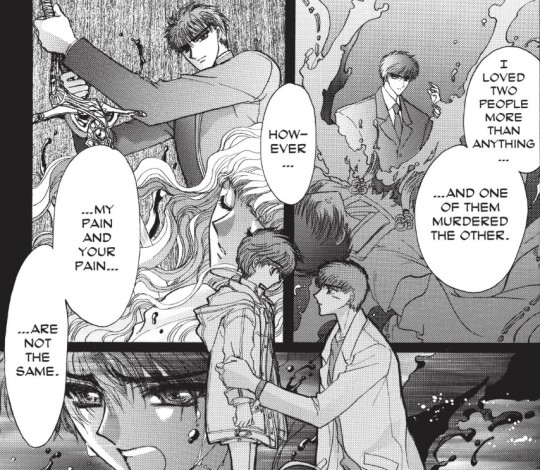
The most pertinent difference between the two is the cause that led them into a coma in the first place and what ultimately brought them out of it. For Subaru, the betrayal and abuse at the hands of the man he loved is what sent him into a coma while the death of his sister, the other person he loved most, is what brought him out of it. In other words, traumatic shock put him into a coma and traumatic shock forced him out of it. There wasn't a single moment that wasn't painful.


For Kamui, it’s quite different. The death of the woman he loved along with the betrayal and abuse at the hands of his best friend is what sent him into the coma. It was doubly traumatic because Kamui lost everything all at once. This is a big part of why Sorata was so worried Kamui would never wake up; he literally had nothing tying him to reality. The only two people he'd ever had a significant bond with were both gone in one fell swoop. The only reason he emerged from this is, of course, because of Subaru’s intervention.

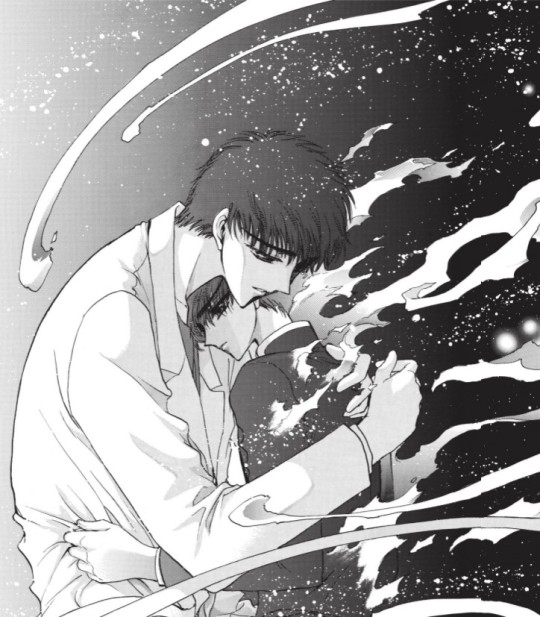
Perhaps the only reason Kamui is even slightly well-adjusted is thanks to the much gentler wake-up call he had in comparison to Subaru. Frankly, after Hokuto died, Subaru didn't have anyone for nine years. It's no wonder he dwelled on nothing but Seishirou, barely managed his duties as head of the Sumeragi clan, and developed a suicidal wish to keep him going.
Kamui has Subaru, so he managed to avoid a lot of that. He's still obsessed with Fuuma, but he has other things to occupy his time with.
Some other differences in Subaru and Kamui's backstory to keep in mind: Seishirou was acting like a good guy in Tokyo Babylon. Fate had absolutely nothing to do with his transformation into a bad guy; that's just how he is. Fuuma actually was a good person who had the good persona wiped away and replaced with ... his fated personality, I suppose. I think this explains some of Kamui's stubbornness when it comes to rescuing Fuuma; he knows fate isn't fair and Fuuma was a victim of it.
Subaru has no such delusions. He knows Seishirou was playing him for a fool and he knows he has no regrets about it. It's why his wish isn't to fix Seishirou; it's merely to die at his hands, so he can finally let go of the whole thing.
And Subaru does his best to keep himself at a distance from his fellow Dragons of Heaven for the sake of this endeavor. He doesn't really befriend any of them or spend any real amount of time with them; he knows his wish will bring nothing but pain to anyone that cares for him, so he tries to avoid those attachments. I suspect we wouldn't have heard much from Subaru in this series if he hadn't become unexpectedly attached to Kamui himself.
So, let's get back to their first meeting. Kamui is in a coma and Subaru delves into his memories in order to help him. This isn't the first time Subaru has done this, and there are a few parallels to his previous case to consider with this one.
In volume 2 of Tokyo Babylon, Subaru has to help a woman, Mitsuki, that he once knew that had fallen into a coma after being sexually assaulted. It's implied this is the first time Subaru has entered someone's mind to help them, and he comments it will be easier if she remembers him at least a little. He'd been dreaming of her earlier that very day.
Now, not only does Mitsuki remember him, it's revealed that she's harbored a crush on him since they were children. It's never made very clear whether or not Subaru returns those feelings, although there are some jokes from Seishirou that she is his rival in love. Regardless, Subaru saves a woman that considers him special and only emerges from her coma thanks to Subaru's kind words.

So, when Subaru enters Kamui’s mind, he knows it will be dangerous. Kamui doesn’t know him at all; there isn’t any kind of attachment to make this easier. But the end result is very similar to what we see in Tokyo Babylon: Kamui emerges both because of Subaru’s kind words, but also because he’s found someone that understands the pain he’s been through to some degree. Both Mitsuki and Kamui reverted to childhood in their sorrow as well, a time where things were much simpler and the world easier to understand.
There’s no doubt that Kamui considers Subaru special after this. How could he not? And if we compare Kamui’s case directly with Mitsuki’s there’s at least the implication he may grow to care for Subaru in a similar fashion to Mitsuki. CLAMP went out of there way to draw as many comparisons between Subaru’s past and Kamui’s present as they could within this series, so I think it’s fair to make this assumption.
It's also notable that Subaru's own feelings on the matter are harder to read in both situations. Did he have feelings for Mitsuki or was she simply a treasured friend from his past? Her words had haunted him for years at that point, so her opinion definitely mattered. Likewise, it's harder for us to tell what he thinks about Kamui. We can tell there's a deep bond and affection there, but it's not quite as straightforward.

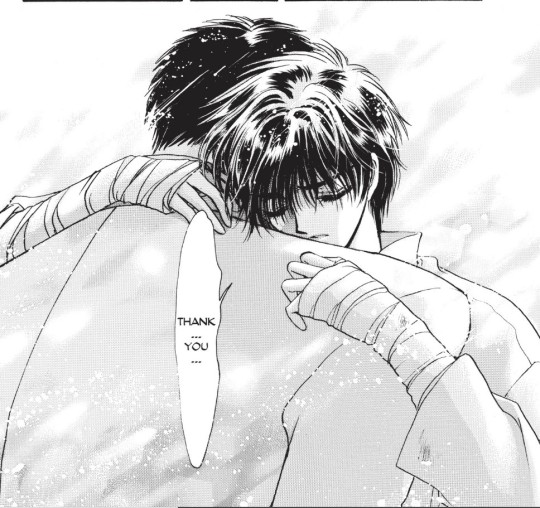
The hug is actually quite important here. They held one another in the dreamscape and then continued to in reality. This is interesting because neither Subaru nor Kamui are physically affectionate people. Subaru only ever hugged his sister and maintains a kind of no-contact rule with people in general. He never initiated physical contact with Seishirou throughout Tokyo Babylon and definitely doesn't in X/1999. He doesn't go out of his way to pat his fellow Dragons of Heaven on the back the way Sorata does. The only exception is Kamui.
As for Kamui, he just … isn’t affectionate. 8D You’ll recall how crabby he was at the beginning of X/1999. He was pushing everyone away in a misguided attempt at protecting them. Then, one of the only notable times he initiated physical contact was when he held Kotori in his arms and cupped Fuuma’s cheek for the last time, and that was when he was incredibly distressed and finally willing to admit how much he cared about them both.

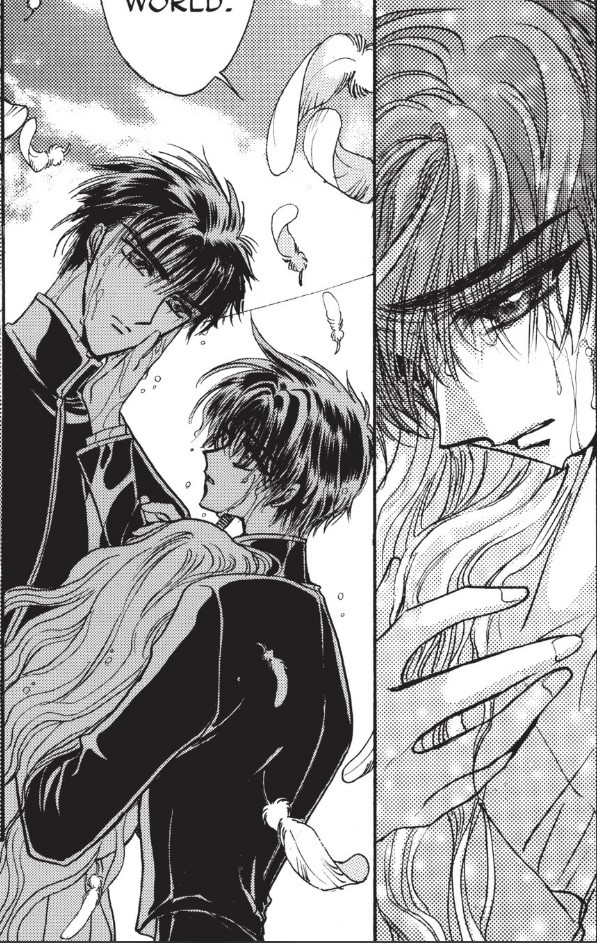
These are two people he’s known and trusted his whole life, so it makes sense he would allow some physical contact between them. Consider how he reacts to Sorata, Keiichi, evil!Fuuma, and pretty much anyone else that tries to initiate physical contact: it’s met with either confusion, overt hostility, or acceptance without reciprocation. Honestly, Sorata’s gotten all three of these reactions… 8D
The one exception is Subaru, who he not only accepts physical contact from, but will also initiate. So, the two of them are relatively similar in how they approach this, which is something we'll see throughout this review.
While Subaru was in Kamui’s dreamscape, they discuss several important things, such as the fact Kamui is trying to escape reality and the fact nothing will change or improve if he remains in the coma. He also explains his relationship with Seishirou and how things became much worse when he refused to leave the confines of his own mind.
But there’s a small detail CLAMP drops that I always found interesting.

This isn’t meant to show Kamui as naive. On the contrary, this is actually pretty wise and gets back to Subaru’s Shinto roots. Subaru is an onmyoji, a follower of onmyodo, which is a mix of Chinese philosophy (the five elements, yin-yang theory, etc.), Buddhism, and has elements of Japanese philosophy, i.e. Shintoism.
In Shinto, things really do have lives, and they deserve respect. It's yet another demonstration of how the Sakurazukamori are the opposite of the Sumeragi; they use these basic ideals and corrupt them. Things aren’t important, and neither are people.
So, in one fell swoop, Kamui has reminded Subaru of his own philosophy and demonstrated a fundamental difference between his worldview and Seishirou’s. Kamui is approaching things from a similar place Subaru would have when he was younger (it’s hard to say how much faith Subaru has in his own practice at this point; he’s pretty jaded).
Ultimately, Subaru asks Kamui several questions that give insight into both of their mindsets while they're in the dreamscape: If his [Fuuma’s] true self is restored, are you willing to tell him you killed Kotori? Even if it means he’ll hate you? Even if you must shoulder the blame for the rest of your life? Even if no one else will understand what you wished for and the reasons why?
It’s a pretty serious line of questioning because, in all honesty, what Kamui wants is dangerous. There’s no guarantee he can ever have it, and if he does attain his wish, no one will be spared the repercussions of it, least of all himself. In contrast, Subaru’s wish is a lot less destructive for the world as a whole, but he’s still hurting the people who care about him with it. Still, a lot of these questions are probably the same ones Subaru has had to ask himself over and over again. He knows no one will understand his own wish, that he will have to shoulder the blame for it, and that some could even hate him for valuing himself so little. He's making absolutely sure that Kamui understands the repercussions.
The thing is, while Kamui is willing to shoulder all the potential problems that might arise when Fuuma is restored, he's not at all prepared to think about whether this wish is what he actually wants or if it's even worth all the other problems that will arise from it. Subaru doesn't bring any of that up likely because he's never had to think of the whole planet with his wish. This is outside his own experience. He's doing his best for Kamui, but there are some things he simply won't understand. It's why he pointed out that his pain and Kamui's pain are different; there are some things they won't understand about each other, even with these similarities.
Our next important scene with Subaru and Kamui takes on a much less dramatic tone, which is probably for the best; there’s very little chill time in this series. 8D
Kamui has enrolled in high school due to its location being where the sword will be hidden until he has need of it. He visits Kotori’s grave, which is nearby, and then goes to study with Subaru, though a fellow classmate, Keiichi, had been trying to gain his attention.
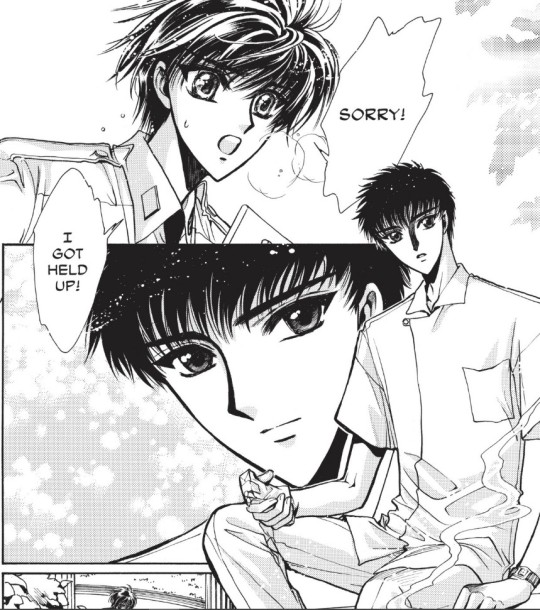
For one brief, shining moment, it’s as if we’re in a completely different series where the world isn’t about to end…
But the first thing that’s interesting about this is that it means they must be conversing off screen if they’re making plans to meet up, which is a theme that becomes very common with these two. Unlike the bulk of the Dragons of Heaven, Subaru doesn't live in the same dormitory as Kamui, so they’d have to figure out some way of meeting up. I would have liked to see some of that planning and how often they meet up to study, but CLAMP leaves all that to the imagination.
At any rate, Subaru has enrolled in the college and Kamui is worried he will get in trouble for skipping class to help him.

There’s a lot that's wrong with this. First of all, Subaru is only enrolled in college because it’s a good way of tracking down Seishirou, which Kamui swiftly picks up on. This is incredibly sad because throughout Tokyo Babylon, Subaru had been trying very hard to graduate from high school so that he could then go to college and become a zookeeper. This complete lack of interest in college or anything he once cared about is constantly present and goes a long way towards explaining why Subaru cracks as the series progresses.
Kamui is always very quick to figure out when Subaru is thinking about the Sakurazukamori even though, outside of their first meeting, he never directly brings him up of his own accord. There isn’t a single time when Kamui looks happy about it either. The sheer frequency with which Kamui brings up the Sakurazukamori makes me think he’s constantly looking for confirmation that that man really is the only person Subaru cares about, as if Kamui is hoping one day he’ll give a different response.
At any rate, what Kamui is really taking issue with here is Subaru’s smoking and his attachment to the Sakurazukamori. Subaru says he smokes because it makes him more powerful (which is such… a lie? Does he think anyone would actually believe that?) to which Kamui has this as a response:
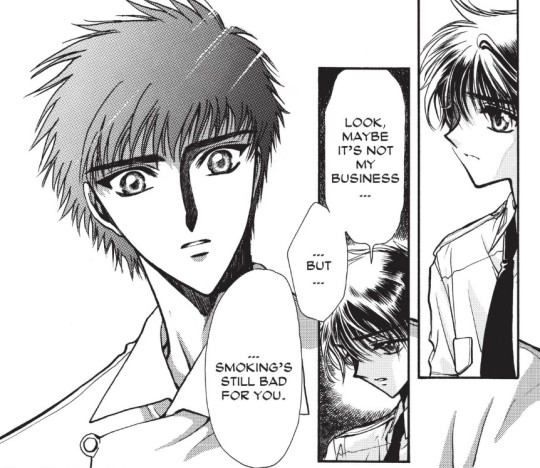
Kamui appears sad and disappointed at the answer because it is a disappointing answer (and a lie, but I digress) and Subaru looks surprised because… I think he was actually worried Kamui thought he would be ineffective as a Dragon of Heaven due to the smoking, that it would hinder him in battle. The fact Kamui is worried about his health didn’t even cross his mind.
Their exact exchange was this:
Kamui: But… don’t you worry that it’ll–
Subaru: It’s fine. Some people find that smoking weakens their powers, but for me it has the opposite effect.
He doesn’t let Kamui finish his sentence and immediately comes across as a little defensive about the whole thing. So, yeah, Subaru didn’t think Kamui would care because he cares about Subaru. He thought Kamui only cared as the Kamui, his leader. Realizing he was mistaken changes the rest of their dynamic for the duration of their study session. Subaru snuffs out the cigarette and resumes where they’d left off.
We don’t actually get to see the rest of the study session, though it's implied it goes on for a while. Keiichi interrupts things at some point because he is determined to hangout with Kamui. His reaction to Subaru is both amusing and kind of telling.
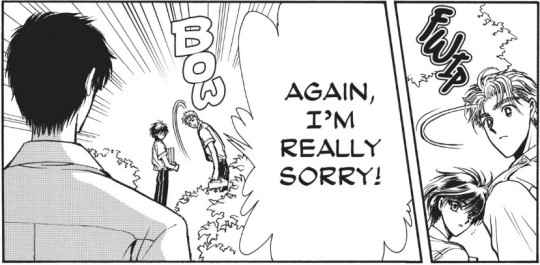

Keiichi’s repeated apologies to Subaru for interrupting and stealing Kamui away followed up by his comment that Subaru is good-looking to Kamui really makes it sound like he thought he was interrupting a date and/or that he thinks Kamui is interested in Subaru. Especially after he turns it all around by telling Kamui that he's really good looking as well and, as if that wasn’t enough, invites him to his house and offers to tutor him.
Uh… I’m just going to say it. Keiichi has never been subtle in regards to his massive crush on Kamui and he clearly thinks he’s stealing Kamui away from a potential love interest. 8D
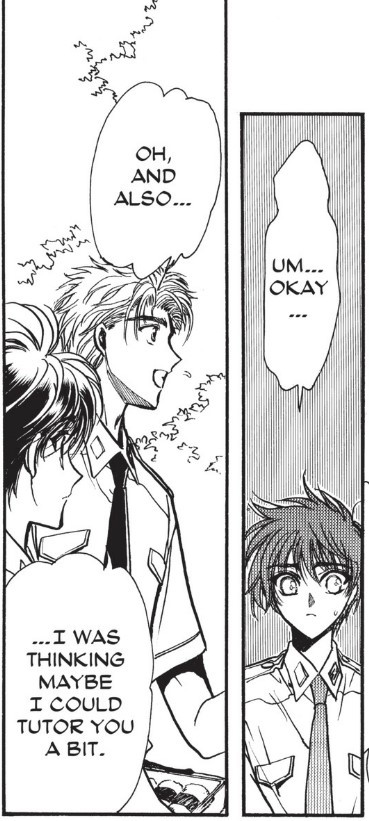

My goodness. XD I really don’t think Kamui picked up on any of that dynamic. He just thinks Keiichi is friendly and kind of weird. It’s like Kamui has developed Sakura syndrome and Keiichi is Tomoyo.
As for Kamui, we get an idea of how he views Subaru thanks to this exchange and it's pretty interesting. It also explains pretty much every single one of Kamui's reactions to Subaru and why their interactions go the way they do.

There’s definitely a lot of fondness there. He agrees that Subaru is good looking and we get an actual image of how he sees him: someone who is ethereal, almost untouchable with a very literal barrier (of water from the dreamscape), but he's willing to reach out and bring Kamui to his level. He absolutely views Subaru as a savior because that’s precisely what Subaru did for him. That’s a pretty complicated relationship, quite a bit more complicated than Keiichi is thinking, that’s for sure.
As for Subaru, he resumes his smoking as soon as Kamui is out of sight. I think Kamui suspected that’s why he wanted to stay behind because he looks contemplative when Subaru says he isn’t coming with. Even Keiichi seems surprised. Maybe that’s why he thought he had a chance with Kamui? (Also, Keiichi and Kamui’s interactions kind of deserve their own analysis because he’s Kamui’s one tie to normalcy and Keiichi has a profound attachment to Kamui the second they meet.)

Even so, Kamui's words about smoking being bad for him sticks with Subaru and you can tell he's conflicted about it. He keeps the cigarettes close, but there's less certainty about it than there was earlier in their conversation.
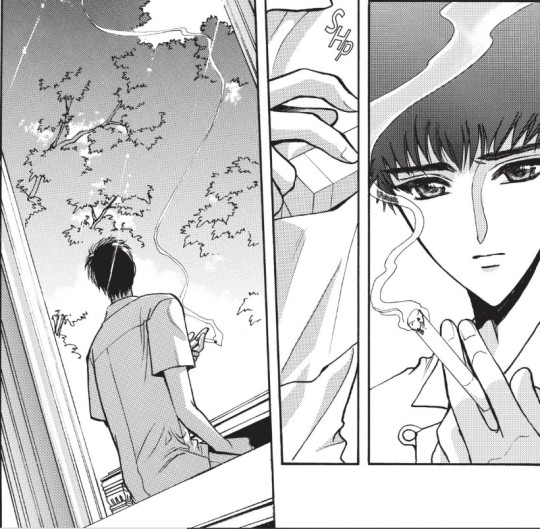
This part in particular is up for interpretation since there’s no dialogue, but to me it reads as Subaru being unable to let Seishirou go, but possibly wishing he were capable of it. He knows his wish will hurt people, and Subaru has never been content with that. This scene also makes me think of Subaru's one-shot chapter, where a woman says only a person with an ill heart can go around thinking only of one person. Subaru knows smoking is bad for him, but he's also already accepted he's "ill."
I’m a little unclear on how much time has passed, but the next time Kamui and Subaru see each other, it’s after Kamui is returning home from Keiichi’s house. He’s attacked by Fuuma and Subaru rushes in to save him.

Subaru legitimately came out of nowhere in this scene. Where was he before? How'd he get there so quickly? I know that the Dragons of Heaven can sense when a kekkai is raised, but Kamui can't raise one, so... I honestly can't remember, can the Dragons of Heaven just sense when Kamui is in danger? Because if not, I really don't know how Subaru knew to be exactly where he was needed.
Regardless, the battle between Fuuma and Kamui was going about as well as it usually does, which is to say absolutely terribly. Subaru gets a kekkai raised, and we actually get to see him use his onmyoji abilities in earnest against Nataku. You have no idea how much I wish we'd gotten to see infinitely more of this.
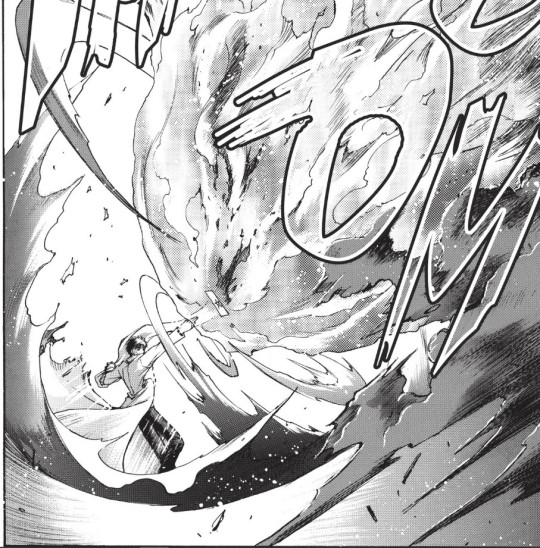
Unfortunately, Subaru ultimately loses once Fuuma joins the fray, but that’s because Fuuma is, frankly, an OP villain. I have never understood why the villains are so much more powerful than the good guys in this series. That’s just bad game design.
So, Subaru actually manages to capture Fuuma in a kekkai. I’m a little unclear on what the end goal of this was going to be. Annihilating him? Trapping him for good? But we don’t get to find out because Subaru gets lost in visions of Seishirou, the man he wants to kill him. To add insult to injury, Fuuma attacks him the same way Seishirou did when he was 16 and blinds his eye, saying it’s “his wish.” Ever notice Fuuma only seems to grant the really messed up wishes? He doesn’t have to grant all of these. He could focus on some nice ones for a change. Sheesh…
More importantly (as far as this review goes), Kamui is once again in the same situation Subaru was when he was 16. He is being protected by someone who loses their eye and he was powerless to stop it, just as Subaru was all those years ago. The main difference is that back then, Subaru was purposefully allowing someone to take their anger out on him and Seishirou got in the way. Kamui was forcibly restrained from the battle and had no choice but to witness events. It also shows the difference in their personality: Subaru isn't predisposed to fighting and is more than willing to be hurt if it helps another while Kamui is perfectly all right with fighting, he just doesn't want to hurt the other Kamui because it will hurt Fuuma.
There are some other differences as well. When Seishirou’s eye was gouged out he kind of just… walked into the ER? 8D Didn’t comfort Subaru, just casually stopped the woman from attacking him and walked away. So, Subaru’s distress levels were through the roof.
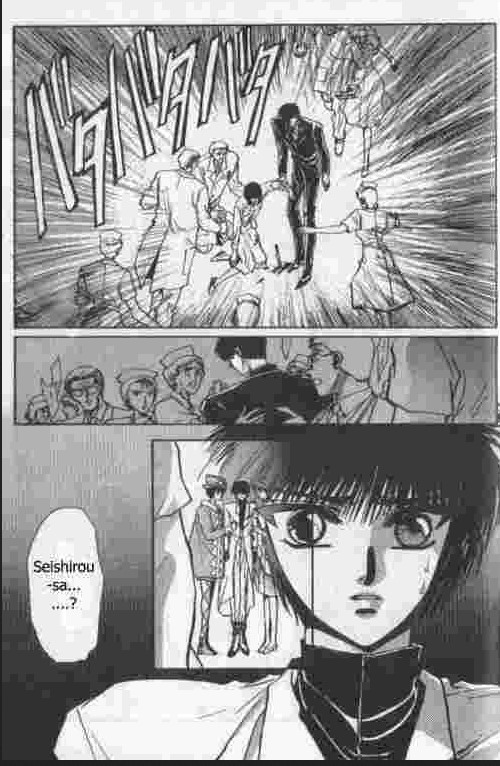
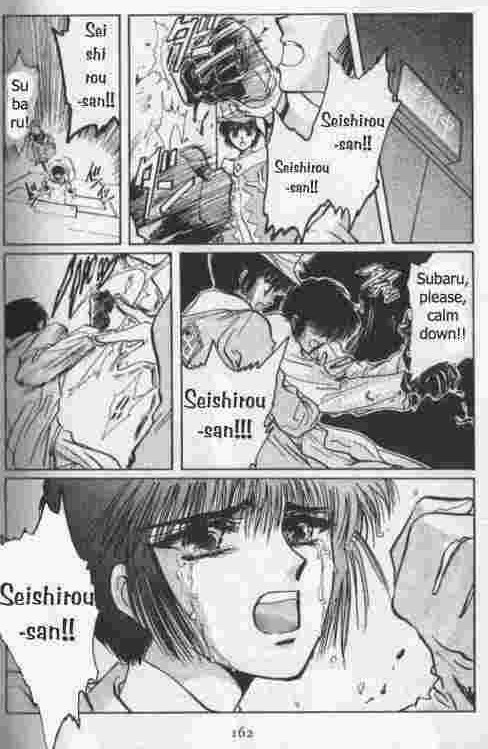
Kamui’s distress levels are also ridiculously high, but once again, Subaru is far more compassionate than Seishirou and I’m sure Subaru can see the parallels here. He knows exactly what Kamui’s going through, and he doesn’t want Kamui beating himself up the way he did to himself all those years ago. He actually stops the gurney in an effort to comfort him.


It definitely helps, but sometimes Subaru is a little too honest with Kamui. He tells him this was his “wish.” Needless to say, that doesn’t exactly ease Kamui’s mind because it raises a lot of questions about Subaru's mental state he probably hadn't even been considering before.
What follows is the most clear cut parallel we’ve ever had between Subaru and Kamui. Subaru’s despair at possibly losing Seishirou when he was 16 is nearly identical to Kamui’s despair at nearly losing Subaru in the present. CLAMP is not doing this accidentally.

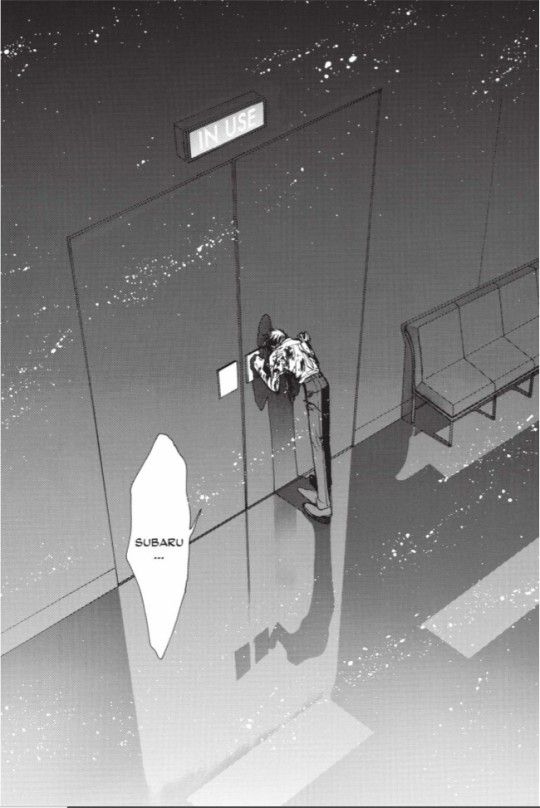
This, almost more than anything else, makes me believe that Kamui has feelings for Subaru because there’s not really a reason to include this parallel otherwise. In Tokyo Babylon, after Seishirou lost his eye, Subaru realized he was in love with him. It wasn't right away, but that was the incident that sparked the whole thing.
After Subaru loses his eye, Kamui stays by his side as much as possible. Kamui is never shown to have a sudden revelation he’s in love, but this is where the differences between Subaru and Kamui really become important.
Back then, Subaru was terrified of Seishirou hating him after the eye incident, and I think a lot of that comes down to the fact that Seishirou was trying to win a bet. He proclaimed his love to Subaru all the time, but he was also mysterious and decidedly standoffish. Subaru had a difficult time reading him, therefore he couldn’t predict what Seishirou would think of him afterwards.
Subaru also has a fundamentally different personality to Kamui; he had no awareness of his own feelings toward Seishirou until his sister made him think about it and a stranger said it sounded like he really loved this individual.
Whether Kamui is worried Subaru will hate him is a little unclear, but we do know that one of Kamui’s biggest opinions of Subaru is that he’s very kind. We also know he admires him as the man that saved him and saw him at his worst already. Subaru is always honest and very open with Kamui; there isn’t any additional layer of confusion in this regard (there is confusion about other things, though). The only thing Kamui fears right now is Subaru dying in this situation. He also feels massive guilt for being incapable of helping him. Kamui is taking the blame for this.
Another difference is that Kamui doesn’t have anyone deliberately trying to get him to think about his feelings for Subaru, but I think Kamui is more predisposed to falling for people in general? Or at least more capable of realizing when he has. He loved Kotori and never seemed to be in denial about it from what I can tell. It wasn’t declared in a straightforward manner in the manga, but the series made it apparent enough through other things. Kotori is considered his canonical love interest for this very reason. And I think that’s more or less what we ought to expect in regards to Kamui’s feelings toward Subaru. There isn’t going to be a big revelation; it will simply be.
And part of that quiet revelation is how attached he continues to be to Subaru after this incident.

Subaru is overtly worried about Kamui, probably because he knows how worked up he was over Seishirou himself when it happened, but also because he thinks Kamui hasn't slept. "It's harder for him to bear the wounds to his heart than the wounds to his body." Subaru definitely understands Kamui's pain all too well and he knows that while this particular incident is his own fault, Kamui is the one who will shoulder the blame, just as he did all those years ago.

It's interesting that Kamui asks for permission to visit him again. It definitely implies that maybe he actually is a little worried Subaru doesn't want him around, that he's sending him away because he's upset with him.
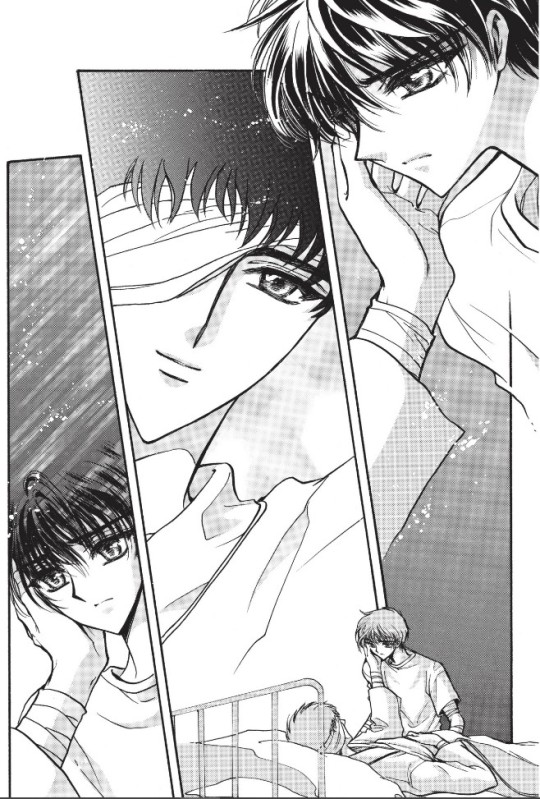

Kamui looks quite distressed at first, but one look from Subaru and he knows Subaru isn’t upset with him; he's worried about him.
These two tend to be very quiet around each other as soon as other people are in the room, and both Sorata and Arashi are right there. As soon as they’re alone, they engage in far more intimate conversation. Yet, they appear to be pretty good at silent communication as well and a lot is exchanged in the above panels.
Even if Subaru has forgiven him, Kamui is still plagued by what happened (understandably). He compares it to his failure to save Kotori. Two important people to him are hurt/killed because he couldn’t fight against Fuuma. It’s a powerful dilemma and a powerful comparison.
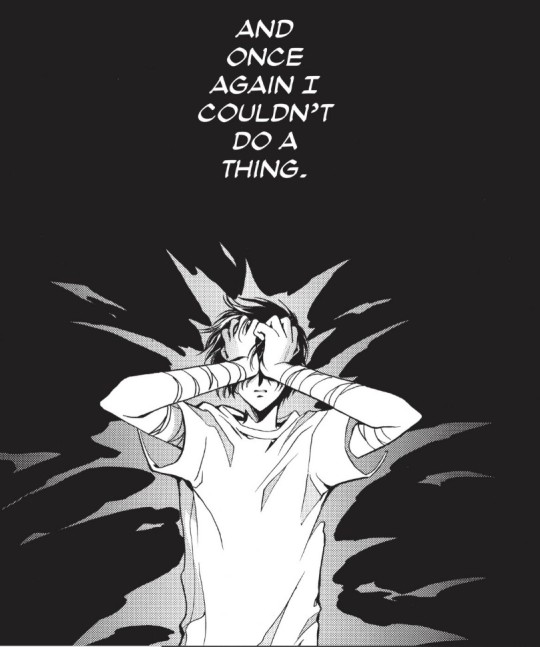
Still, after a conversation with Sorata, a visit to Kotori's grave, and a conversation with Keiichi, Kamui has renewed hope. He can do something against Fuuma: he can protect the people he cares about. This renews Kamui's determination to learn how to create a kekkai, a plot point that is never actually finished... I honestly wonder if would have learned to create one? And what would have sparked that?
We get a little insight into what Subaru is thinking about events, though. It's about as depressing as you'd expect with the trajectory of this series.
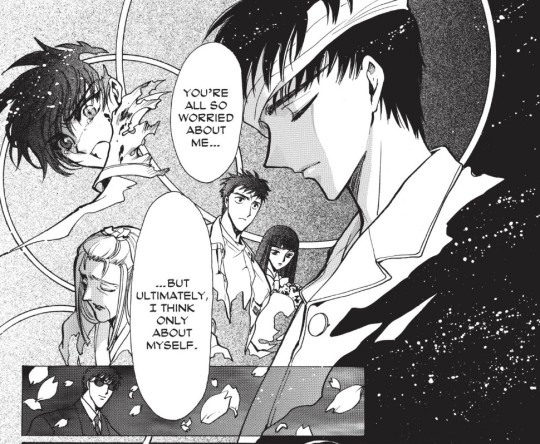
Subaru has a selfish wish. He knows that wish will hurt everyone that knows him and now there are quite a few people who care about him, something he'd been trying to avoid.

Yuzuriha is entirely correct in her analysis here, though for more reasons than she might realize. She's essentially saying that both Kamui and Subaru look down on themselves and try to solve things on their own. It's why she makes them promise to call on her if they need help. But she's also correct in another way: they both have selfish wishes and they're hurting everyone around them for the sake of those wishes. Subaru is hurting people on an emotional level by pursuing death, while Kamui is inadvertently getting people injured and killed for the sake of rescuing Fuuma. The message is clear: if these two could let go of their one "wish" they could finally move on to other possibilities and would be far more effective at saving the world. It's a cruel irony that CLAMP made their kindest character and their hero the most emotionally compromised and the most inadvertently selfish. It's also a little unfortunate that kindness and hope seem to get trampled on so much in this series, but that's a whole separate issue.
Yuzuriha also leaves Subaru with a parting gift and, honestly, I wouldn't be surprised if she reminds him of his sister just a bit.

The cherry blossoms definitely bring Seishirou to mind as well as Subaru's wish for death, but it also makes me think of Hokuto as well, especially the rabbit plush. It just seems like something she would do. Regardless, Subaru still hasn't moved on.
Kamui engages in yet another battle with Fuuma, which actually goes worse than the last one. Sorata and Arashi aren't as timely as Subaru had been (Dragons of Heaven must simply be able to sense when Kamui is in trouble because they also were no where nearby. Alternatively, Hinoto is just telling them stuff). Fuuma is saying something about eating Kamui's heart. We could put this down as him being a general creep, but there's usually a double meaning with him. Perhaps one of Kamui's wishes is that he just didn't feel anything at all...?
All of this eventually brings us to our next Kamui and Subaru scene. This one has a very quiet, intimate vibe to it, probably on account of it not taking place in a hospital but what I think is Kamui's room?

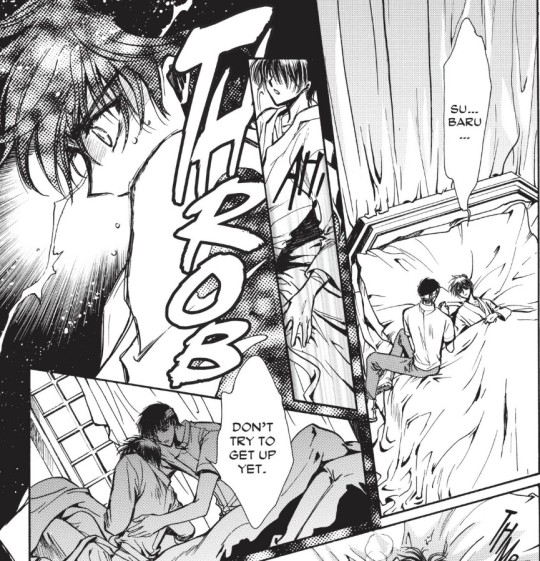
Kamui has some pretty serious injuries this time around, and we learn that Subaru stayed with him the entire time, just as Kamui did for him at the hospital.

Actually, these two seem a lot closer than they did previously. Is it simply because of Subaru losing his eye? Did that open up a new level of compassion between one another? Was there more off-screen development? My guess is it’s mostly the former, but the latter is a distinct possibility with the way things have been going.
What is plain is that these two are always supporting each other in times of crisis. Not always physically, but emotionally. Subaru in particular is always there to counsel Kamui on whatever issue he wants to discuss while Kamui reminds Subaru that people actually do care about him and Kamui is one of those people.
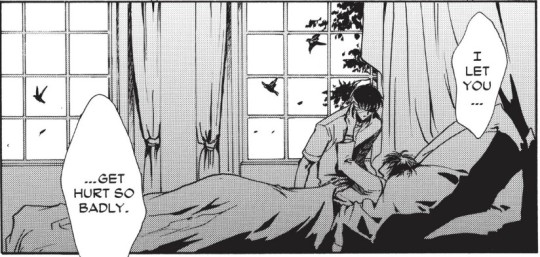
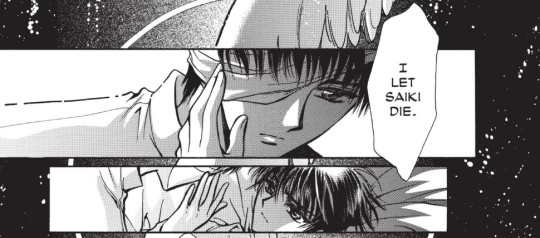
“And yet, despite all that, I still can’t abandon Fuuma.”
Honestly, I think even Kamui is beginning to wonder if his wish is really worth it. He’s losing all the people he cares about in this pursuit. I genuinely think if Subaru had told him to rethink things here, he might have, because he trusts him and his wish has gotten him absolutely nothing so far.
Unfortunately, Subaru isn’t exactly in a great place to be telling people they need to rethink their life choices, so he doesn’t. Instead, he tries to be encouraging, which is both kind and misguided.
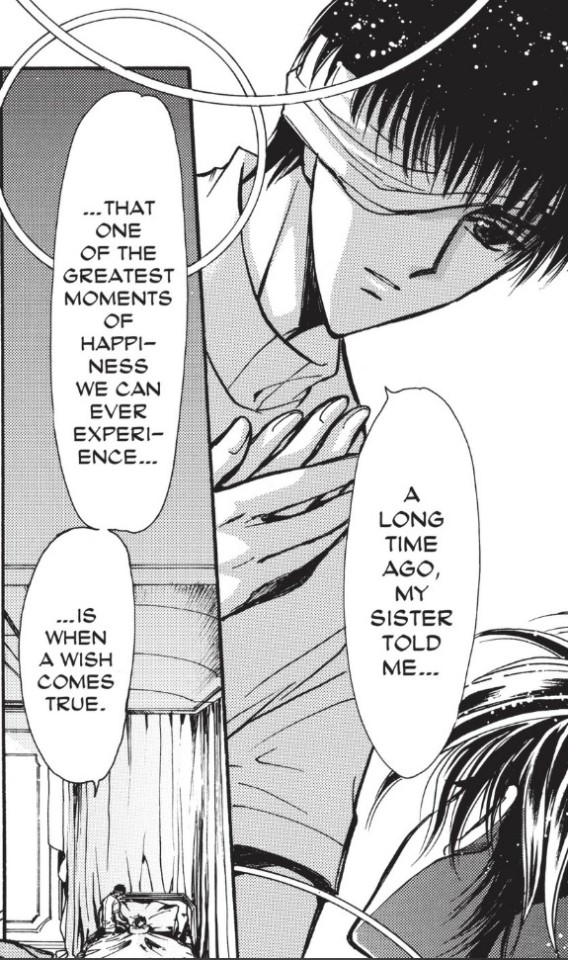


This is a level of emotional and physical intimacy that we just don’t see between any of the nonromantic relationships in this series. It’s actually more touch focused than a great deal of Arashi and Sorata’s interactions and those two actually have a very close emotional connection that develops into a sexual relationship later on in the series, so I have a hard time believing I’m supposed to read this scene as entirely platonic.
But what Subaru is saying is important, even if I think it’s a philosophy that manages to get both him and Kamui into trouble. “Happiness” is basically satisfaction or completion in this context. It’s not necessarily joy. Subaru is essentially telling Kamui that, yes, his wish may be selfish but it’s his. If it is the only thing that can satisfy him, he must pursue it.
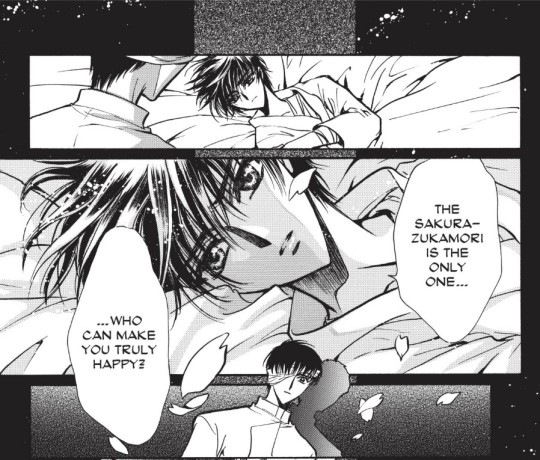
Kamui makes no further comment on his own wish; he’s latched onto Subaru’s once more and is bringing Seishirou up yet again. Subaru appears surprised, perhaps because Kamui saw right through him or perhaps because Kamui’s interest in the subject has been so pointed, but he says “yes.”
I really do think Kamui was looking for something from Subaru here that he didn’t quite get. I genuinely believe he’s trying to get confirmation on whether his path is correct or not, but Subaru doesn’t really give him an answer. When that doesn't work, he tries to figure out if Seishirou is really the only thing that can bring Subaru satisfaction, which reveals this is yet another thing that's been on his mind.
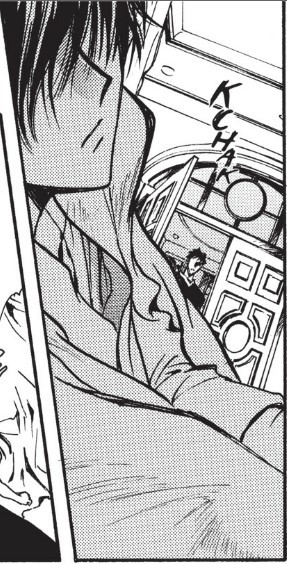
That is not acceptance or understanding on Kamui’s face. That is something a little closer to sadness, disappointment, or possibly even anger. He is not pleased with this answer.
There are a lot of layers happening with this conversation and a lot of insinuations, but none of it is ever just laid out for us to see. What seems relatively straightforward to me is that Kamui wishes Subaru would let Seishirou go. He isn’t content with Seishirou being the answer to Subaru’s wish, but he also can’t bring himself to criticize it either. After all, that would be pretty hypocritical; Kamui can’t selfishly pursue his own wish while simultaneously asking Subaru to give up his own for Kamui, but I think there’s a part of Kamui that genuinely wants that to happen.
It also reveals that Kamui does have doubts about the path he's chosen. He never says it outright--he's always vocally determined to save Fuuma--but he's looking to Subaru for guidance on this issue. Not anyone else. Subaru.
So no, Kamui can't reveal that he's unsure about his wish; it's what bonded him and Subaru in the first place. Likewise, he can't ask Subaru to rethink his own wish. What really needs to happen for these two is for them both to give up their current wish to pursue … whatever this is. I’ve talked a lot about Kamui’s feelings for Subaru, but Subaru definitely holds affection for Kamui as well. There would be no reason to hold his hand that way otherwise. And there’s no way Subaru isn’t aware of the parallels; he is definitely occupying a similar role to Seishirou in Tokyo Babylon, that odd mix of mentor and potential love interest. The obvious difference being that Subaru isn’t a psychopathic killer.
Anyway, Sorata and Arashi once again interrupt their odd bonding moment and it’s incredible how swiftly the mood in the room changes. Subaru physically moves away from Kamui, stands at a more respectable distance, and Kamui turns his attention to everyone else. It definitely feels like they aren’t trying to advertise their emotional connection or their problems. Kamui becomes the leader and Subaru becomes another Dragon of Heaven.
Subaru eventually returns to his side when Kamui enters a dream state with Hinoto while the others are there, but he doesn’t say anything further. It’s interesting that Sorata has no issue with hugging Kamui or putting an arm around him when others are around, but Subaru does. Of course, Sorata is simply more demonstrative than Subaru on any given day, but it does feel like quite a stark contrast.
It looks like several days go by between that visit and their next one. Kamui is mostly recovered and heading back to school.

This is so subtle it’s very easy to miss–I did the first couple of times–but Kamui just finished buttoning up his shirt here. He is not inspecting his scars like I initially thought.
How long has Subaru been there? They’re pretty obviously in the middle of a conversation; he didn’t just arrive. It kind of suggests Kamui just… got dressed in front of him, which is definitely a shift. Their general attitudes towards each other are quite different from before as well. The opening panel above shows both of them as seeming more confident than before.
I’m not sure I believe anything untoward happened between them because that would be a pretty drastic shift in dynamics, but if there ever was a point in this series where something more physically intimate occurred (not necessarily anything sexual mind you), it's probably the unseen precursor to this scene. It's CLAMP, so... I guess what I'm saying is that I sometimes just don't know with them. XD
Regardless, all of this reveals, however subtly, a side to their relationship that doesn’t get a whole lot of focus. Namely, all that off-screen bonding I was talking about earlier.
Some of their comfort level is no doubt from the situation being less bleak in general of course. That usually helps.
And then there’s all of this:
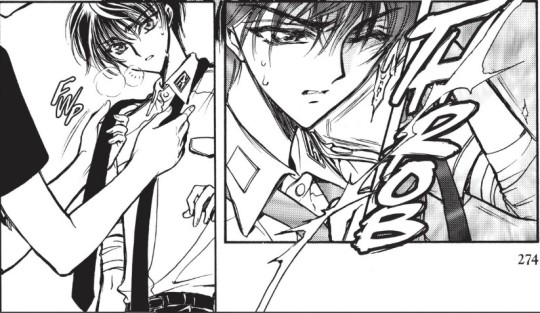


Kamui's left arm is giving him a lot more trouble than his right. That explains why he was buttoning up his shirt with just the one previously. But he appears thoughtful, maybe a bit sad, as Subaru helps him with his tie. A lot of that has to do with him not knowing where Yuzuriha is–she could be in grave danger–but I also think some of it has to do with Subaru and Kamui’s feelings toward him. I think it’s safe to say things have entered “complicated” territory. They have a relationship that's incredibly close, but no matter how close Kamui gets to him, there's always a barrier there.
There's also the fact that Kamui always feels guilty when he's incapable of something, so even something as simple as needing help with his tie could be causing him some distress.
So much of what goes on between these two is unspoken. Subaru helping him with his tie is something that doesn’t have to be romantic, but it is a frequently used trope used to demonstrate trust and care, usually between two people who are already together.
If Seishirou and Subaru’s relationship reached it’s culmination after Seishirou lost an eye, I think it’s safe to say that Subaru and Kamui’s is following a similar trajectory, only Subaru didn’t immediately turn on Kamui. Instead, they have time to explore things in a way Subaru never did with Seishirou, whatever that may mean.
Subaru moves things into safer waters from Yuzuriha’s disappearance to Keiichi. He says he will be glad to see Kamui back in school and that he asked Subaru every day if he was all right.
Now, I mentioned earlier that Keiichi definitely thought Subaru and Kamui had something going on and felt he might be stealing Kamui away, but what does Subaru think of Keiichi?
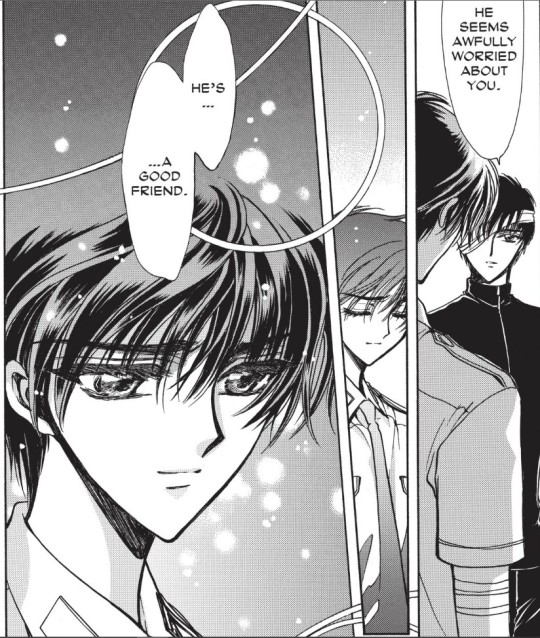
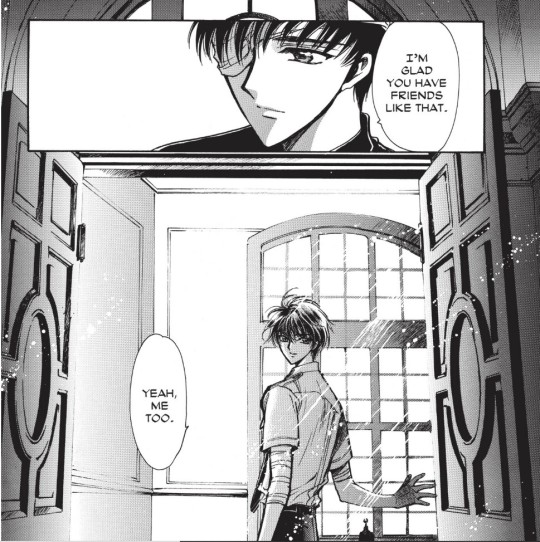
I'd say "curious" but supportive and completely unconcerned about any competition. Honestly, Subaru doesn't strike me as the jealous type, so even if there is something between him and Kamui, I don't think he'd stop Kamui from pursuing something with anyone else. Subaru wouldn't consider himself a great choice; he thinks he's selfish after all.
This is the last normal moment Kamui and Subaru have before Subaru's final confrontation with Seishirou.
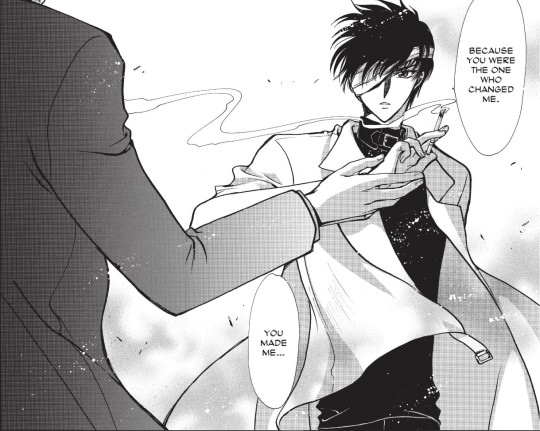
I feel relatively safe in the assumption that Subaru was going to say "like you." This is before he even becomes the Sakurazukamori, but he now considers himself selfish and he can't move on from his past whatsoever. He's also lost some of the empathy he had when he was younger; he's definitely kind, but he isn't willing to give everything up for others. He's arguably taken on Seishirou's role with Kamui as well, which I'm sure he has mixed feelings about. And ultimately, he and Seishirou share the same wish: to be killed by the person they love. So, yes, Subaru is definitely different from how he used to be.
It's after Seishirou dies that Subaru really snaps in the series. He was struggling to get by for the majority of it, but this really does it. It’s notable that even now, Kamui restrains himself.
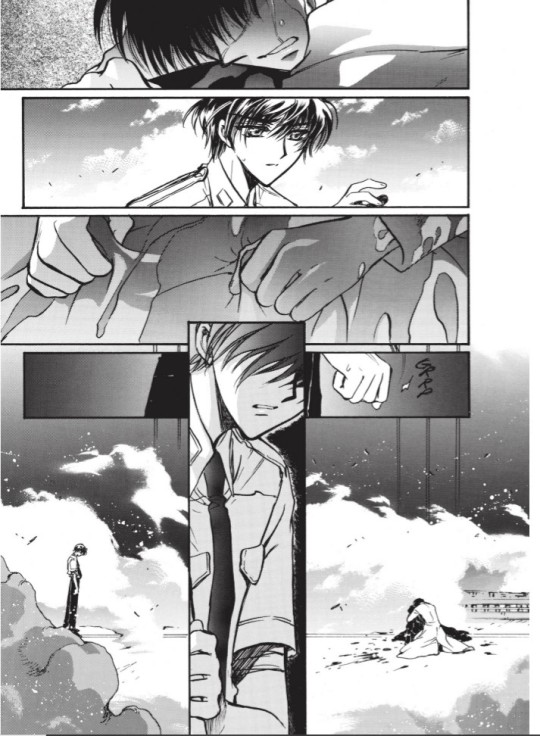
Kamui always holds himself back when it comes to matters involving both Subaru and Seishirou. He never tells Subaru what he thinks of his wish and he doesn’t know how to help him. I think a lot of his resistance to actively reaching out to Subaru on this matter, both physically and emotionally, is out of a misguided sense of respect for him. Subaru knows what he wants and did a great deal for Kamui; Kamui tries to return the favor by giving him distance, but I think distance was the wrong thing to give Subaru. He needs to be dragged into the now and he needs to be reminded that people care. That's a lot to take on though, so I can't blame Kamui for not knowing what to do, especially when he's looking to Subaru for guidance. He doesn't feel like he can take on that role.
Their final parting is tough to watch.
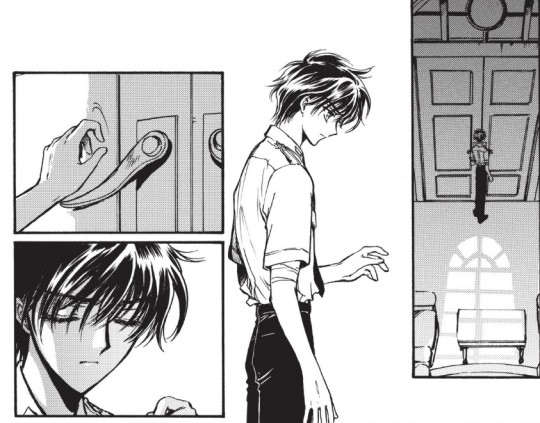
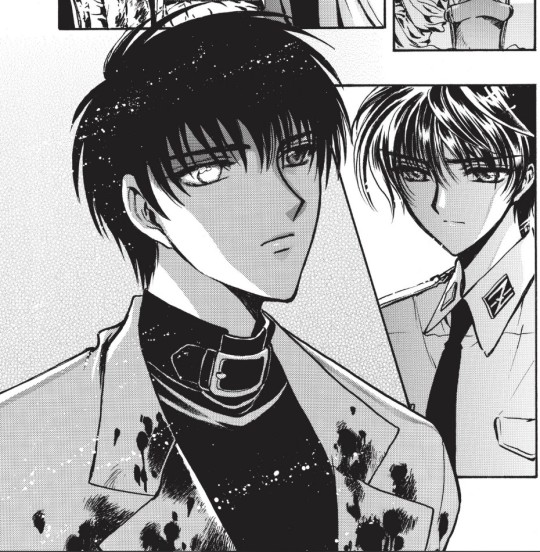
I think this time, Kamui actually is worried Subaru might hate him, because for the first time he’s actually “disrespected” Subaru’s wish. He didn’t let him die with Seishirou when the bridge collapsed. He saved him and that goes against everything Subaru has wanted for the last nine years.
But once again, Subaru misunderstands and I think there’s a part of Subaru that simply can’t accept that Kamui cares for him as a person. He’s stopped caring about himself, so he doesn’t connect the very obvious dots in front of him.
Subaru: You don’t need to worry about me. I’m not going to fall apart.
It could be this is just how Subaru deflects. Rather than discuss what’s really bothering him, he tries to treat Kamui like a leader who is talking to his subject, but that simply isn’t the relationship they ever had, least of all now.
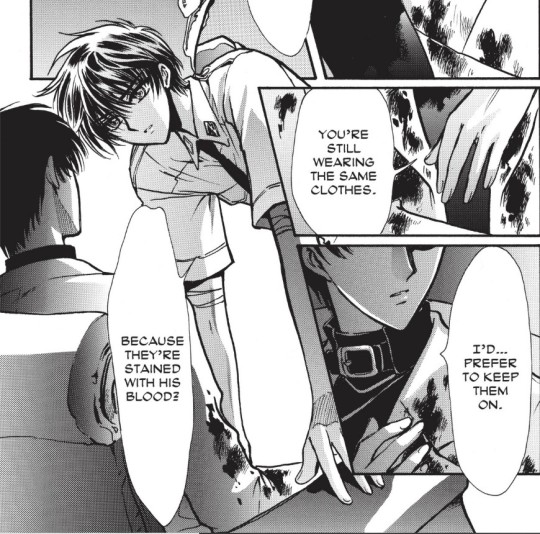
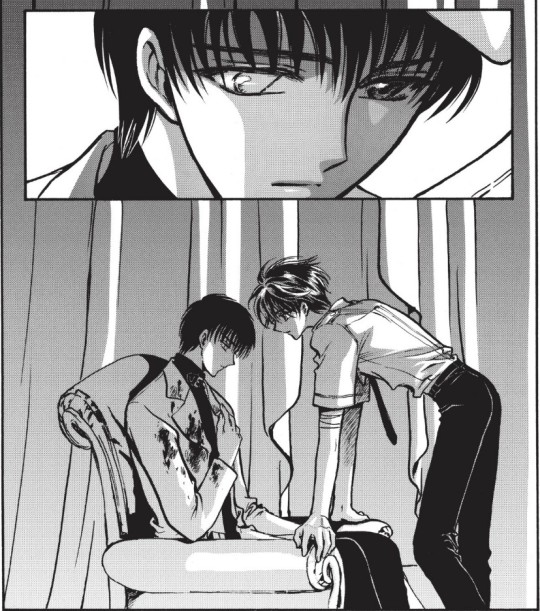

Once again, Kamui gets to the heart of the matter; Subaru is thinking of Seishirou. Everything he's done is for Seishirou, and it's now very apparent Kamui simply can't accept that. He's sorry for it, he knows that if he really wanted to "respect" Subaru he would have let him die, but he couldn't do it.

Even now, Subaru is still trying to explain things to Kamui and still trying to comfort him to a limited degree; Subaru’s not exactly at his best right now, though and it's all pretty dejected. Despite having his wish denied, he doesn't blame Kamui. As he points out a little bit later, some wishes collide. He doesn't hold it against Kamui, though.
Kamui brings up the cigarettes again and this implies the whole thing is still bugging him and that he simply doesn’t understand Subaru’s motivations.
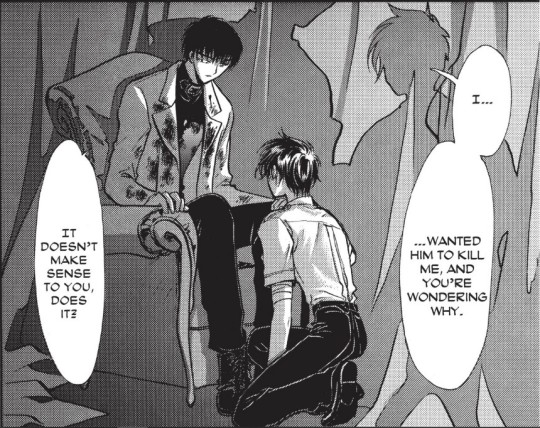
It’s interesting that our only previous glimpse into how Kamui feels about Subaru showed Subaru as being above him, yet reaching out to bring him closer. Here, Kamui literally sits on his knees before him so that Subaru is hovering over him, almost like a king with his subject, and Subaru is metaphorically reaching out to Kamui in an effort to explain himself so that Kamui might understand him.
Subaru explains everything, and essentially tells him he will never understand Seishirou now, never know what he really thought.
I think it’s safe to say that Kamui is feeling similarly about Subaru at the moment--he doesn't feel like he understands him nor does he understand what he's thinking--and once again Subaru is taking Seishirou’s role in a very roundabout way, albeit in a kinder fashion. But there's no doubt that Kamui is giving Subaru power here. Everything about their posture and conversation indicates that. While Subaru sometimes tries to treat Kamui like a leader either as a way of deflecting or because he actually believes that's the right way to handle things, we see here that Kamui absolutely views Subaru as the person with the wisdom and authority to determine things. Maybe not about the fate of the world, that's Kamui's duty, but as far as giving directions? As far as getting a say in what happens next? Absolutely.

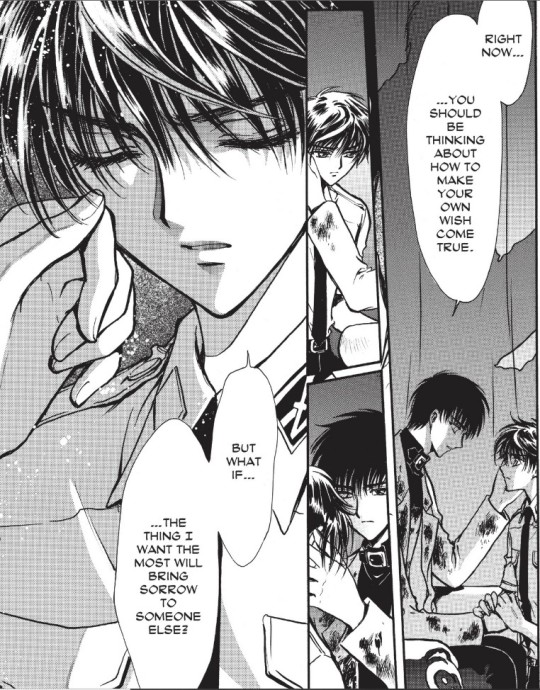
And once again, Kamui is looking for something from Subaru he can’t give: he’s asking if what he’s pursuing is “right” and if he should change. Subaru is being given the power to change Kamui’s course and I don’t think he even realizes it.
While looking at their progression, I really think some of Kamui’s steadfast determination to save Fuuma is partially because of how Subaru keeps affirming this belief for him. There were at least two big moments where Subaru could have nudged him in a different direction, but he didn’t take it. Instead, he tries to be encouraging, although this time it’s definitely more fatalistic. Subaru doesn't understand the influence he has over Kamui and that is one of their biggest miscommunications in the series.


Even as lost as Subaru is currently, he still cares about Kamui. He wants him to focus on his own desires, not on him, and he wants him to take care of himself. The problem is that he’s completely missing the fact that Kamui relies on him, cares about him, and would do a lot better if Subaru stayed in some capacity. Instead, he disappears for a month.
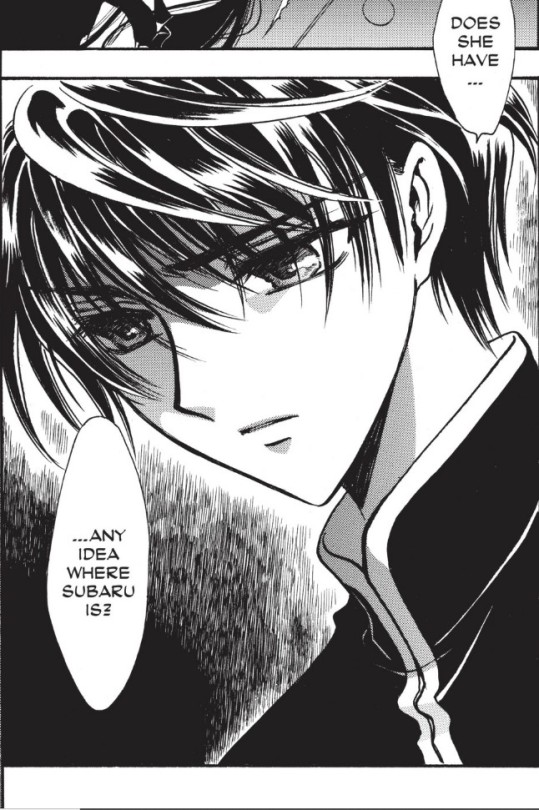

Needless to say, Subaru is very much on his mind throughout his absence and Kamui still can't make a kekkai. He thinks about how everyone has something they want to protect, and that's why they can make one. His thoughts lead him right back to Subaru.

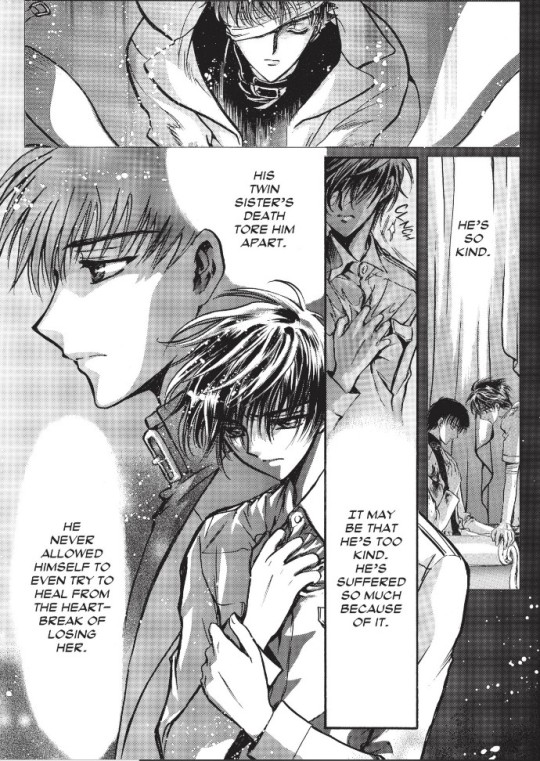


This is the person he's thinking about the most while he's visiting Kotori. This is the person he wants to return. And we actually get to see what it is Kamui actually wants for a change:
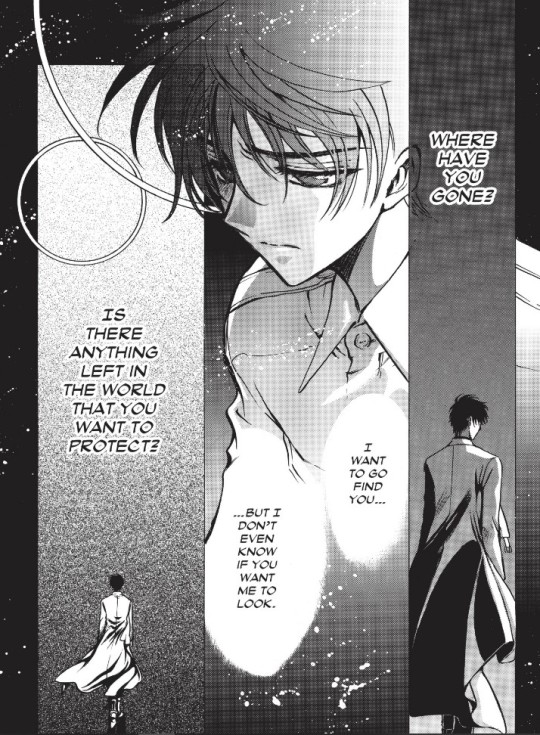
I don't know if this is the wish Kamui hasn't realized but it's definitely a wish: he wants Subaru to come back. He wants to go out and look for him. He wants Subaru to be capable of caring for someone other than the Sakurazukamori. The implication is that he wants to be important enough to Subaru for him to come back.
Just as Subaru wanted to be important enough to Seishirou for him to acknowledge him, so too does Kamui wish he were important enough for Subaru to do the same.
Kamui continues with "The people I most wanted to protect were Kotori and Fuuma. But Kotori is gone. And now all I want is to get Fuuma back. But... I still can't create a kekkai."
Fuuma is watching this moment through the dreamscape and has this input:

So, protecting Fuuma isn’t his real wish. What is? The only other thing he was thinking about was Subaru, but even I hesitate to say that’s the ultimate wish. I definitely think it's an important, unrealized wish all the same, however. As for Kamui's real wish, I’ve been assuming it was he'd chosen a different side so Fuuma could be spared or possibly that he had died instead of Kotori. CLAMP makes it hard to say for sure.
Anyhow, we finally see where Subaru’s been hiding out for a month plus: the Sakurazukamori’s house. I’m not entirely sure how he found it, but there it is.
Also, Seishirou’s final wish is about as messed up as you’d expect.
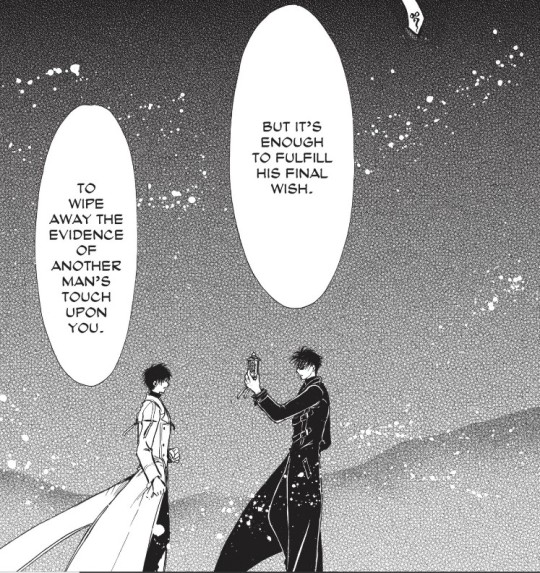
Wow, we get weird eye stuff and a dose of stalker possessiveness. 8D CLAMP outdid themselves. I can't even...
And as if that wasn't enough, we get this:

D-do I even want to know what that means? The context of this is incredibly bizarre. He’s talking about how Seishirou was upset another man hurt Subaru. The only person that’s been hurting Kamui is him.
Am I supposed to assume Fuuma wants to prevent anyone else from leaving any kind of mark on Kamui? Is that supposed to be a reference to an actual person? The only person I could think of is Subaru as far as who's been interacting with him, and I’m not actually sure that makes sense. 8D Is he talking about the original Fuuma? He’s jealous of himself? Or possibly even Kotori? Or am I supposed to assume Fuuma just wants to mark Kamui as his with another freaky eye exchange? CLAMP… Why…
Anyway, Subaru takes the eye because he’s been making a series of bad decisions and he isn’t about to let up now.
The next time we see Subaru, he has decided to do nothing, which is basically what he’d decided to do beforehand, only now he has Seishirou’s eye and is willing to watch events unfold. We see that there’s a little tension between him and Fuuma, which is… hardly surprising all things considered.

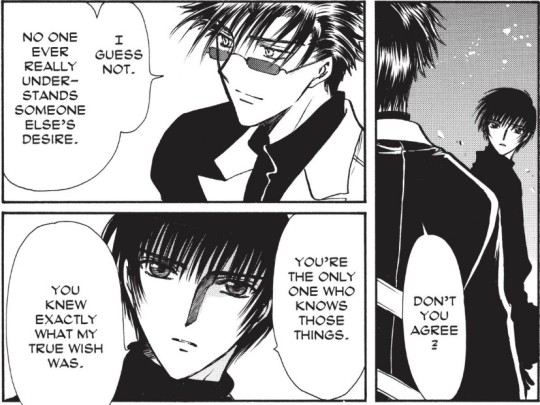
It’s interesting that Fuuma says Seishirou has been very selfish when it comes to Subaru. That would be pretty obvious to the audience, but Subaru is surprised by this assessment. Seishirou is preventing Subaru from achieving his “wish,” i.e. death and he’s also preventing him from connecting with other people. That’s the height of selfishness.
It is strange hearing this from Fuuma when he is being equally awful, however, which is probably why Subaru points out that wishes are something only Fuuma knows to begin with in what can only be described as an annoyed fashion.
We know Subaru has been on Kamui’s mind (a lot) and it looks like Kamui has been on Subaru’s as well.
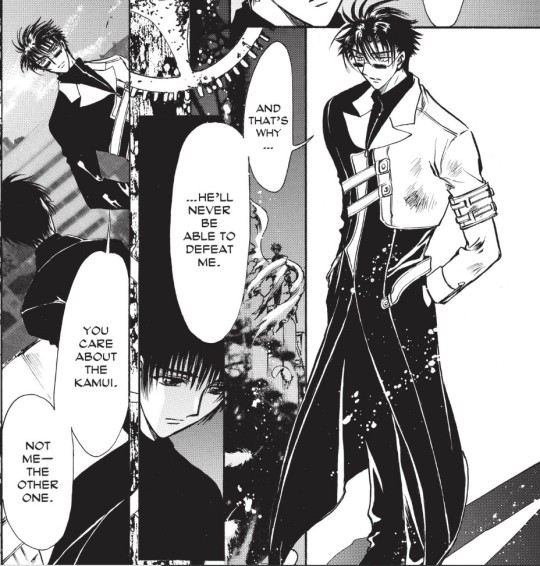
Subaru does care about Kamui is the thing, which is why it's doubly strange seeing him as a Dragon of Earth. He doesn't want Kamui hurt, but he claims he's not going to be involved. Can that really be the case if he genuinely cares about someone on the opposite side?
Interestingly, he avoids the subject. He's always been private when it comes to Kamui and it looks like that isn't about to change here, especially when he's talking to the man who has tormented him so much.
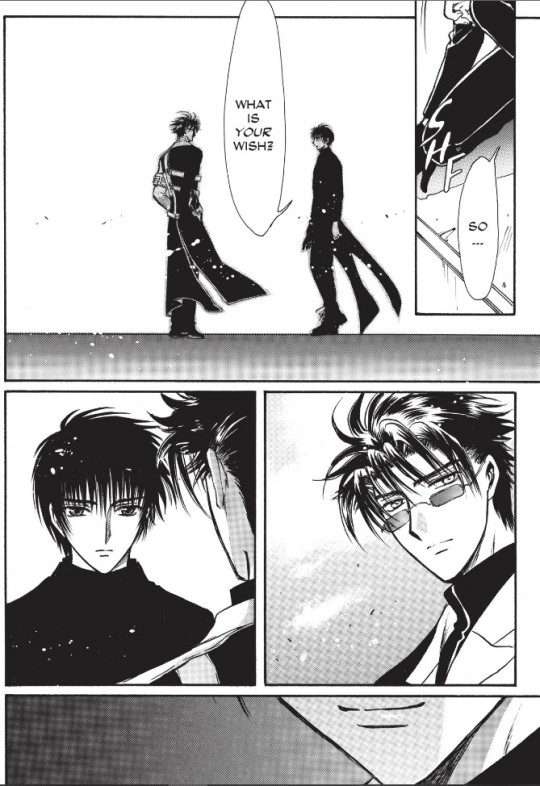
The next time Kamui sees Subaru is in the midst of battle with Fuuma and Kamui definitely feels betrayed.
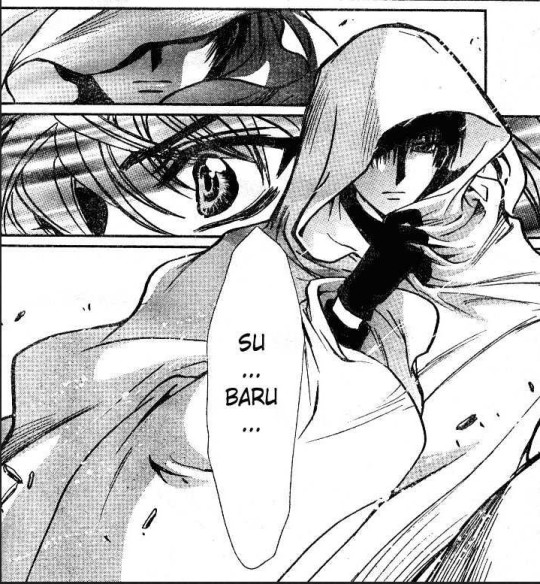
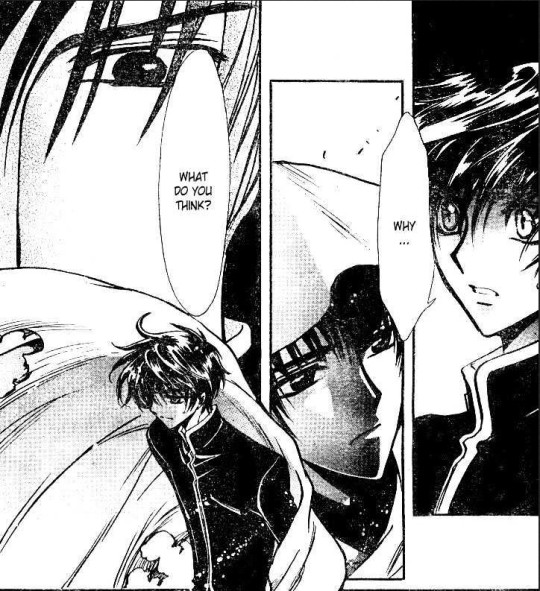
Subaru's presence here is a little strange and I think the only reason he's shown up at all is because he cares about Kamui, just like Fuuma said. He's not showing it in the best way, but...
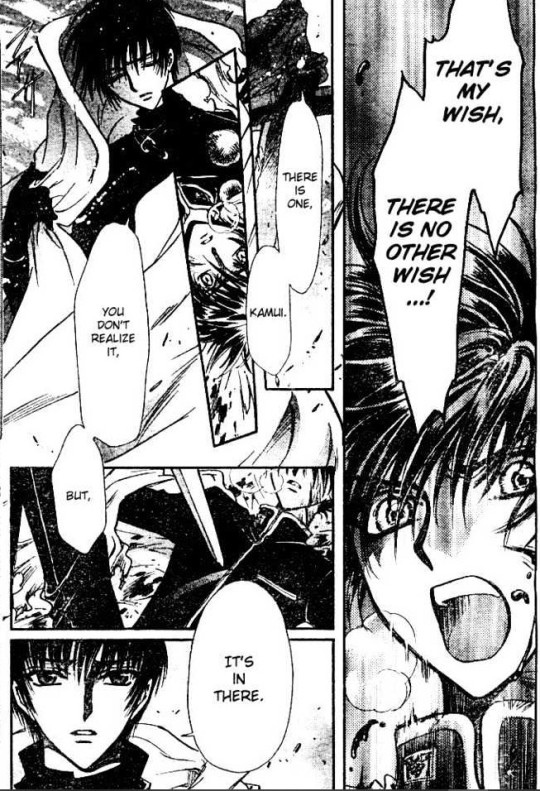
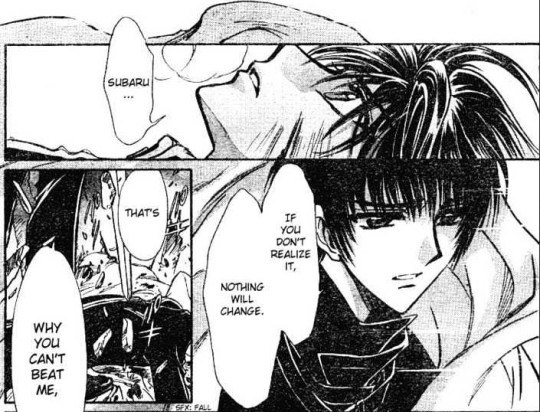
At long last, Subaru tells Kamui what he needed to hear ages ago and using the opportunity he's been given many times, but never used. Kamui needs to rethink some things and saving Fuuma isn’t what he really wants.
And the thing is, Kamui listens. The final chapter ends with Kamui remembering Karen’s words and finally trying to piece together what might actually be going on and it’s all because Subaru finally stepped in and offered an actual opinion. That's the level of influence Subaru has over Kamui and I'm still not sure Subaru has figured that out.
So, how would things have progressed with Subaru and Kamui after all this? Obviously, there’s no way to say for sure. If CLAMP wanted to draw the final parallel between the Subaru/Seishirou relationship and the Subaru/Kamui relationship, then it’s quite possible Subaru will die at Kamui’s hands. Another possible parallel is that one of them realizes they love the other, but only when it's too late. But the thing is, while there are parallels between these relationships, their differences are far more profound and these two never had the kind of relationship where one would ever want to kill the other.
Even with Subaru’s betrayal, I doubt Kamui wants to see harm come to him; he’s still looking to him for guidance and support. He no doubt wants Subaru to come back. It's what he's been wanting ever since he left.
Rather than Kamui killing Subaru, it’s much more likely Subaru would sacrifice himself for Kamui, possibly as his final wish. It’s also possible Subaru decides to rejoin the Dragons of Heaven because there really isn’t any reason he has to be with the Dragons of Earth? He’s not a fan of Fuuma, he has no attachment to the people there. He’s just there for the sake of Seishirou’s memory. Undoubtedly there would be some conversation(s) between Subaru and Kamui even with them being on opposite sides. This wasn't supposed to be the final battle; Kamui doesn't die here. For all we know, that sword Fuuma's been holding up for years never strikes Kamui; it could hit someone that flings themselves in front of Kamui or it could be blocked or any number of things. But it isn't the end.
Furthermore, there's still the matter of Kamui learning to make a kekkai. It would be very strange if CLAMP never gave him a reason to create one. The issue Kamui is having is that the people he wanted to protect in the world are already gone. He needs some other reason or person to create a kekkai. This means he needs to realize an attachment to a person he didn't realize he had. I'm just saying, Subaru is a good choice for that.
And like Kamui, I have to wonder if there’s anything out there Subaru would be willing to protect. The likeliest candidate is Kamui himself.
Now, I would personally like a much happier ending to this manga than I think we were likely to get, but whatever the ending, I don’t think CLAMP was going to drop the exploration they had going of Kamui and Subaru’s relationship. It didn’t dominate the series, but it also got a lot more focus than they needed to give it. It was important and it was unique and I think their bond could have continued to grow if the world had been a little kinder to them and if they’d both been willing to move on a little sooner.
And that’s all for now. This turned out to be very long. I will now proceed to content myself with writing more fanfic. 8D
#long post#x1999#x#subkam#ship manifesto#subkam ship manifesto#sumeragi subaru#shirou kamui#Bemused's post#This took so much time...#I really hope the pictures loaded in correctly 8D
210 notes
·
View notes
Text
when i was reading "emma" by jane austen in undergrad, one of my professors pointed out it's one of the best examples of a very common plotline: a willful child sets out as some sort of aberration from the status quo, and by the time they grow up at the end of the book, they've wound up reincorporated into the status quo.
in the case of emma, she believes that she knows romance better than society around her. she plays matchmaker according to what she believes is right. we are, at best, supposed to find her humorously wrong; at worst, she's a petulant child. her attempts at matchmaking go terribly, while she utterly and totally forgets to notice a man courting her throughout most of the plot. by the end of the book she's wound up marrying a good man of equivalent social standing, who courted her in socially acceptable ways, and is presumably going to settle down and become the good wife and mother that she was always meant to be.
persona 3 wasn't quite so interested in people who didn't fit in with the status quo, but persona 4 and 5 seemed to think they were hot shit for tackling the subject, while everyone and their grandmother pointed out that persona 4 and 5 started off with storylines that called society out on its bullshit, and then mysteriously rolled back its arguments in the later parts of the game. and i'm not trying to say that P4 and P5 didn't have doylist explanations for why they've got weird shit happening in the character arcs, but the more i think about it, the more it just sounds like emma woodhouse.
akira kurusu is wronged by the justice system, and comes to the conclusion that he must rebel against society. by the end of the game, it turns out that the justice system can be fair if you just work really really really really hard, so maybe we should all just work harder, and really you just need a good lawyer. akira is absolved of his charges through conventional status quo means.
yukiko amagi struggles with having her whole life decided for her. while she wonders whether or not she wants to stay in inaba, she ultimately comes to the conclusion that she will stay and run the inn, mysteriously and coincidentally choosing the societally-acceptable answer after all.
ann takamaki struggles with a society that simultaneously sexualizes her and shames her for exercising any sexuality. after ending kamoshida's whole career and making a resolve to embrace her own sexuality as an empowerment thing, she then decides to go into... modeling, in which she sells images of her body to be sexualized by an entire industry set up around sexualizing teenage girls. by surprising coincidence, it seems that she has decided to express her new openness to her own sexuality in a way that makes her extremely palatable to men like kamoshida.
kanji tatsumi winds up with a crush on a guy and struggles with being rejected for his sexuality. but then we are led to believe that really he just struggles with being rejected in general. and maybe he just doesn't like girls because they bully him. and maybe it's not really about him being gay, maybe it's about him being confused. also coincidentally, naoto is revealed to be a "girl," and kanji theoretically has had a crush on a "girl" all along, rendering the entire thing just a series of silly mistakes and coincidentally bringing kanji back into a semblance of heterosexuality.
goro akechi points out the innate corruption of the government, justice system, and extreme prejudice in japanese society that drives someone like him to the point of where he was, but his heel-face turn involves him deciding to submit himself to the very corrupt justice system that he disagreed with in the first place, pitching his cooperation with the status quo as a positive change.
naoto shirogane presents as a boy and goes out of his way to have others refer to him as a boy, but also by pure coincidence, we are led to believe that naoto was just going through some shit and was using gender identity/presentation as a weird coping mechanism, and "actually naoto was cis all along."
and these are all narratives that occur in conjunction with, like jane austen's emma, the typical coming-of-age story. an aberrant child doesn't fit in. an aberrant child grows up. an aberrant child winds up being reincorporated into the existing status quo after all, as they demonstrate to the reader hey, perhaps the status quo was right all alone, and i was the one who should have been fitting in.
the narrative of a "coming of age" story pitches adults as people who've adjusted to society and have been changed by society, rather than agents who change society around them; a "coming of age" story relies on a general consensus that children, teenagers, and minors in general have opinions and thoughts that are amusingly incorrect at best and completely invalid at worst, and it is the job of adults to tell children how to "be correct."
that works for some cases like, say, shinya from persona 5, who's a literal bully playing violent video games because his mom doesn't pay enough attention to him and picks on other children and steals their lunch money like shinya's personal day job is to be a tiny powerhouse of cliches. shinya could stand to learn that yes, he's fucking wrong, and no, you can't beat up other kids.
but the same logic—that kids are misguided and need to be corrected (or "rehabilitated," to use P5's words)—that same logic is what implies to us that akira's phantom thief rebellion is ultimately a phase that he'll grow out of as he reincorporates himself back into society, because it was "morally skeevy" (read: defined as morally skeevy by the law, which has no interest in anything but itself and its own power). the same logic of "kids are misguided and need to be rehabilitated" is what tries to tell us that kanji was just confused about himself and naoto's gender presentation, and that naoto was just going through a phase that “she'll” grow out of. "kids are misguided and need to be rehabilitated" is what allows yukiko the room to doubt whether or not she wants to take over the inn, but ultimately pressures her to accept the socially-acceptable option she was always meant to.
there's a lot of other characters that i could point to as examples of the "emma" trend. by the same virtue, there's a lot of character arcs that don't always quite fit the trend perfectly. but in general, the trend happens with alarming consistency in P4 and P5, as if the storylines are trying convince us that people and behaviors that do not fit with the assigned social script will ultimately "see the light" and realize that they should fit in with society after all. and if you see yourself in these characters, perhaps you too should think along the lines of these characters as they "grow up" into "good adults."
by allowing people to voice their discontents with the status quo, and then ultimately come around to embrace the status quo in the end, the characters are essentially used as strawmen to be conquered and brought back into the normative fold. and in theory, these strawmen will bring with them anyone who found themselves agreeing with yukiko's discontents, or kanji's queerness, or akira's anger at society. you had your teenage rebellion, the games seem to say. but now it's time to give it up, give in, and grow up.
159 notes
·
View notes
Text
The Crane Team: Part 3 - Sun Tattoo
In a conference room, ten chairs have been set up around a round mahogany table. The seven new clan chiefs, along with Nanami Sakurai and Yoko Uesugi, sat around it, facing each other and a screen that featured three high ranking former members of the Devil Clan who were teleconferencing in from behind bars.
Nanami Sakurai sat in a prim royal purple business suit, her hair up in a tight bun. Yoko sat next to her, her hair up in a high ponytail, covered from the neck down. When given the permission to speak, Yoko said, “The legal department has agreed to take up the cases for appeal. They’ve also agreed to weekly status updates on these. However, this will take significant staff away from regular duties. I would like to request a budget for emergency staff members to handle follow up and logging of reports.”
“How many people are we talking about?” A heavy set man rumbled, completely unconcerned. His head was bald save two tufts of hair over his ears. He smoked from a long Japanese pipe. He was Minato Ryoma, a business mogul specializing in real estate. He was the late Clan Chief Genichiro’s cousin and had quickly inserted himself into the vacuum left by his death with very little fuss.
“My primary objective is to reassure the defendants that Hydra will take their cases seriously. I will therefore hire 45 people. No more than 10 cases per employee.” Yoko replied. “Pay should be a sufficient living wage for Tokyo on its own so that they will not need secondary employment to focus on this task.”
Minato snorted roughly, his stomach bouncing under the table. “Preposterous. Our finances have barely recovered from this disaster and you want to throw away this much money for this project?”
“Our recovery is pointless if we are lax in pulling the Yakuza gangs together and another war break-...”
Sakurai silenced Yoko with a stern look.
Yoko sat back against her chair. “My apologies.”
“I will make sure that we do a full review of our budget and accommodate as much as we can to the effort.” Sakurai Nanami spoke quietly and dutifully.
“Genji Heavy Industries is still a wreck. The contractor’s we hired are over priced due to the scarcity of workers and materials. We must build the house before we invite other tenants.” Ryoma grumbled.
The other clan chiefs seemed to agree, nodding to themselves.
“Perhaps priority can be given to the breadwinners within the former Devil Clan so that some of the children currently in foster can be reunited with their rightful families.” The newest clan chief of the Inuyama clan, Inuyama Ren, was a surprisingly young man of 21 years old. His face was smooth and handsome and reminded Yoko a bit of Chance. He was Katsu Inuyama’s last remaining son. The rest had died in the fighting. Yoko couldn’t argue the practicality of his suggestion but he could certainly see objections in her eyes. “Does Ms. Uesugi have a response to this?”
“Yes… I do agree that this is a good suggestion. However, placement of Devil Clan children can’t all be with Devil clan members. Particularly if their actual families are alive. Parents should raise their children.” She said softly. “Furthermore, the youth of the Devil clan are the least responsible for their crimes and the more likely to suffer future effects. I believe the younger members should have a high priority as well.”
Minato huffed again, “Future…” He muttered.
Yoko’s nails squeezed her hands but the effect of such emotion dampening tactics was hampered due to her gloves.
From the speakers of the computer, one of the Devil Clan representatives unmuted themselves. “It has been demonstrated that the increase in violence of the Devil Clan were the result of illicit drugs being produced to enhance the bloodline. Before these drugs, while there were violent and dangerous hybrids, the population of berserker hybrids was not nearly as high as after these drugs were produced. The Clan Chiefs of the Hydra could be excused for thinking all Devils are going to die young but that wasn’t always the case. Even the rules stated that Devils could be imprisoned for up to 40 years with hope of release.”
Minato huffed but didn’t dispute this.
“We will run an analysis through the accounting department. I can’t promise 45 employees but making sure each temporary hire is paid enough to focus fully on the work is wise.” Nanami nodded her head.
The meeting dragged on to discuss politics. The mass slaughter and outbreak of violence had alarmed non-hybrid officials. They were pushing through an anti-Yakuza bill and needed immediate reassurance that such shocking events weren’t going to recur. Yoko scarcely suppressed a yawn as she struggled to listen. Her Japanese was phenomenal for having studied for such a short time but the details and intricacies of parliament still escaped her.
Her cell phone buzzed at her side and she peered down.
The message: “The Fuma child was rejected this morning. He’s back at the orphanage.”
Her eyes widened. Why? It had taken ages to finally place that child with relatives after a thorough search. He had been marked, improperly, as violent. He’d understandably acted out after witnessing the death of his family. She had been reassured and thrilled that he would finally be placed with his own clan! Yoko looked up at Nanami Sakurai. “I’m sorry. There’s an emergency. Excuse me.”
Without asking permission, Yoko got up from the table, bowed to everyone and dialed the number to the group foster home.
The placement officer over the children’s group hostel answered right away. “Hello?”
“It’s Yoko. What happened? I thought we resolved all concerns?” Yoko stood outside the door and then walked a few more steps to further conceal her conversation from the conference room. Outside the room, people were passing back and forth but most of them were on phones of their own. Half the corridor was blocked off with construction tape to repair an earthquake damaged wall, making things extra crowded.
“His bloodline isn’t the problem. The problem is he’s not Fuma.”
“Not Fuma? Then what is he? All his paperwork said Fuma!” She said, dodging passersby and trying to find a quiet spot.
“We don’t know. We don’t know why he would falsify his information…”
“There has to be a mistake. He’s eight years old. How can someone his age falsify information?” Yoko started walking towards the exit. “I need to talk to him. How is he?”
“Distraught but…”
“Of course he is…” Yoko broke into a jog. After the assassination attempt, she wasn’t allowed to leave the Genji building without an armed escort and armored car, but this was an emergency! “Excuse me, are you headed out?” She approached a couple of Executive Board members who pointedly ignored her. Even though she chose to believe they were already busy with their own tasks, most of the Hydra members still thought of her as Ruri Kazama’s woman and wouldn’t willingly help a former enemy.
“Look, I'll try to get there as soon as possible.” Yoko hung up and walked over to the information desk. “Hey I need to get a ride to the foster home. Is there anyone available?”
The woman behind the desk looked harried and brushed aside hair that had gone askew. “This is not a scheduled outing and currently there are no armored cars available…”
“When will the next one be back?”
“Probably not until four pm and that will depend on traffic.” She said with some regret.
“No, this is too important. Can we recall one?”
Her eyes widened in outrage. “Recall one? And what are we supposed to do with the person who’s actually there on-site?”
“I’ll take her.” said an approaching voice.
The secretary’s eyes widened and she stood up.
Yoko turned her head and looked into a familiar face behind thin rimmed glasses. “Crow!”
She hadn’t seen the man since he dropped her off at Genji Heavy Industries after the Cassell Team departed. She thought he had retired. Crow was the last remaining man on Chisei Gen’s original team. Both Sakura and Yasha had died during the Dragon’s awakening. Sakura was killed by Ruri Kazama. Yasha died blowing up Kaguya’s core in Genji Heavy Industries. The man looked a bit thinner than she remembered and he looked like he had aged with dark circles under his eyes.
He stood there in his usual trench coat and colorful shirt. “Are you coming or not?”
“Thanks.” She smiled gratefully and followed him out.
The sun was bright but there was a noticeable chill that heralded the onset of the fall season. Hydra members walking by were looking up at Crow in shock, doing a double take, just as surprised as she was to see him back.
Crow led her to a red sports car but didn’t hold open the door like a regular driver. He just stepped around to get in.
“Did you see everyone’s faces?” She laughed. “Where have you been?”
“Taking a long vacation.” He slid into the driver's seat. “Where are we going?”
“The foster home for the Devil Clan children. What made you come back? If anyone deserves retirement, it’s you.” She said, buckling her seat.
Crow didn’t respond but pulled into traffic. His expression was stony and his eyes were grim.
Yoko’s smile gradually faded. “Did… something happen?”
“No, nothing happened. Old habits die hard.” He pulled up to a stop light and they waited for it to change. After a pause, he added. “I never got to thank you for saving Sakura that day. At Tokyo Tower.”
Yoko looked straight ahead. Sakura Yabuki had used herself as bait to trap dead slave monsters at the top of the Tokyo Tower. Once they were nearly on her, she threw herself off the tower and let them follow her down. Yoko knew there was a rope dangling from the tower, where Fingel had saved himself from falling only minutes before. She had grabbed Sakura and the rope and watched the dead slaves continue their descent to the ground, a full 8 second fall.
Unfortunately, Sakura would die anyway.
“I just wish I could have done more.” Yoko murmured
“Believe me, we all do. Normally, I probably would have just committed harakiri after the young chief’s passing, but I got my old man to take care of. Meanwhile? Might as well come back here.”
The light turned green.
“Do you really still hold to notions like that?” Yoko asked with a cautious glance. “I don’t think that’s what Chisei would have wanted.”
Crow’s eyebrows flew to his hairline. “Woah, you two were on a first name basis?”
“Ah… I…” Yoko stammered.
“Ha. I’m teasing. I know you’re not from around here.” He gave a vicious grin however.
Chisei and Yoko had an inevitable conflict. She was a member of the Cassell Team, a devil and in love with Ruri Kazama, the leader of the Devils. He’d hurt her deeply by killing a man named Chance who’d fallen in love with her and fought his hardest to stay alive. The killing was brutal. She couldn’t like him. But at the same time, she couldn’t help but feel that, had circumstances been different, she and Chisei would have been friends. It was true that Yoko had always referred to Chisei by his first name and she couldn’t remember him ever objecting or correcting her.
Crow had likely noticed that long before now.
The orphanage was actually a juvenile correction facility set back off the road by two layers of guarded cinder block walls, manned sniper towers and armed guards at the gates. Once inside, a large building that appeared to be something like a multistory hospital greated her with an imposing cliff-like presence. Were it not for the playground out back with its colorful slides and swings, you would have thought it was a military facility.
Crow walked in with her as she signed in but she stopped him from entering. “Dressed in that trenchcoat, you’ll frighten the kids. I’ll be right back.”
The only memories Devil Children would have of the enforcement department were invasive interviews that asked probing and embarrassing questions. One wrong answer and they would be sentenced to death or eternal imprisonment. While the caretakers were kind to them, fed them and let them sleep in comfortable beds, at the end of the day, they were locked behind vault doors that were secured by heavy chains.
It reminded Yoko a lot of Black Swan Bay. Only these children weren’t controlled by a clapper sound. The influx of orphans after the Hydra’s devastating purge had left the facility staggering and in dire need of funds and personnel. So placing these orphans with families was a top priority of Yoko’s work.
Thankfully, Sakurai, Inuyama and Miyamoto threw open their doors and opened their arms to the orphans. Fuma and Ryoma however had little room in their hearts for these children. Many of their clan members were orphaned at the Red Well when the massive influx of those strange white filaments swallowed up the Fuma Ninjas who had been stationed in the forest to guard the area. Fuma was extremely hurt by the fact that the Devil Clan leader, Kazama Ruri, viciously humiliated the Kotaro Fuma. But with some cajoling Yoko had finally been able to persuade them to take this one child… but he wasn’t even a Fuma child in the end.
She stopped in front of a door and pulled the file from the slot next to it. The name Tatsuya Fuma was crossed out and replaced with “Unknown”. She knocked twice and opened the door.
The boy who, up until now, had been named Tatsuya Fuma sat on a small bed. His room was neat, with a red rug and a shelf full of small toys that had been donated. Mostly toy cars and one toy gundam action figure. There was a TV but it was off. Tatsuya’s face was flushed and sticky from crying.
“Hey…” Yoko approached quietly until she was halfway across the room and then knelt down on the rug. “Hey… what happened?”
The boy hiccuped and sniffled, his knees gathered to his chest. He stared blankly at the wall.
“You didn’t do anything wrong. It’s not your fault.”
The boy shook his head sharply, clearly and adamantly blaming himself.
Yoko knew better than to argue. “Then what did you do?”
He looked at her and shook his head.
“Are you scared?” Yoko whispered.
The boy nodded.
“Why?” She opened her arms and beckoned him over. “Here, come whisper in my ear.” Her frequent visits to this boy made her known and trusted. He knew how hard she’d worked to get him placed and they’d grown a bit close. Day after day, she’d visited with candy and toys and talked to him, reassuring him that she was on his side.
The boy got down from the bed and hugged Yoko around the neck. He didn’t know it, but Yoko always wore a wire on these visits. Sometimes when she was with them, the children would whisper to her the secrets of their trauma, bits and pieces that they’d seen and heard. Little by little, Yoko was building cases against certain cadres of the Executive Board.Given the overwhelming dominance of the Executive Board of Hydra, getting witness testimony directly was nearly impossible. No one would dare speak of the vicious attacks on them. Their killers were still alive and well.
Tatsuya hugged her so tightly around her neck she nearly gagged. He was warm and trembled like a puppy. His arms were thin but his grip was strong, like iron. She could feel every bone through his cotton shirt.
“Tatsuya died. They shot him in the wall.” He whispered, then he sniffed loudly.
“Who did?”
“The people with the sun tattoo.”
“So you took his name?”
“Yeah...they were trying to kill me. So I can’t use my name. They thought Tatsuya was me. So I am Tatsuya now.”
Tatusya was a real child, not a falsified identity! This boy had taken the dead child’s name to hide from people who were looking for him. She'd sent the wrong child to the wrong family! That family had to find out on the day their son returned to them, that their son was actually dead. Yoko’s heart felt like it fell into her stomach.
“Okay honey… okay.” She ran her fingers through his hair. “Don’t tell anyone what you told me. Okay? I’ll find somewhere for you to be safe. Can you whisper to me your name?”
“Mitsue Ryoma…”
Ryoma. No wonder he never admitted who he was. Ryoma hadn’t adopted a single child since the purge. Yoko always had a bad feeling about them. Their Clan Chief’s dismissal of her proposal this morning was just one of many. They’d opposed unification at every opportunity. She couldn’t place this child with them. “You’re very smart. Okay. You can keep calling yourself Tatsuya.”
Crow had walked outside to smoke while Yoko was in the facility with the kids. He took a deep drag of his cigarette and imagined the young chief’s arm around him, shoving the cigarette in his mouth and lighting it in a sudden show of uncharacteristic affection. It was a cherished memory that came back to haunt him every once in a while.
Even though the Young Chief never talked about that girl who now called herself Yoko Uesugi, he could tell she was never far from his mind. Especially after she rescued Sakura Yabuki. Crow would notice the Young Chief staring at his reflection in his sword. Sakura returned that sword to him and told him that Yoko had saved her life. It was odd behavior and for a long time Crow’d wondered why he would stare at his reflection like that.
The door behind him opened and the girl walked out, head down, hands in pockets. “Let’s go.” She grumbled and jogged down to the sports car and stood next to it, waiting for him to unlock it.
Her sudden change in demeanor surprised him. “Did things not go well?”
She didn’t answer him. She just kept her eyes down.
Once they were in the car, she pointed to the cigarette lighter in the dashboard. “Does that work?”
“Yeah. You want one of mine?” He reached into his pocket for a cigarette. Yoko, however, removed one of her gloves, revealing the clear scales on her hand, and pulled the cigarette lighter. She took the glowing red-hot cigarette lighter and pressed it to her own skin!
“What are you doing?” Crow shouted. He reached out and snatched the lighter from her, but the damage was done. That white skin was blackened and turning red at the edges.
Yoko cradled her hand to herself.
“It’s fine… it’s fine.” She whispered but she was cringing in pain. “Look.” She held out her hand to him. The burn was already starting to fade, rapidly healing thanks to her elevated blood.
“Don’t do that again! What’s wrong with you?” Crow shoved the lighter back into the dashboard.
Yoko didn’t answer. She just turned her head back to the entrance of the orphanage.
Crow massaged his forehead wearily. “What happened there?”
“I can’t tell you.” She ran her hands over her face and massaged her eyes.
“Why not?” He asked, looking down at her from his glasses.
She looked him up and down silently. “Do you have a sun tattoo?”
“I got lots of tattoos… sun’s not one of them.”
“Do you know anyone who does?” Quiet anger boiled beneath those dark eyes.
“Why are you asking?”
She let out a loud sigh and turned back to the window.
Crow sat back, resting his arm on the steering wheel. “Anywhere else you need to go?”
Yoko squeezed the fingers on her burned hand. “Can we go to the track?”
1 note
·
View note
Photo

Raybearer by Jordan Ifueko || ARC Review
Synopsis | Nothing is more important than loyalty. But what if you’ve sworn to protect the one you were born to destroy? Tarisai has always longed for the warmth of a family. She was raised in isolation by a mysterious, often absent mother known only as The Lady. The Lady sends her to the capital of the global empire of Aritsar to compete with other children to be chosen as one of the Crown Prince’s Council of 11. If she’s picked, she’ll be joined with the other Council members through the Ray, a bond deeper than blood. That closeness is irresistible to Tarisai, who has always wanted to belong somewhere. But The Lady has other ideas, including a magical wish that Tarisai is compelled to obey: Kill the Crown Prince once she gains his trust. Tarisai won’t stand by and become someone’s pawn—but is she strong enough to choose a different path for herself? With extraordinary world-building and breathtaking prose, Raybearer is the story of loyalty, fate, and the lengths we’re willing to go for the ones we love.
REVIEW
*Thanks to Amulet Books and Hear Our Voices Book Tours for this advanced copy in exchange for an honest review. Any quotes included may change in final publication.*
Eleven danced around the throne, Eleven moons in glory shone, They shone around the sun.
But traitors rise and empires fall, And Sun-Ray-Sun will rule them all, When all is said-o, all is said And done-heh, done-heh, done.
I’ve been drawn to fantasy stories for as long as I can remember and they’ve been my coping mechanism to escaping the real world ever since. Raybearer grabbed my attention the moment it crossed my radar, not only marked with a Black girl with an afro on the cover that mirrored my own staring back at me, but with the promise of a journey that enticed from the opening line of the pitch. I should have known from the first mention of fairies in an African fantasy environment that I would be in for a beautifully wild ride.
My mother was the devil, and I, her puppet demon.
One of the elements I love most about fantasy is the world building and this one did not disappoint in the least bit. Aritsar is such a richly developed place, full of traditions and culture that leaped off of the page. Everything is so beautifully described and I could tell a lot of care went into crafting even the tiniest details in every corner of the kingdom. It made my heart so happy to read Black characters in experiences that I rarely see in fantasy novels, like the braiding party and being attended to and adored while holding positions of the throne. I also appreciated that there was a glossary and character appendix attached along with a pronunciation guide, which helped with all of the cultural references throughout the story. Stories with these influences have always been fascinating to me, even more when they also turn into learning opportunities. The core of the story for me was following this newly annointed council and the strength of their bond over time. Each member, though we don’t spend time with all of them equally as the four that take center stage, brings something different to the table and is well developed in their own way. I fell in love them immediately upon introduction and became even more attached with every turned page. You could feel the connection from the beginning with each interaction and how being separated in any capacity resulted in a bout of "council sickness," which I thought was a beautiful way to further demonstrate the importance and necessity of their bond. Accompanying them through their training process and becoming a family also helped with the attachment to their characters because I wanted to protect them at all costs, knowing what conflicts were at stake. The other characters were just as strong, which really speaks to Ifueko's writing. Some of their actions were questionable, but the more time I spent with them, I could see how they might have been led down that path and I could sympathize to some extent - especially when it comes to The Lady. My attachment to Tarisai definitely led to her being on the villain list (and just the basis of the plan, to be completely honest), but as the story went on, she started to give off Killmonger vibes. Information revealed along the way suggests that there was reasoning behind her plan, but there were definitely better avenues to achieve her goals (and maybe not involve innocent children! 🙈)
“The place closest to your soul isn’t your heart,” Kirah explained. “It’s your stomach. Anger, love, and sorrow simmer together there, like bubbles in in a cauldron. People of the Wing believe that when the Pelican breathed each soul into being, it wrote two secrets on a burning coal: your greatest good and your best desire. You swallowed the coal before being born, and it burned in your belly. That’s why we wail as newborns, Mama would say.”
Ultimately, the thing I took away from this aside from the relationships and the adventure was the focus on names and purpose. I love a good personal journey story and following Tarisai on hers, as well as the other characters at play, was no different. From the very beginning growing up in Bhekina House to her time growing with the Council in An-Ileyoba, Tarisai is both catching up on everything she’s missed from isolation as a child to finding herself as an independent identity from that of The Lady. She also had and provided plenty of support in her council siblings as they too grew into the identities. I also appreciated that this touched on the idea of carving your own path at various points within the novel. There are so many instances when you can see the characters fighting inner struggles to write their own stories apart from inside and outside influences - sometimes both - and I think that’s a very important lesson to get across for anyone.
"I am Tarisai of Swana," I murmured, "and I've seen your stories now. They belong to me, as mine belong to you. You don't have to help me change the world. But you mark my words; when I get going, this world will change. And you can be a part of that ... or you can stand back and watch."
I don’t think there are enough words to express how much I enjoyed my time in the kingdom of Aritsar. Along with an adventure that doesn't let up and themes of loyalty, familial bonds and purpose, the story also blends important topics like colonization and patriarchy into a beautifully written epic that I was sad to see end. I already miss this world and can’t wait to return back to follow Tarisai and her council siblings for even more adventures.
Rating | 🌟🌟🌟🌟🌟 Goodreads
#raybearer#jordan ifueko#charles chaisson#ya fantasy#african folklore#arc review#book review#book tours#black authors#black women authors#own voices#booklr#bookblr
16 notes
·
View notes
Text
Hidden in Plain Bite
CW: snakes, snakebite, animal attack Over tree roots, around puddles, and through vibrant red and purple foliage, Beck made his way through the dense jungle with the rest of the crew. They were on a mission to document the Khugnoin nation’s traditional stories and cooking practices. The Khugnoins had fought back against the Clandek invasion of their planet, and they and the other nations of their world had managed to repel the invaders. They’d decided they wanted more of their culture documented so that the descendents of those who’d fled the planet could be connected to their heritage. Dr. al-Amin had worked closely with the nation’s magistrates and with a local anthropologist to plan a series of videos, and today they were going to record them.
If they ever made it there. There hadn’t been a landing spot big enough for the da Vinci near the Khugnoin village, and they’d already been walking almost an hour. Beck was considering asking the doctor if she was sure she wasn’t lost when the trees parted and the crew emerged facing the Khugnoin village.
The village was high in the trees, wooden and leather structures built around massive trunks and connected by bridges. The people themselves were well-camouflaged, despite being in the open, covered in downy feathers that were the same purple as some of the jungle’s darker plants. It was easy to see how the Clandek had underestimated them: they were shorter than humans, and they had feathers like baby birds.
“Oh my gosh, they’re cute!” Valentina squealed.
“They’re valiant fighters who defended their planet from an invasion,” Dr. al-Amin pointed out. “And more importantly, they’re people. Be respectful, and don’t patronize them.”
Valentina nodded.
“Right. Sorry.”
The Khugnoin magistrates were already on the ground and ready to meet the crew, as was the human anthropologist who’d been getting to know them and learning their language. She translated between the magistrates and the crew. The Khugnoin language was beautiful, but even though Beck tried to listen for words that might be similar to languages that he knew, he couldn’t make heads or tails of it. After introductions, the locals led the crew up to one of the houses, the crew set up the cameras, and the interviews started. Despite not being able to understand their words, Beck could tell that the Khugnoin storytellers were passionate about this project, telling their tales with dramatic tones and expressive gestures.
After a morning of filming, they took a break for lunch. The crew had brought rations with them, but their hosts insisted on treating them to a dish made from boiled strips of the bark of a native tree and covered in a savory sauce. It was kind of like Terranovan peanut sauce over noodles, or Istolian groundbean paste with strip squash, Beck thought. The anthropologist explained that there were quite a few things on this planet that were poisonous to humans and Fyreans, or simply foul tasting, and the Khugnoins had put a lot of research and thought into what to prepare for their guests.
“Please thank them and tell them we appreciate the work they’ve done,” Beck said. “This is delicious.”
She passed on his message, and their hosts smiled and said a phrase to the anthropologist.
“They’re saying ‘you’re welcome,’ but formally,” she said. “Literally translated, it’s a blessing from the goddess of hospitality.”
Beck had never been religious, but he still felt touched at the blessing.
“That’s very kind of them.”
After lunch, the doctor suggested they split up and have someone get footage of the village while someone else filmed the rest of the interviews and the cooking demonstration. Beck volunteered to walk around with a camera, and Valentina and KS-7 came along.
The Khugnoin children lacked the formality of their parents, and before long a whole group of kids was gathered around the camera, making faces into it and waving. Beck couldn’t communicate through words, but he kept his body language inviting and his tone light and even made a few silly faces of his own. The kids were fascinated by KS-7. They had mammal-like animals on their planet, and they’d seen machines, but a robot marmoset was something new and exciting. Valentina plopped down on the platform they were on and let them touch him.
“We’ll probably need their parents’ permission to put that in the video, but I think we’ve gotten some good shots,” Beck said to Valentina when it seemed like the kids were starting to lose interest. “How about the surrounding area?”
“Sounds good, as long as we don’t get lost,” she said.
“Nah, we won’t go far.”
They traveled around the village, getting footage from a few different angles.
“What about a shot from the ground?” Valentina suggested. “Like where we first came out of the jungle and saw it?”
“Good idea.”
They made their way back down to the jungle floor and spent a few minutes recording from there. KS-7 hopped between tree branches, exploring.
The robot froze.
KS-7 was face to face with a snake, a red-scaled, beady-eyed creature that was staring him down.
He leapt away, and the snake struck out, missing the little marmoset. He scrambled up to Valentina’s shoulder, but the snake followed. Beck grabbed a stick from the ground and rushed towards her.
“Get off! Leave him alone!” Valentina yelled.
The snake struck again, sinking its fangs into Valentina’s arm. She screamed. Beck got the stick under the snake and launched it into the jungle, where it seemed to decide its prey wasn’t worth the effort and slithered away.
“Val! Are you okay?”
Valentina slumped against a tree, breathing hard and staring wide-eyed at the bloody punctures in her forearm.
“It hurts. Do you think it’s deadly?” she asked.
“I don’t know,” he said. It could be harmless, it could be deadly, or it could be somewhere in between. “We need to get you to the medi-pod.”
“That’s an hour away,” she said. “I don’t know if we can make it there in time.”
“Then we’ll have to see if the locals can help.”
Beck wrapped an arm around her and helped her stand. She leaned on him for support, stumbling as they made it back towards the village. KS-7 followed behind on the ground instead of in the trees.
“Come on, Val, you can do it. We’re gonna make it.”
When they were within earshot, Beck called up to the people in the trees:
“Help! Please, help us! Help!”
Even if they couldn’t understand, surely they would hear the desperation in his voice?
A few Khugnoins looked down from their bridges and houses, and they called to each other something that Beck couldn’t translate. A few minutes later, several of them were down on the ground, carrying a stretcher. Valentina nodded and let herself crumple down onto it, and the people-- the medics?-- carried her towards a pulley platform. Beck stayed with them, holding Valentina’s hand.
“You’re doing great. We’ve got you,” he said softly as the pulley lifted them into the village, and she squeezed his hand but said nothing. Her eyes were closed, and she looked pale.
The medics carried Valentina to one of the houses, where there was an array of plants in pots and herbs drying in the window. A Khugnoin woman waved them inside, and Valentina was laid on a pile of blankets. She was still breathing hard and fast, and her face contorted in pain. Beck didn’t let go of her.
The woman-- the doctor?-- looked at the punctures, which had already turned the area around them red and swollen. She turned to Beck, letting loose a series of syllables that clearly meant something. She seemed worried, and that was a bad sign.
“Um…” Beck made a slithering motion with his hand and hissed to indicate a snake.
The woman nodded and gave him a look that said that she’d definitely gathered that much already. Of course she had; it was clearly a snakebite. She repeated the question, and Beck ran a hand over his head in confusion.
“Valentina!” Captain Clay burst into the room with the anthropologist. Sett and Dr. al-Amin were at the door, looking inside nervously, as were a few Khugnoins. Alexa had her arms folded over her chest and looked serious.
The Khugnoin doctor said something quickly to the anthropologist, who turned to Beck.
“She needs to know what kind of snake it was and how long ago the bite happened. That will affect what kind of antidote she needs.”
Okay, that made sense.
“It was a red snake with a roundish snout, about this long,” Beck said, holding his arms apart to indicate the size of the snake. “And it happened less than ten minutes ago.”
The anthropologist translated, and the Khugnoin nodded and got to work crushing up fresh leaves, adding some liquid from a wineskin-like pouch, and grinding little pods that looked like fish eggs. The resulting mixture stank horribly, but if it was effective, Beck wasn’t going to judge it.
The Khugnoin administered the medicine to Valentina through the inside of her nose and under her tongue. Beck wasn’t a medical expert, but it seemed like that was a good way to get something into the bloodstream quickly. Valentina gagged at the smell, and Beck couldn’t blame her.
The Khugnoin doctor said something to the anthropologist, and there was a bit of back and forth between them before the anthropologist turned back to Beck.
“She’s going to continue to care for your crewmate, but she needs us to leave. She’s going to do…” She thought for a moment. “Well, prayer isn’t quite the right word, but neither is magic. It’s part of their religion, and they don’t want to share it with those who aren’t members of it.”
“Is she going to be okay?” the captain asked.
“I don’t know, but I trust the people here to do their best.”
“Be safe, Valentina,” Beck said softly, giving her hand a squeeze before letting go.
When they were all outside, KS-7 clung to Beck’s leg and let out a whimper. The captain leaned back against the bridge railing with his hands in his pockets.
“What happened?” he asked.
Beck sighed and rubbed the back of his head.
“We were filming from the ground, and KS-7 had a run in with a snake. It bit Valentina, and we didn’t know if it was deadly, but we didn’t think we could make it back to the ship in time to get her in the medi-pod.”
“That was a good call,” Sett said calmly. “She’s very weak already and in quite a bit of pain.”
Right, the empathic stuff. Beck just nodded.
One of the Khugnoin magistrates told them, through the translator, that they were welcome to continue work on the filming, or to stop for the day. No offense would be taken either way. He also said that if they wanted to spend the night, accommodations would be made available.
“Am I right in saying they’d be willing to find a place to put us up, but would rather not?” Dr. al-Amin asked.
“Yes, that’s a fair assessment,” the anthropologist said.
“Then let’s do the cooking demonstration tonight and go back to the ship to sleep. We can finish up the narrative project tomorrow.” Her voice was matter-of-fact in a way that bothered Beck. “Of course, the final call is yours, captain.”
“You mean leave Valentina here overnight? Alone?” Beck asked.
“She’s not alone. She’s in capable hands,” said Dr. al-Amin, hands folded in her lap. “And I’m sure she would want us to complete our mission.”
Beck looked back at the house where they’d left Valentina. He’d only known her a few days, but he didn’t want to leave her alone like this. He especially didn’t want her to die. This was awful, feeling helpless to do anything and having to leave her in the hands of total strangers.
“I’m worried about her, too,” said the captain. “But you’re right, doctor. I think the best thing we can do is trust our hosts and wait. It might be the only thing we can do.”
Beck sighed.
“All right,” he said, looking back at the group.
The food the Khugnoins were cooking for the video was one of the dishes that was poisonous to humans, so they didn’t share it with their guests. Instead, they offered them a platter of fruits: a creamy, opaque fruit with a citrusy smell, a cluster of yellow berries that tasted bitter like dark chocolate, and a juicy, fleshy, pink fruit with a tang. Beck would have enjoyed them more if he hadn’t been so worried. He was always up for trying new things, but Valentina had been with the Khugnoin doctor for a few hours, with no word on whether she was recovering.
They made the hour-long trek back to the da Vinci, with KS-7 clinging to Beck and making sad noises, and Beck still couldn’t shake his worry. That night in the sleeping quarters, he hardly slept at all. What if the antidote didn’t work? What if it and the sacrament were just superstitions, a placebo at best? What if it worked in Khugnoins, but was toxic to humans? What if they hadn’t gotten Valentina there in time? What if the snake came back to finish the job? Okay, so that last one was a little far fetched. But still. There were a lot of things that could go wrong.
By morning, his mind had been around in so many circles, with no answers in sight. Breakfast was rushed and quiet. The crew made it through the jungle, back to the Khugnoin village. When they arrived, the magistrates invited them up to the house where Valentina had been treated.
The Khugnoin doctor welcomed them inside. An earthy, herbal aroma hung in the air, dense but not oppressive. There, on the pile of blankets, Valentina lay asleep. Her hair had been taken out of its braid and brushed, her face was clean, and there was a bandage wrapped around her arm where the snake had bitten her. She looked peaceful.
KS-7 clambered down from Beck’s shoulder and curled up next to Valentina.
The Khugnoin spoke through the translator: “She had a rough night, but she made it. She’s going to survive, and while she might feel tired more easily for the next month or so, she does not appear to have lasting damage.”
“Thank you so much for saving her life,” Beck said.
“Your gratitude is appreciated, but the credit goes to the gods.”
Beck nodded respectfully.
They let Valentina sleep so that she could continue to heal while they finished filming. Beck wasn’t as anxious as he had been yesterday, but he was still a little antsy, still eager to get going. It was just part of life, wondering if he’d overstayed his welcome, He was used to being ready to see what was next, to needing to keep moving. You couldn’t stay in one place too long; that’s when things got messy.
The crew wrapped up filming the storytelling before lunchtime, and soon they were ready to be on their way. They went to get Valentina, who was still asleep.
Beck knelt down next to her and placed a hand on her shoulder.
“We’re ready to go, Valentina. Time for you to wake up.”
She stirred and rolled away from him, and KS-7 peeked out from the blankets. .
“Five more minutes,” she grumbled.
“Come on, Val. We’re not gonna leave the planet without you, you know.”
She sat up and blinked.
“I’m alive. Holy shit, I’m alive.”
She threw her arms around Beck, and Beck returned the embrace.
“Yep. We were worried for you, but the locals knew what to do, and.you pulled through.”
She leaned back.
“That’s great! I mean, not that you were worried. The rest of it.”
“I knew what you meant,” Beck said with a chuckle, standing and offering her a hand up.
She took it and managed to stand. KS-7 hopped up onto her shoulder, taking his usual spot. Valentina hugged each of her crewmates, except Alexa, who refused. She also offered a hug to the Khugnoin doctor, who politely declined, and the anthropologist, who accepted.
With their mission complete, the crew made their way back through the red and purple jungle to the da Vinci. As they ascended into the vastness of space, Beck watched the stars shift around the relatively tiny ship, eager to see where their next adventure would take them.
4 notes
·
View notes
Note
(Chantry Asker) I don't defend the Chantry because I think is "has to be good", but part of what Dragon Age encourages us to do is consider the difficulty faced by well-intentioned factions. The Inquisition, for example, has problems, becoming vulnerable to infiltration, and depending on how you played the game, may have done worse. It's not easy to help people, but the Chantry TRIES. Many Thedosian groups don't even do that. If not the Chantry, then to whom do the downtrodden and hopeless turn?
But Anonymous person: this is exactly what I mean. Whence comes this desire to treat the Chantry like some kind of beleaguered, underfunded kindergarten teacher?
“She’s trying, okay? She’s trying.”
Do you feel the need to defend Mass Effect’s Cerberus, too? Sometimes an evil organisation is just an evil organisation.
Why on earth do you think the Chantry is ‘trying’? Again: absolutely no one is saying that a particular revered mother (or Chantry brother or sister) may not be a good person who attempts to help people. That’s not in question. But ‘the Chantry’ is a continent-wide political organisation with massive resources and influence. It is led by a divine and by grand clerics, and on the other side by lord and lady Seekers and by knight-commanders of the templars. It has shaped the world. That’s the scale we are working on here.
No one group in history has impacted life in Thedas more than the Chantry. The influence of this church of the Maker prevails across most of the continent’s kingdoms, and the bulk of humanity pays at least lip service to its tenets. Belief in the Maker has started wars and forced those outside the Chantry to the fringes of society.
– The World of Thedas Volume I
So that’s a good start.
"The Keepers, Shaperate, Qun, Augers, Seers, and Shamen don't help. Only the Chantry.”
That’s one of the first things you said to me. And it’s so confusing because ... it reads like you really don’t grasp that these people are not in Lothering because, largely, they have been driven to the margins by Orlais and its Chantry. They can’t be there. They would die.
Just as an example – can you imagine what would happen to an augur who set up in some Chantry-dominated village? Started summoning his gods, offering guidance and assistance, suggesting spirit possession to help training young mages? The poor bastard wouldn’t live out the day. But that wouldn’t be his fault. His people aren’t the ones practising religious persecution.
How – how – does that demonstrate the virtue of the Chantry? You can’t give someone points for being the only game in town when they’ve killed all the other players.
The Chantry began and has continued to be a predominantly human organisation. Other races are seen to be further from the Maker. The elves have their false pantheon of idols. The dwarves worship themselves. The Qunari are the worst of all, actively crushing worship of the Maker and desecrating Chantry values in the name of the Qun.
– The World of Thedas Volume I
They have built the racism right into their doctrine, so that’s nice. And the religious persecution. And just ... zero self-awareness in that they hate the Qunari for converting by force when they do the same thing.
But let’s think about your "downtrodden and hopeless”, shall we?
Why is it that most of the elves in Thedas live in abject poverty, and regardless of their skills are effectively barred from bettering their lot? Oh, that’s right. Because the Chantry invaded their homeland, stole it from them, and forced them to live in slums and convert to the Chantry faith.
But you already know that something went wrong. A small elven raiding party attacked the nearby human village of Red Crossing, an act of anger that prompted the Chantry to retaliate and, with their superior numbers, conquer the Dales.
We were not enslaved as we had been before, but our worship of the ancient gods was now forbidden. We were allowed to live among the humans only as second-class citizens who worshipped their Maker, forgetting once more the scraps of lore we had maintained through the centuries.
– The City Elves
Why is it that most mages are dependant on Chantry run Circles to house, feed and clothe them? Oh, that’s right. Because the Chantry kidnaps them as children, prevents them from inheriting their family titles and property, and steals their children in turn should they have any.
Chantry law requires those with significant magical ability to join the nearest Circle and live under its supervision. While Thedosians with extremely low levels of magical talent are generally permitted to go about their lives, they are still closely watched. In most nations, practising magic and not joining a Circle is to be branded an apostate and, thus, a danger to society. Those who survive capture are turned over to the Circle to become students or prisoners, depending on the circumstances.
– The World of Thedas Volume I
So that’s ... pretty great. It sounds as though you’re suggesting – best case scenario – that the Chantry should get points for setting up a soup kitchen for the homeless, when they were the ones who burned down those people’s houses. And built an ugly mansion on the land.
But that really is a ... best case scenario. It doesn’t really fit with the reality of how the Chantry operates. I mean: the Chantry takeover in Kirkwall was a fucking disaster. Meredith had death squads. I mean – death squads. That whole situation was a dystopian nightmare.
And then there’s whatever the fuck is going on in Tantervale:
Chantry law is all but absolute in Tantervale, earning the city its dour reputation. The city guard is obsessed with enforcement. A street urchin would get a year in the dungeon for something that would get him a pat on the back in Orlais.
– World of Thedas Volume I
So ... yay for theocracy? And then there’s the clusterfuck in Jader:
The overpopulation and poor living conditions led to an outbreak of disease that nearly crippled the city, followed by famine in the poorer sections when it was quarantined.
Mother Giselle, whose prosperous chantry was in a wealthier quarter, wrote to Val Royeaux asking for assistance from the Chantry. When help was not immediately forthcoming, it is said that she addressed the clerics of her chantry. “As Andraste herself said, ‘My faith sustains me; I shall not fear the legion,’ then so shall faith sustain the hungry in this time of need,” Giselle told them. “As we have devoted our lives to divine contemplation, such a diet should come to us quite easily.” With that she took the unprecedented step of taking all of her chantry’s food into the poor quarters of Jader, distributing it to peasants who would otherwise have starved to death.
Shocked and shamed by what some in Val Royeaux privately referred to as an ostentatious bullying tactic, Chantry officials coordinated relief efforts. Food arrived quickly, along with instructions on how it was to be distributed: first to the Jader chantry to end the hunger strike, then to the Orlesian peasants, then to the Fereldan refugees, and finally to the elves of the alienages. Mother Giselle famously replied to the orders by saying, “If we believe that some have fallen further from the Maker’s grace than others, then those who have fallen further are in greatest need of our care. We cannot fill their souls until we have filled their bellies.” With the support of Lady Seryl of Jader, who was directing relief efforts of her own, Giselle ignored the directives and fed the poor of the city without regard for race or nationality.
Her actions saved thousands of lives in Jader and made her a beloved figure among the poor in Orlais and Ferelden alike. Those actions also destroyed her chances of any official political advancement in the Chantry, as the grand clerics did not look kindly on being shown up in such a manner.
– World of Thedas Volume II
So, five important points here:
1) Mother Giselle’s actions are ‘unprecedented’. So stepping up like that and forcing the Chantry to give aid in a time of crisis is not actually standard practice.
2) This is a clear example of a person attempting to do good and being stymied by the Chantry hierarchy.
3) The Chantry is, in case anyone forgot, really fucking racist.
4) Ending a famine also ended this woman’s political career, because the Chantry just cannot stop being The Worst.
5) While Giselle is undeniably doing some really awesome stuff here, that bit about not being able to fill people’s souls before filling their bellies indicates that even good people tend to do harm when following Chantry doctrine, because they can’t just ‘do good’. They’re also pushing conversion.
Whenever and wherever the Chantry has real power, they tend to do terrible harm. They do it on such a scale, on such a level of ‘these bloody hands may never be clean again’ awful that ... a few acts of kindness can’t easily redeem them.
To be critical of the Chantry, I don’t need to have another option. I can critique a thing without going further – especially since ‘The Chantry killed everyone else’ is ... pretty much why other people aren’t around to help. But ... it really isn’t as if no one else knows how to do good?
I mean – look at Alistair. Assuming you made him king, he shows up with ships to bring the Fereldan refugees home, and offers aid to rebel mages. He fights with Meredith about it. That aid continues into Inquisition. While the Chantry is busy tearing Kirkwall apart, Alistair is helping. Anders runs a clinic for the poor and dispossessed in the Kirkwall sewers. He’s so damn popular that a mob turns up to defend him. That’s just one man. Most people like him are locked up, so they can’t help. Imagine a thousand clinics run by spirit healers.
Or ... did ... no one listen to Merrill?
Merrill: What does your Chantry do? I mean, you keep saying how great it is. Anders and Isabela tell me to stay away from it. But what does it do? Among the Dalish, the Keepers teach the children, preserve our history, perform magic. The priestesses here just... sing.
Sebastian: The Chantry does many charitable works. It cares for widows and orphans –
Merrill: Who in the Dalish would just be part of the clan, like everyone else. I just don't get it.
...
Bethany: So, there's no Circle among the Dalish?
Merrill: Any child with the gift of magic is apprenticed to a Keeper... in another clan if there's no need in her own.
Bethany: That sounds nice.
Merrill: Magic is a gift of the Creators. Why wouldn't we use it? It just seems... wasteful for humans to lock their mages away where they can't do any good.
– Merrill Dialogue
The Dalish would regard ‘charity’ as a communal duty, and magic as a tool to help people. She’s not wildly impressed by the Chantry, which is not doing enough good of any kind for her to notice. Merrill lives in one of the poorest parts of the city. So. Maybe her way might be worth a try?
Individuals can do good. Organisations can do good. These things are not in question. But the Chantry is – and I say this again – an imperial religion. Its primary function is to serve the Orlesian empire, which is racist, power hungry and deeply religiously intolerant. Empires are bad news.
I’ve seen the examples you’ve given. They exist. Some of them are real instances of a Chantry official, or a small, local chantry, doing a Good Thing. But I have to ask ...
Can you really look at a set of scales that has ‘genocide’ on one side and ‘helped out a single mum that one time’ on the other and say “Sure, that balances”?
154 notes
·
View notes
Text
Black Widow
Fandom: Naruto Rating: Teen Genre: Angst Characters: Rin, Obito
Rin was Obito's best friend. Always there for him with a smile and kind words, no-one ever doubted her intentions towards him. Maybe someone should have done. Canon-verse, dark!Rin.
Listen, Rin, her mother once told a four year old girl with a smile on her face that didn't match with the blood on her hands. To be a kunoichi is to be a queen of deception. Pick your target, groom them and wait until the time is right. Once they've outlived their usefulness, dispose of them and move on.
Four year old Rin had looked down at the broken and bloodied body of the man that had once been her father and nodded.
Pick your target.
She didn't have to do it so young. It didn't matter if she waited a while, until she was old enough to successfully ensnare a target into obeying her every whim. That was what she told herself until the day she met a boy with dark hair and eyes, but still shone as brightly as the sun.
Uchiha Obito, orphan but still part of the illustrious Uchiha clan and a latent talent to match. Supposedly. Watching him squawk about being Hokage even as he fell out of a tree made it a little harder to believe – even if Rin knew few children their age that could even climb that high in the first place.
"Hi!" he said, bounding over to her and almost tripping over his feet in his haste. "I'm Uchiha Obito, what's your name?" Ridiculous goggles pushed up onto his forehead, he grinned brightly as he offered a handshake while his other hand rubbed the back of his head sheepishly.
"Nohara Rin," she offered, matching the smile and clasping his hand in both of hers, watching pink bloom across his cheeks. "Are you training?" He nodded frantically, immediately launching into a garbling mess of a conversation that was supposed to tell her how amazing he was going to be. Another girl could well have been bowled over with admiration for his dedication and self-belief.
Rin felt nothing but a burning hatred for a bumbling fool.
Target acquired.
Grooming was the hard part, especially as she'd started so young, or so her mother told her upon learning she'd already selected her target. Young as they were, it would be years before she could properly use him, and so slow and steady was the mantra Rin implemented.
The end game was an utter dependency on her, so much so that once his use expired he wouldn't even question the poison in his drink, the kunai whispering across his throat, or whatever other method Rin eventually decided upon to eliminate him from the shadows.
Her mother had never so much as been suspected over her father's death, after all.
Obito did not fall easily. Rin had thought the fool would be easy to wrap up in threads, but as soon as she thought she'd done it, he'd slip away again. Kind words whispered in his ear, exclamations of astonishment as he did things far beyond the abilities of someone their age group built his ego, but while they manipulated Obito into seeking to impress her further, they did nothing to tame him.
Others were starting to notice him. A katon jutsu performed in front of a panel of judges gathered admirers; after all, five year olds weren't supposed to know elemental releases. He was fast, strong and dedicated – not to mention kind. The more he revealed that despite his clumsiness he would one day stand proud as one of the elite, the more Rin detested him.
Why wouldn't he stumble? She poured kindness upon him – kindness she didn't mean but everyone felt is as genuine so what did it matter that behind the face of an angel was the heart of a devil – and he gravitated towards her, going so far as to consider her his best friend, but despite that, she never had the control she so craved.
Patience, her mother crooned the day she came home from the entrance ceremony at the academy with her mask almost broken. She'd saved his future, had made him so indebted to her that he'd never be able to pay it off for the rest of his life, and still he refused to grovel at her feet.
At five years old, a year after she'd commenced on her mission, she sat back to look at things again.
Kindness didn't work. The kinder she was, the more he shone and the more it hurt to look at him. The academy was a perfect opportunity to start to pull away, bond with new friends and leave him behind in the dust, but that would be admitting defeat, and Rin refused to do that. She had selected her target, and Uchiha Obito would dance on her threads.
It was quite by chance when she discovered the missing piece of her puzzle. A walk along the river – beside it, aware that Obito already knew how to walk on it even if he could never hold it for long – took her past the Uchiha compound.
The Uchiha were close-knit and tight-lipped. Obito would never tell her what went on within the clan, calling it clan business and sorry, I'm not allowed to say, but it appeared that one lone girl wandering along their boundary was nothing for the clan to worry about. She wasn't particularly curious, anyway. Let the clans keep their secrets, she'd always thought.
Hearing the name Obito fall from gossiping lips changed her mind.
Like the clan itself, there was really little she knew about Obito, although like a blind fool she'd missed that for the past year. The clan, the clan. Sharingan this, Sharingan that.
But nothing about family, and as she listened to the gossip she learnt that Obito had no family, just an old woman that couldn't wait until she could get him out of her house.
The clan hated Obito, just as she did, and things began to fall into place.
Rin was a smart girl. Five years old and already weaving a web that would keep a prisoner for the rest of his life, much like her mother had done, and her grandmother before that. Puzzles, she was especially good at, once she had the pieces.
Obito's bluster was an attempt to be noticed. All he wanted was to be acknowledged, and Rin had come dangerously close to completing that dream for him, by bringing him to the spotlight and lavishing all of her attention on him. She was popular, so where her attention went, so did their peers'.
Her hard work had almost ruined itself, and Rin grit her teeth at the realisation she'd come so, so close to failing, all because of one oversight.
No matter, she reassured herself as she continued walking, past the gossiping Uchiha that had just sealed the fate of one of their own. It was correctable. All she needed to do was turn everyone into her pawns. If she could get them all to notice Obito, she could get them all to ignore him, too.
Finding him in a game with their peers, demonstrating the speed and agility that would one day mark him as an elite, she mused how fortunate it was that the Uchiha were too short-sighted to see this particular uncut diamond in the rough. If his clan acknowledged him, it would be the end.
Hatake Kakashi was the perfect pawn. Son of the White Fang and an established genius, against him even Obito seemed useless. Rin didn't even need to shift anything about Kakashi to make use of him, not when he could do elemental releases that made Obito's miniature fireball look like child's play and clamber up trees all day long.
The rest of her class were already becoming enamoured with him, making her job even easier as she began to ignore Obito if Kakashi was in the vicinity, joining the throng that told Kakashi he was amazing, a prodigy to the core.
Kakashi ignored them. That didn't matter, because she saw the change in Obito's eyes – still obscured by those hideous goggles but there nonetheless – and knew she'd finally found his weakness. From then on, it was simply a case of pressuring the crack, slipping in a senbon to pry it wider, then a kunai once the gap was big enough.
Obito tried his best. Of course he did, but with Rin's manoeuvring pitting even the teachers against him – and thereby hiding his talent under the moniker dead last, convincing him that it didn't exist – there was little he could do. Training harder, pushing his body to its limits and then smashing through them, led him to making mistakes as he paced himself wrong. Shuriken that formerly flew straight started to go astray until all anyone remembered was the time Obito almost killed their teacher – and not that every other shuriken had hit perfect bullseye.
Through it all, Rin was there for him. A reassuring word when things went wrong again, false promises to always be there with him. Making a point of it to be the only one that ever spent time with him of her own free will outside of class, seeking him out in the worst of the weathers and lying through her teeth when she said she cared.
It made her skin crawl, throat wanting to constrict itself rather than say those words, but she was a kunoichi. Deception was what she did, and Obito had been a challenge, once, but now it was just so easy to make him dance to her tune.
Kakashi's early graduation was another thread in her web, Obito clawing his way after him only to fail miserably, and Rin patiently sat and watched as he sabotaged himself further and further, marvelling at how easily he fell after a single push in the right place. She almost didn't need to do anything anymore. All she had to do was maintain her faux friendship with him, encouraging him with her words while discouraging him with her actions.
Their own graduation came and went, bringing with it confirmation that her mission was succeeding. Obito preferred to receive his certificate from her, alone, than from the Hokage in front of everyone. She'd become his most important person.
Now, she just had to keep him like that. They were still children, and it would be a shame to lose him so soon.
Namikaze Minato was a problem. Uzumaki Kushina even more of one. Rin saw all of her hard work almost crumble in front of her as the sharp blue eyes noticed the potential no other adult had and started to try and draw it out of him. Kushina played favourites, picking up on the breaking Uchiha and trying to bind him back together with her too-big heart and there was nothing Rin could do to stop them without revealing herself.
If their third teammate hadn't been Hatake Kakashi, it would have all fallen apart, but Rin was skilled and the saying always went luck comes to the skilled. Or something to that effect.
Obito was fixated on surpassing Kakashi – a feat almost impossible for him because he might have one day been an elite without her meddling, but Kakashi was already an elite. Rin had instilled that desire in him long ago, and it paid as he completely missed his own potential blooming under Minato's careful tutelage, because no matter how good he got, Kakashi was always better.
As an academy student, Rin had learnt deception and manipulation. As a genin, she was forced to hone them, and hone them quickly. Minato's blue eyes were sharp, and more than once she'd received a gentle rebuke for playing favouritism – "Obito's strong, too. Don't ignore him."
She learnt iryoninjutsu, finding the ability to heal a useful cover for her manipulation. She paid Obito attention again – always having to patch him up from whatever scrape it was he'd gained. No matter how minor it was, she always made a point of healing him, drawing his attention oh so subtly to the way that Kakashi never needed healing from something so simple as a messed-up training exercise.
Not even Minato noticed that manipulation, and to Obito the message that Kakashi would always be better than him hammered itself a little further in. Rin perfected subliminal messaging and watched as Obito fell – down, down, down into her web.
Kakashi's promotion to jounin should have been the final thread to her web, ensnaring Obito for good. Her wording when she asked to meet him later was deliberate. Obito had never been loved, so he'd mistaken his feelings of gratitude for that very emotion.
Watching the bouquet of roses tumble to the ground, red petal spilling out like blood, brought Rin a sadistic delight as she carefully manoeuvred their group into multiple conversations, leaving Obito out of all of them to wallow in his crushing disappointment.
He wouldn't get Kakashi a present. She'd known that, and watched his face as disappointment coloured the tones of both Kakashi and Minato, although both would deny it. Obito missed the disappointment completely, never realising that Kakashi had, deep down, hoped for something from his teammate. That somewhere along the way, the silver-haired boy had given him the acknowledgement he'd always sought.
But then her plans, now taking up almost a decade of her life, all came crashing down amongst crushing rocks.
Clinging to his hand, her tears weren't faked. She still hated Obito – couldn't stand the idiot with his prattling about Hokage this and Sharingan that – but he was hers and she'd put too much of her life into grooming him to lose him now, before she could even start to use him.
A blood red eye looked up at her, still full of love and entirely ignorant of her deceptions. She'd wondered what would happen when he finally awoke it, feared that it would see through her and break the illusion she'd placed him under, but now faced with it she realised it wouldn't have mattered. She'd succeeded in blinding him in time.
There was no satisfaction in defeating the kekkei genkai, because he was dead and everything she'd worked so hard on was gone.
Minato and Kakashi thought she was inconsolable because he'd been her best friend. She was inconsolable because he'd escaped her web.
#Naruto#Naruto fanfiction#nohara rin#uchiha obito#tsari writes fanfiction#black widow#dark rin#angst#manipulation#hatake kakashi
7 notes
·
View notes